










Happy summer! In order to celebrate the end of the school year for many of you, we’ve curated some of the best fiction and creative nonfiction pieces to kick-start your summer reading list. No matter your preference for stories — whether you like insightful, exciting, or mysterious tales — we’ve got something for you here.

You’ve spoken, and we’ve listened. We included two exciting featured sections in this issue: Pride Month and Current Events. We celebrate all walks of life and opinions at Teen Ink, so showcasing these points of view are of utmost importance to us. Expect to see more current events sections going forward in the magazines, and make sure to submit your takes on newsworthy events to our website!
As always, our submissions are open 24/7, 365 days of the year. Enjoy your summer, and if you happen to think of an amazing poem about your summer experience, don’t be shy — send it to us!
Best wishes!
The Teen Ink Team“Fiction is the lie through which we tell the truth.”
― Albert Camus
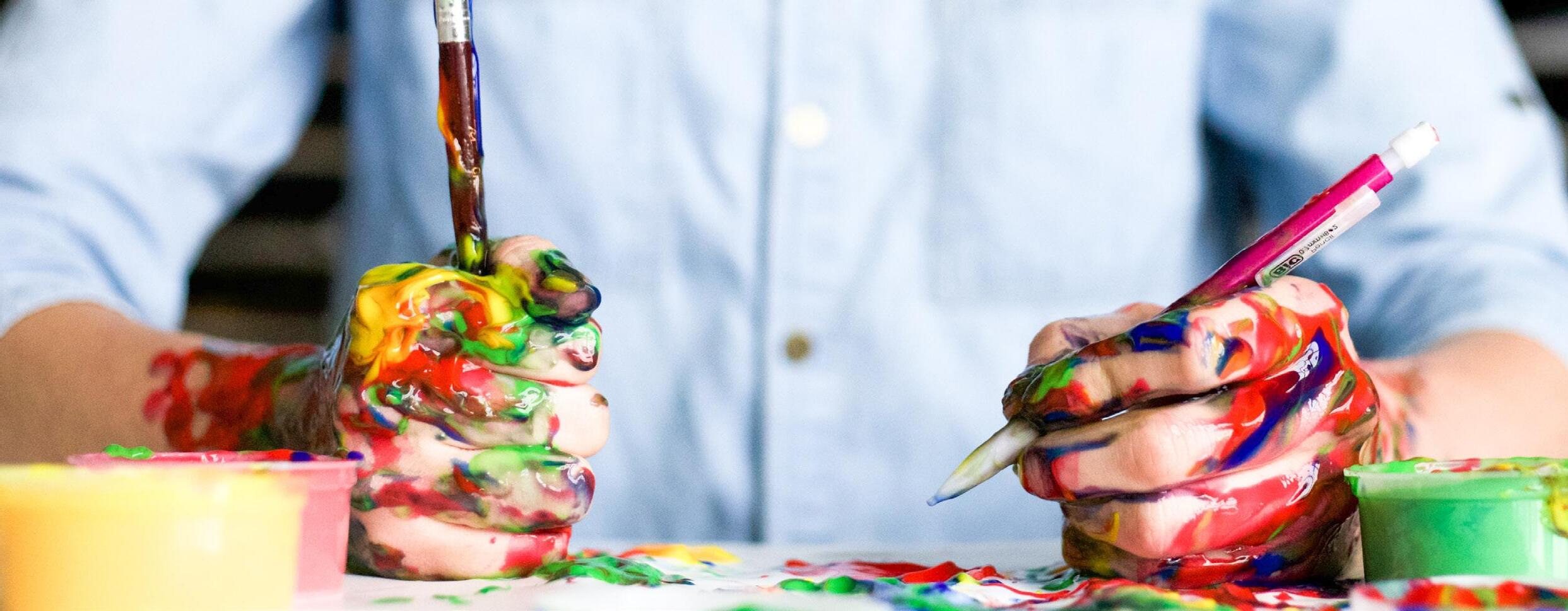

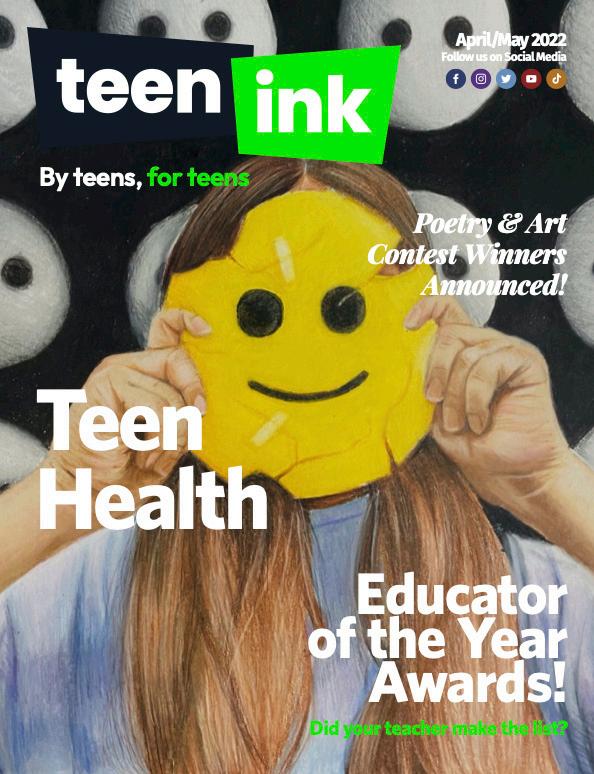

There was a fine line between religion and science, between exploration and faith, and I danced that line like a tightrope walker suspended in a circus tent. Daughter of a chemist, daughter of a dead man, daughter of god.
It was almost too many contradictions for such a small child, juxtaposition waging a civil war in my soul.
The preachers and the teachers taught me hymns of the miracles of god, of angels with wings of purity, and of a man who was a god and was nailed down with his arms wide to take all of our sins onto himself.
The professors and my mothers’ students taught me words from the dictionary and their definitions,
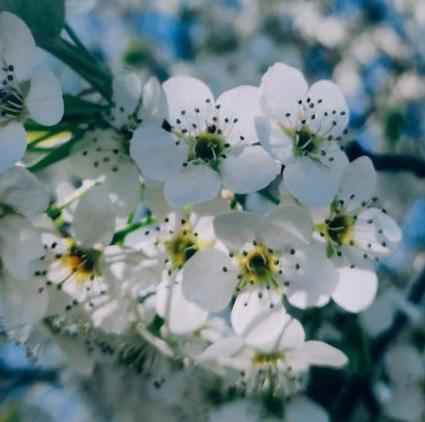
of a table that was a list of everything the world around me was made of, and of the laws and rules that defined every spark of energy and pull of gravity in the universe.
My knees knew the feeling of wooden church pews, and my hands knew the brickwork patterns of college walls, my mouth was familiar with the taste of communion wine, and in my ears the scratching of dozens of pencils sounded like a symphony of belonging, and my eyes were turned towards the stars, knowing they were all consuming spheres of plasma but wishing upon them with a blind faith anyway.
But despite adoring both the lord and the science of the world, it seemed as if no one understood
the way they wove together in seamless harmony, the way they complemented each other in complete sync with one another, the way they came together and made such integral parts of me. The knots that tied the threads of religion and science together were only visible to me, and despite my efforts to explain, no one else could understand.
And I was a scientist, and I was a believer, and physics were a blessing from God, and miracles were the result of chemistry, and I was myth and fact and testing and trusting and prayer and action and everything and nothing all at once. I was at one with every other being in the universe, and I was completely alone.
“My knees knew the feeling of wooden church pews and my hands knew the brickwork patterns of college walls”ARTICLE BY ANONYMOUS
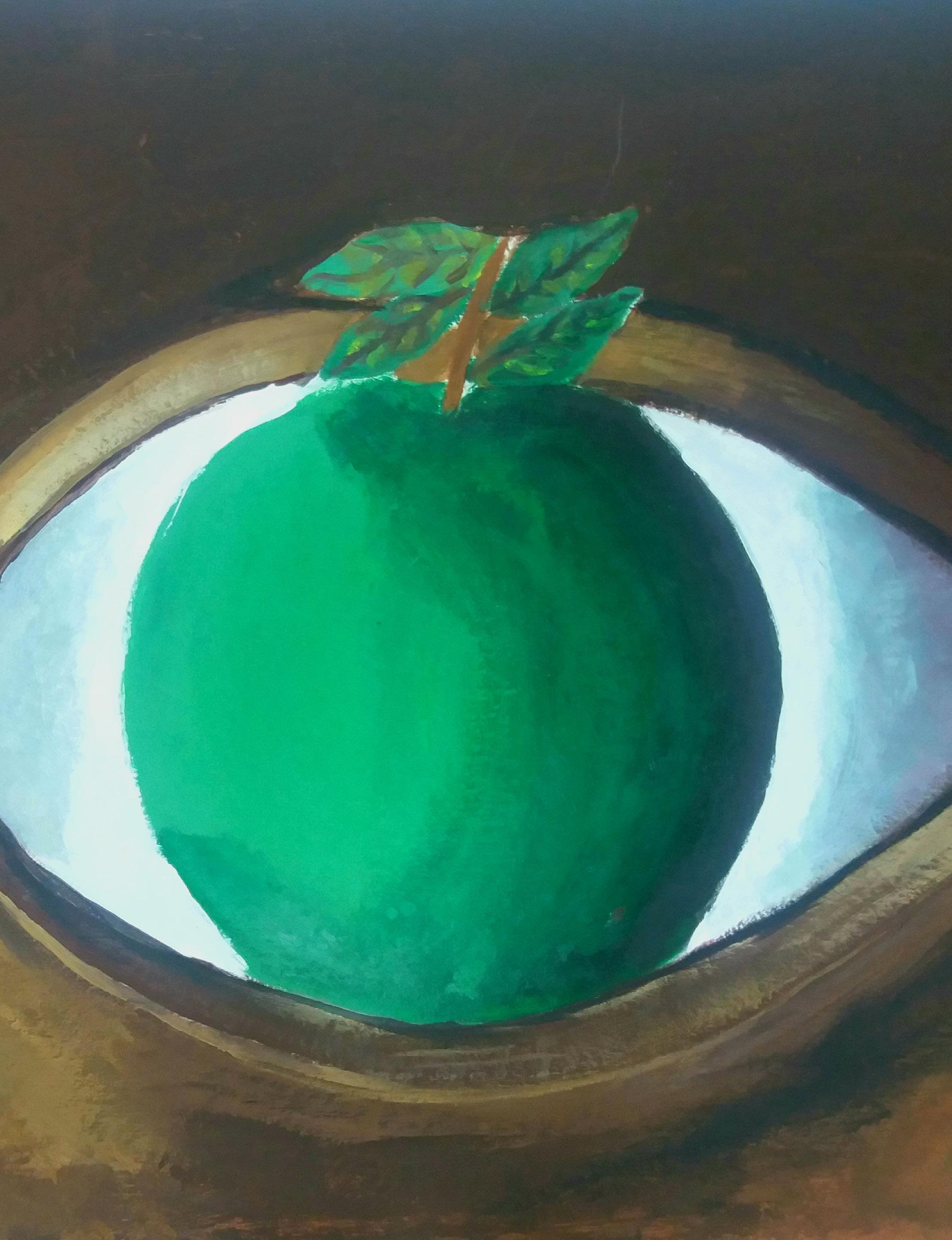 ARTWORK BY TEA PAVLI, TIRANA, ALBANIA
ARTWORK BY TEA PAVLI, TIRANA, ALBANIA
The raw, green, rotten, reeking, rancid, putrid odor radiates into my nostrils still to this day. Brussels sprouts were the death of me. The sheer presence of brussels sprouts would cause my parents and me to be fighting at each and every meal. I dreaded dinner time each night. I would go to any lengths to avoid being among those disgusting, filthy-looking green sprouts.
It started with arguments in my home because my parents did not believe my aversion. They believed that my hatred of brussels sprouts was purely psychological and had nothing to do with my senses. This problem was not something my parents could simply solve, despite the fact that it was partially a psychological issue, and there was no magic potion that may make the taste more appealing.
It didn’t help that it was one of my family’s favorite dishes. Therefore, they were willing to exert all effort possible to satisfy my taste in brussels. My family prepared them in various ways, including roasting, broiling, air frying, and even grilling. It reached the point that I would throw up every time I tried those sickening brussels. Evidently, I was not being heard by my parents. They failed to grasp the simple reality that I didn’t like even the smell of the deep, repellent, distinct thick layers of leaves. Every night, I would argue with them, pleading with them to stop trying to force me to eat those vile, decayinglooking greens. I repeatedly heard, “you eat like a preschooler” and “you are too old to be eating this way.” The situation deteriorated to the point that we had to inform the doctor about my “poor eating habits,” as my mom loved to remark every time we went in for my yearly check-up.
The doctor used to tell me, “just take three large bites; that’s all your mom is asking for.” It was always something with me and my eating habits. Either I wasn’t eating enough vegetables, or I was consuming too much junk. After three painful years of going to the doctor, my mom threatened to take
me to a nutritionist or a food therapist. Despite any attempts to change me, my dislike of brussels sprouts would not disappear from my mind. While I was eating, I felt pressured. I was being forced to eat food that made me heave. “How
commented, “You can either love them or hate them; that is simply how your taste buds operate,” in reference to brussels sprouts. She then went on to show my mom and me articles about this being scientifically proven. My mom’s little smirk, as she looked at me, confirmed that this was one of my greatest moments in life. I had been waiting for my entire life for news like this. Although my mom and I had no idea if the scientific study was true, nevertheless, it allowed us to back off of our stance in the brussels sprout war.
could life be so unfair?” My parents cruelly examined me at the kitchen table to ensure I finished every last bite and didn’t throw anything away or down the drain.
Occasionally, I would spend hours staring blankly at my disgusting dish of discolored coatings of cabbage. These were the evenings I was most fearsome of. If only there were a way out, I would not have to live this way.
And I think I would have had to live that way forever, if Katie, our unforeseen hairdresser hero, hadn’t become an unexpected mediator for our family standoff. One day at Katie’s salon, I waited for her to arrive at her station while sitting in my comfortable leather chair that swivelled. Since Katie and I like conversing, she switched the blow dryer on and off so I could hear her. On the day I arrived, I had just had one of my “rough nights.” I started telling her about it while I sat next to my mom, irritated that I was resurfacing the argument.
Katie then was doing my mom’s hair while she was telling us about an article she had just read. Katie
I am still a picky eater, and learning about brussels sprouts was not a magic pill that changed my eating habits for life. It did allow me to move on and somehow allowed my mom to accept my picky eating habits, and to be more flexible and accommodating. She stopped forcing me to eat brussels sprouts, and I agreed to come up with a supplement. Seasonings became my best friend, and I agreed to try a few new vegetables (other than brussels sprouts, of course).
Recently, when my family was looking down at their plates, I slowly put a new, broiled, hunter green, crispy length in my mouth, and I am shocked to tell you I was not disappointed with the flavor. With a touch of Parmesan cheese, asparagus had been transformed from frightening to scrumptious. My parents froze, unable to pick anything up with their own forks because their side eyes were focused on me, my fork, and my asparagus. My family was keeping their mouths shut as I was filling mine. My gentle smile allowed them to look up from their plates without being worried I was going to complain.
We ate the rest of the meal in peace. “Pass the asparagus, please,” was all my parents needed to know that the brussels sprouts war had officially ended.
My doctor used to tell me, “Just take three large bites; that’s all your mom is asking for”ARTWORK BY MELE BARTON, RANCHO
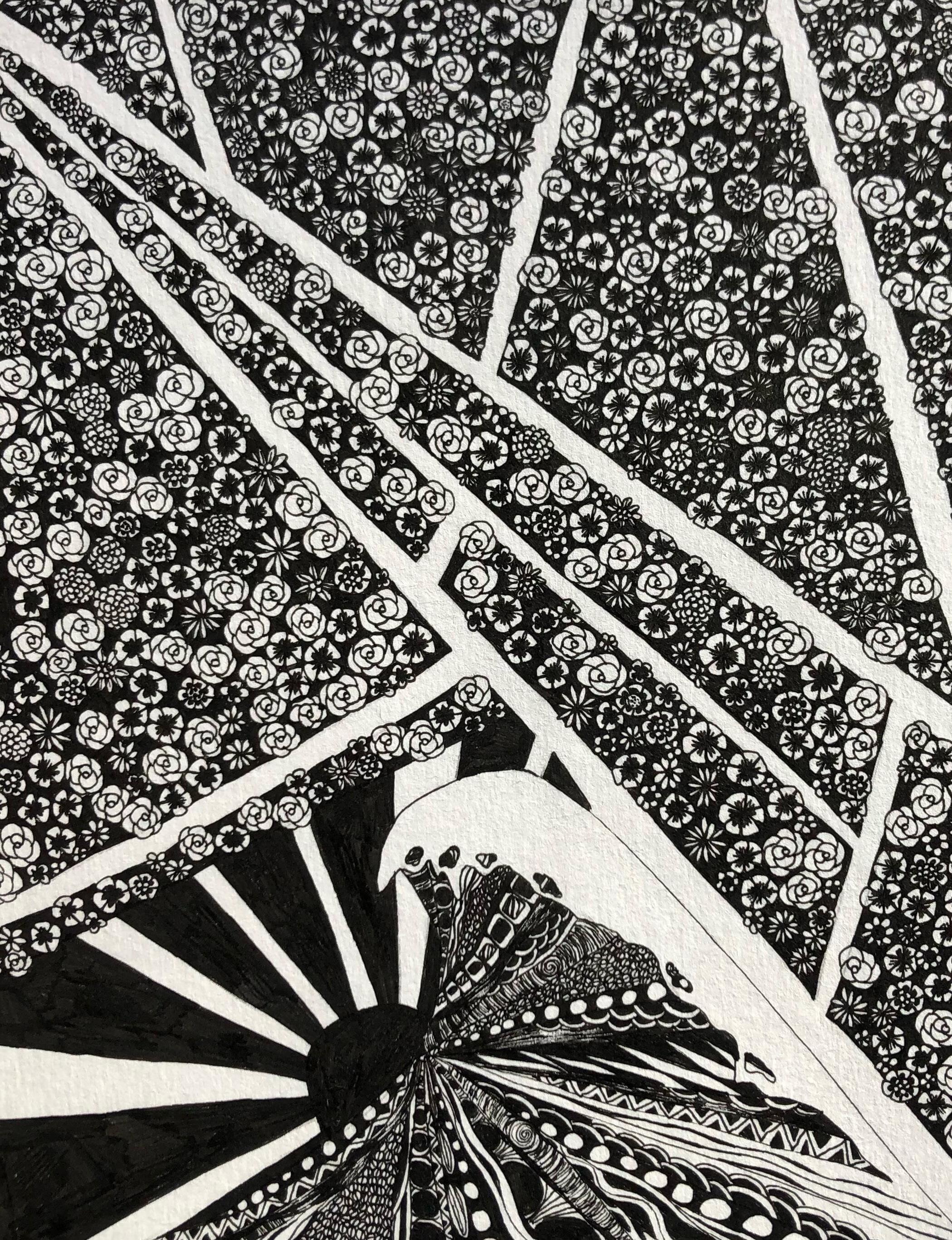
Listen. You’re going to go to sleep one night and wake up in a whirlwind of yourself. You’re going to find your tongue full of words, spilling, anxious, endless, and neither your brain nor your journals will be able to hold them all. You’re going to be awed at the thought of 13 and resolve to act like a woman from now on, but it won’t last a week. Before long, you’ll be forgetting this thing called womanhood that you can’t understand anyhow. Flinging garden hoses around, digging ponds in the backyard, making paper kites, tripping down cracked Saturday sidewalks on roller skates. And on and on it goes. The song will get soft and then swell until it hurts itself. Suddenly the hidden lyrics and unseen dimensions will rush out at you — all kinds of new shapes and colors and feelings burning in the sun on sleepy country roads.
Remember the never-growing-up mints you found in the white kitchen cabinet when you were seven? The smell of the daffodils by the rotting fence the year you said goodbye? The tiny metal box of mints felt like treasure, like Pippi Longstocking, like a miracle. The new house seemed like a miracle, too, when the mints were all gone. The basement was a fairy tale dungeon, and the attic was a magic portal waiting to be opened. Remember the stolen chocolate chips? Remember the plastic jets of birthday sprinkles you ate on the swings at the park? Remember the golden-brown glass bottles of vanilla and orange extract? When they were empty, you carried them around to smell the vanilla-and-orange smells. They were special, the most beautiful bottles in the world. You carried them in the orange purse with the worn-out credit cards and the tickets you made for a show that never happened. Remember the Barbie car your mother got from some lady’s
house? You rode around on it through the house until you were almost 12. You and your friend taped a lawn chair to a trash-picked skateboard and teetered down the sidewalk, invincible. You were gonna show it to the people at the fair! Remember the stuffed giraffe you whipped around on a string? Remember reading the Dr. Seuss Birthday Book and dreaming yourself half to death? Remember how you were going to make an amusement park for yourself?
Remember the whole cities you invented, squeezing all the people together in a row on paper? You once made a map of the universe on an eight-by-eleven sheet of typewriter paper with a tiny corner that said “out of the universe.”
Remember the smell of crayons and popcorn? Remember the popcorn-y smell of Mommy’s music? Mommy’s music will never be the same. Not without popcorn and size-six pink leggings on in front of the old big-screen computer. Not without the salt and the soaked pieces. Popcorn will never be the same. You don’t draw with crayons anymore. So crayons will never be the same.
It used to be there was always someone turning your bedtime storybook pages while you squirmed, interrupted, tried to look at the pictures. Huddled there in your Disney princess nightgown, the one that gets shorter and shorter on you. But now you put yourself to sleep alone and you read your own storybooks and somehow they aren’t the same now that it’s only your voice in your head, not hers. And the stuffed animals are just hunks of cloth, not picnic companions. It’s hard to believe everything was once so vivid. Everything used to talk to you. Now it’s different. You talk to everything, the night sky, the
“You’re going to find your tongue full of words, spilling, anxious, endless, and neither your brain nor your journals will be able to hold them all”
test pattern waves in the air, the radiator churning. Your heart talks and still it beats at the doors of you and can’t be killed. You were afraid of people coming inside at night, but now you know there isn’t anyone. No monsters, no demons.
It used to be there was always someone in the rooms next to yours, but now they’re empty and dark. Their stuff is gone with them to their new homes far away. It used to be there were three baby boxes in the basement, it used to be there were three children in the gold frames climbing the stairs. But now in the house there are the footsteps of one, a confused and lonely set of wandering echoes, a bouquet of echoes.
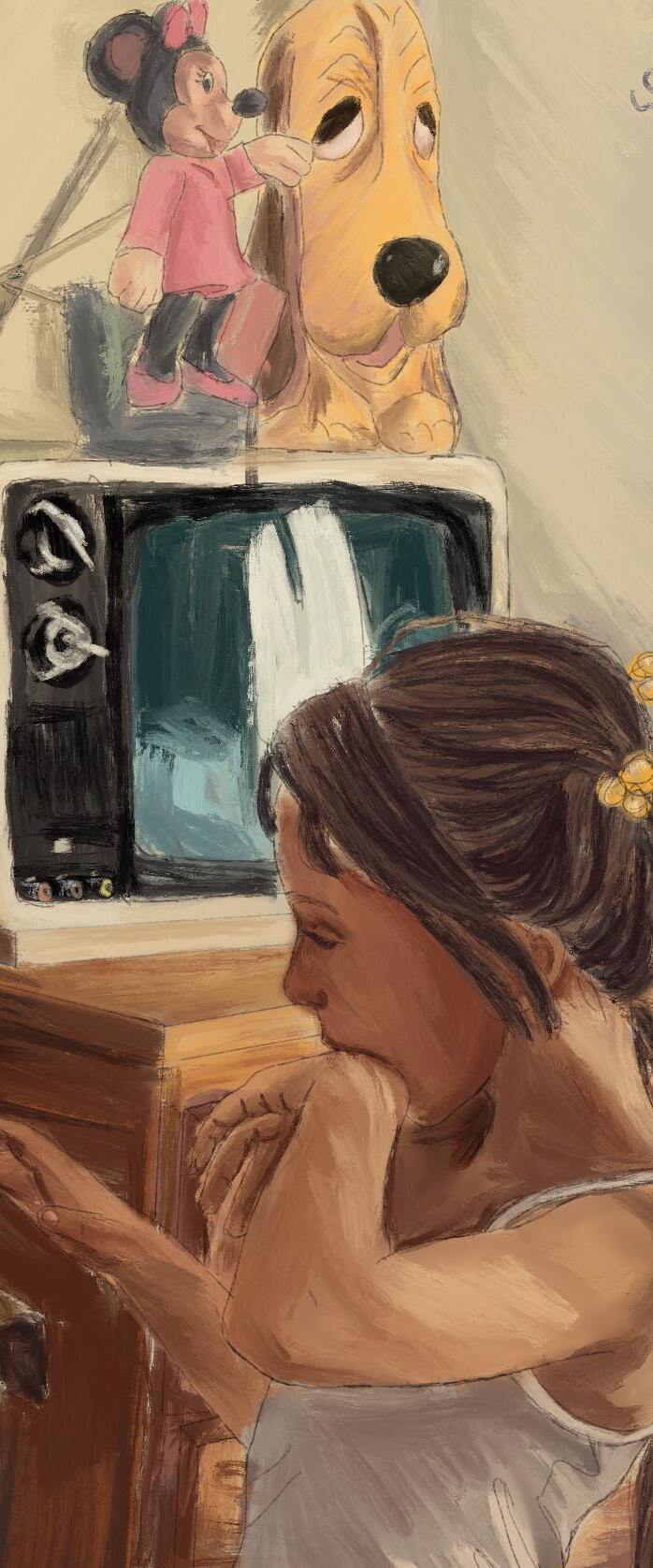
It used to be there was only God in the sky over the apple tree that grew sour apples. It used to be there was only way to believe. Now and now. Everything gets hurt and confused like crayons of hell breaking and scribbling in your eyes.
Days go by, turn to weeks, to months. Life will hurt you like those cold medicine pills you’ve never been able to swallow. Life will compress, spin faster, spin on the head of a pin. When you go back to your old ideas, you find them like someone who didn’t invent them. Old questions get tucked away in the back of your mind. Life is a seamstress tucking hems, trimming, scissoring, transforming, endlessly stitching. Sunsets don’t seem as bright. You forget the smell of your brother’s rusted bicycle collection on summer nights. You don’t contemplate microscopic families living inside acorn shells or leaves floating down the river. Clocks and vases and pink porcelain flowers you couldn’t touch, books you couldn’t read that always scared you as a child for some reason, these things aren’t mysterious any longer. The faces in the China hutch drawers disappear and your reflection isn’t all shoved down in the bottom of windows. Stars sort themselves out and the pages of your favorite books look old and shabby. It used to be that it would take a million glorious miles to get to the bottom of those pages, those light-filled stages. Scary movies will never be the same now that you can reach the light switch, now that you know about special effects, now that you’re not scared of the dark. You don’t breathlessly watch the feather-gray sky for traces of heart-shaped snow fields flying in early December. Christmas trees just come and go these days and toys don’t fascinate you. Scampering and spying and pretending and giggling aren’t cute anymore.
You just go on and on until you’re not even you anymore and you don’t even notice. Everything gets replaced by something new and strange.

ARTICLE BY OLIVER LAIRD, BOTHELL, WA
ARTWORK BY RUBY ZHU, SHANGHAI, CHINA
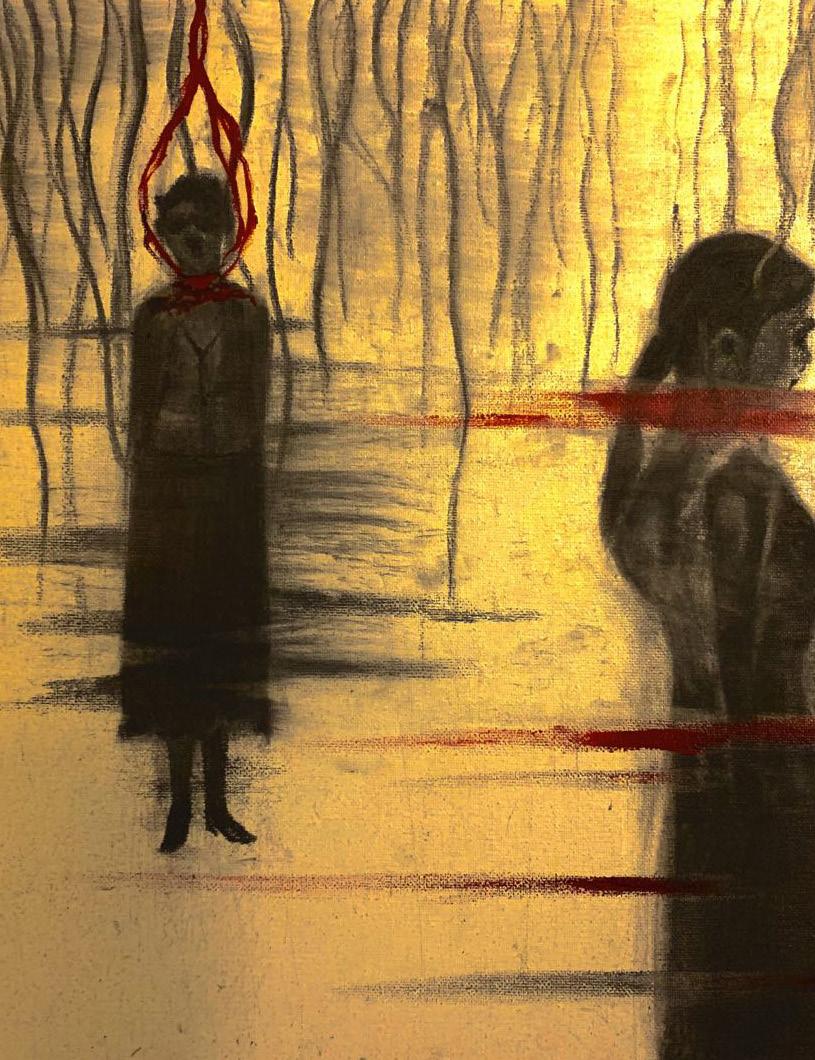
Two years spent waiting for the right opportunity, in a humid southern state. In a humid small town, In a humid black minivan With the sun glaring in from the windshield at us; Burning my thighs.
Parked at the K-12 school with rotting grass I spent less than a month at. The school that so quickly made me know who I was, By forcing me into someone I’m not.
That was when I told you. When I wasted every single ounce of selfconfidence I had, to tell you that “I don’t like who I am. I don’t like my body, And I don’t like how people see me.” Beating around it, I was too scared to say the word.
And what I got in return wasn’t what I needed.
I wonder what would’ve been different if I had said the word.
If I had stood up for myself. And if I hadn’t spent every night wallowing on how people would see me once I said it.
You said, “If you were like that, you’d hate yourself.
People like that aren’t like you. People like you wear dresses and makeup. People like you are safe. People like that, aren’t. You’re too young. And too dumb.”
While you’re right, “people like that” aren’t safe.
Not safe from the laws that claim to protect us.
Not safe from people. And not safe from the statistics that show how those people, and those laws cause over 40 percent of transgender youth to attempt suicide.
And eighty percent to consider it.
Almost a year later, I tell you again, On my uncomfortable mattress with the only light being from the twilight sun. I say the only thing I think you’ll hear. I tell you: “I’d rather have a short life and live how I want.
Over a long life of hating who I was.”
I tell you: “I’d rather die than be who you thought I’d be when I was born.
I know why now, Why you told me all of it on that humid afternoon. You didn’t know what to say. You were unprepared, And scared of the statistics.
Even now I feel terrified to say the word. Like only people who understand what it’s like, need to know this.
Even now I’m terrified of someone knowing. Like it’s some giant cliché secret and not people’s lives.
I know why you’re scared of the statistics, You’re a mother, you wanted to protect me. The last thing any parent wants is to hear their child has been killed. Whether by someone else, Or their own hand. For being trans.

“I wanted to speak up about issues trans people face through my own experiences. As a trans person, I hardly hear anyone talk about issues like the suicide statistics among transgender youth and how hard it can be hearing about all of these terrible things.”
A little girl, gap-toothed and vivacious, sits in a classroom. She is no older than eight, mind not yet plagued with impurity, still oblivious to the world. The girls of the class crowd together, giggling. She joins them.
They spoke of the grade’s boys — who was cute, who they liked. The word confused the girl. They said it with such a strange tone, plummeting her into unfamiliar territory. Where were the days when all they talked of were playground games?
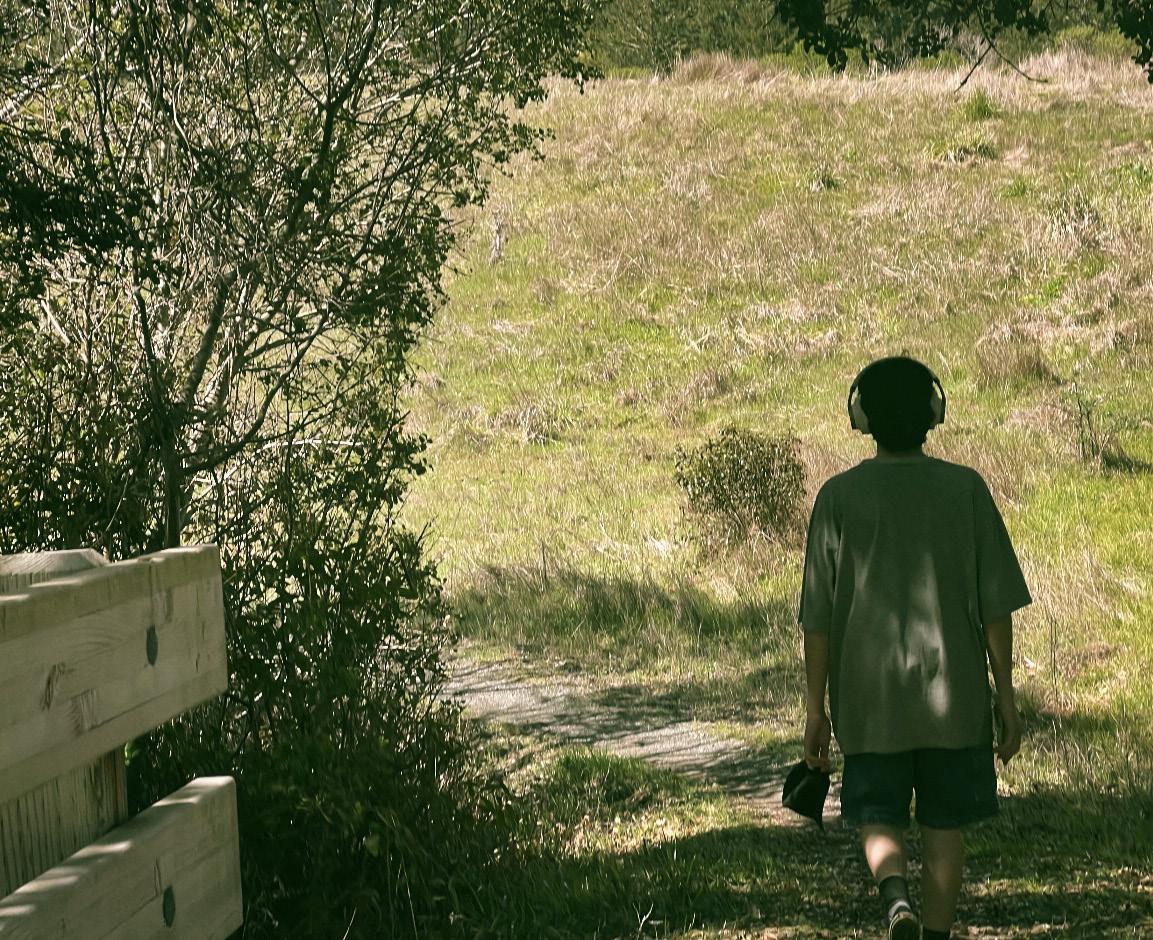
They asked her, “Who do you have a crush on?” She did not have an answer. She was not sure what that answer should be. Should she
feel something, like the rest said they did?
“Him.” She pointed to a blackhaired boy in the back of the class. She could tell he was somewhat conventionally attractive: He was thin and his hair was nice. The girls oohed and continued their conversations. The girl took her seat, unsure how to feel about the exchange.
Years passed. Gone were the times where all girls of the class were friends. Life became more complicated. And her understanding of crushes had not advanced since that thirdgrade day.
At 11, she learned where life was sourced: What adults did behind closed doors, while the children slept. She was disgusted, and wondered why anyone would ever want to do such a thing. “You’ll like it one day,” they said. “It’s a natural part of life,” she heard. It did not feel natural to her. Every time she looked at someone, the only thing she could think of was what they could have done before. Where their child had come from. She knew it was a thing of intimacy, a thing of love, but it still instilled a strange uneasiness in her.
She observed, and noticed that the world around her was so different than she had thought before. Turn on the radio, and all that could be
heard are songs of love, with undertones only recognized now. Every piece of media focused on romance. All the jokes made online and in school were inappropriate. The world was obsessed with love and sex. And she did not understand why.
She learned what was desired in women. Boys wanted large hips and chests, luscious lips. Layer upon layer of makeup. She wondered why they would care about such things. If he truly loved her, why would the size of her butt or the look of her face matter? She had never valued someone as a potential romantic partner based on their body, besides the basics of what she knew to be accepted as attractive.
She became a teenager, and her friends began to explore the world she feared. They gave themselves labels: hetero, lesbian. They told of their crushes. She smiled blankly and listened, too scared to ask for an elucidation.
The people around her, along with adopting new vocabulary, began to bring intimacy into conversations. Once while playing Categories (ironically, of course — they were too old and cool for a child’s game), the topic of boys to smash came up. The table erupted in laughter. The girl was glad she was not playing.
She wished she could understand this desire she had seen, heard, and read about thousands of times. Both sexual and romantic love confused her, though one she wished she could understand and possess.
She was in love with the idea of love. She enjoyed reading about innocent romance, or watching it on television. She wanted that special someone that so many talked about. The person who would walk with her through all her troubles. The one who would do anything for her, the one she would do anything for. The Orpheus to her Eurydice. Yet every time she tried to imagine herself being with anyone she knew or knew of, holding hands with anyone, kissing anyone, she could not. The image turned sour in her mind. She did not understand how she could admire love so much, but not like it for herself.
Many times before she had called an anxious attempt to make friends a crush. It was similar to the way a crush was supposed to feel, she thought. So it must be. The boys she felt this way about were thought to be so cool by her. She wanted validation from them. But, when she considered the idea of dating them in any way, her stomach turned unpleasantly. She wanted them as friends, and she knew this. Friends were few and far between for her, and making new ones felt like such an ordeal that she often mistook the natural awkwardness for romantic feelings. But the more she thought about it, the more she realized that she did not dwell on these people’s appearances, that they did not make her feel any different from how her other friends did, and that she didn’t want to do anything couple-y with them.
She wanted to know what she was doing wrong. Not wanting simple teenage romance? Impossible. The kids around her talked about crushes or sexualities. They seemed
to have it all figured out, while she was still drowning in a sea of unsureness, trying to determine if she had ever even had a real crush before.
On a late night, she decided to consult the internet for answers. She typed in the question that had haunted her for years. She pressed enter
Asexual. She stared at the word on her screen. Below it read Aromantic. She scrolled and read. Someone who did feel sexual or romantic attraction, or fell somewhere in between those two.
Part of her wanted to believe that this was who she is, to accept that she would never find herself in a relationship. Part of her was assured that she was too young, that this was just some made-up internet identity, and that feelings would come later. All of her wished to know for certain what she was, and now.
She was scared to say what she thought she was for fear of being wrong. She didn’t want to seem different from the others. She wanted the love shoved down her throat by the media. She wanted to be normal.
And who knows? Maybe soon, she would be this strange idea of “normal” that she so desperately wanted to be. She stared down at the book in her hands she had been reading. Philtatos, a character called the other. Most beloved
She sat, feeling isolated, impatient, and angry at the world, wanting to know if she would ever find her Philtatos
She did not understand how she could admire love so much, but not like it for herself
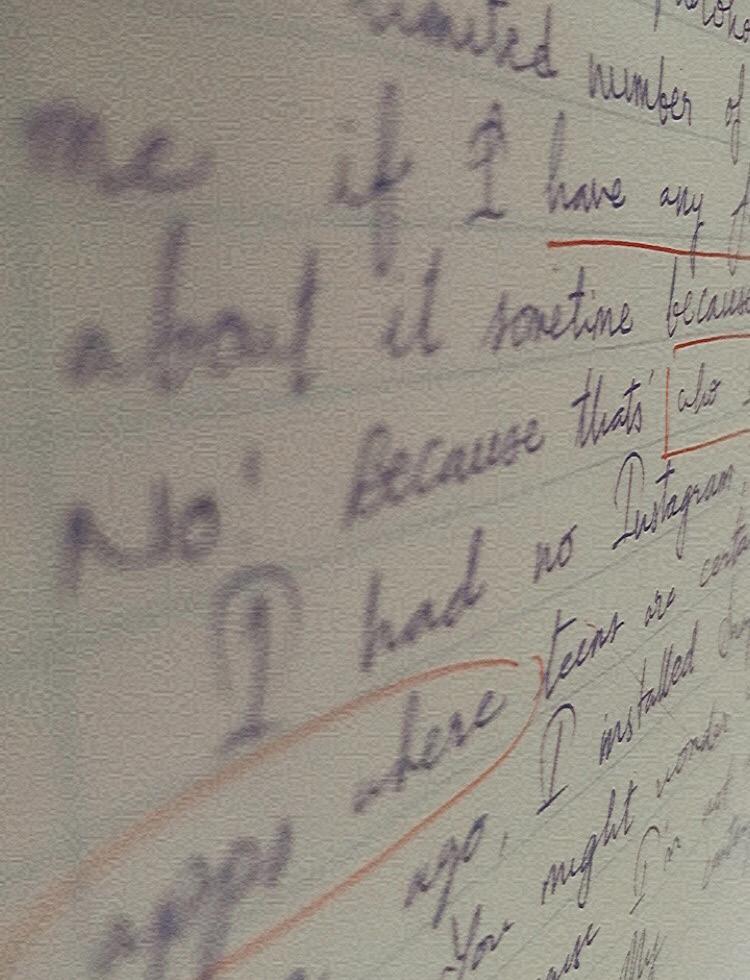 PHOTO BY MARIAN DE SILVA, GAMPAHA, SRI LANKA
PHOTO BY MARIAN DE SILVA, GAMPAHA, SRI LANKA
Pen to paper, sweating, stressing, pressing down the newly sharpened pencil so hard that I’m basically carving my words into this piece of notebook paper, with the edge still untorn. I am putting my entire heart into writing this letter, even though I know in the back of my mind that it’s going to go just as well as the last time. I have been putting off writing this out, because I knew that I would be too scared to even give it to him. This exact situation has happened so many times before, I finally tell the person I’ve had feelings for them, and they take it terribly. Trying to find anyone else here that is gay has been a struggle. It almost feels like an infinite barren desert populated only by me. Everyone says I should wait to find someone, make it more special, but seeing everyone around me finding someone makes me feel like I’m missing out, but finding anyone that I even have a chance with is basically hopeless. It’s basically a shot in the dark, an assumption at someone’s sexuality. Any time I try to make something work with someone, it never gets anywhere, because even if they are gay, I can’t blame them for not wanting to be open about it, it’s hard where we live. I finish my letter, and write “To: Someone I Know Won’t Love Me.”
I usually dread walking into this school. This wasteland of bright lights, neutral colors, the smell of a bunch of people who haven’t showered, and the sounds of people talking. I walk the crowded hallways in fear, I never feel safe for a second in this school. It always feels like everyone is watching, judging, like a million tiny daggers are jabbing me all over my body. I’m always just waiting for someone to say something offensive or do something to show that people like me aren’t welcome. This isn’t a usual time though, as I’m here after hours for a driver’s education class. The hallways, usually full of life, are now empty and quiet. The bright lights usually shining down are turned off. It always gives me a weird feeling when I walk in here, like something isn’t right. I am holding the letter, one side is dented from my hand gripping intensely onto it, knowing that letting it go could kill a part of me. The warm sweat on my palm is soaking into the envelope, causing some of the writing
on the outside to fade, making it barely legible. The cold, dead hands of fear just waiting to consume me like quicksand, ready to keep me rooted in place and prevent me from even trying to deliver this letter. I walk into my class, and I see him. Soft dirty blonde hair, deep brown eyes that I could stare into for hours, and nice pale skin. Standing at around 6’ tall, he has a light gray jacket and light blue jeans. He’s pretty quiet and reserved, but his smile could light up an entire room.
Immediately, a strong wave of fear and anxiety washes over me, almost pushing me out of the room and out of the situation. After making eye contact with him, I feel paralyzed, like I can’t do what I set out to do any more. I can feel the tight, cold grip of fear pulling me into the ground, trying to swallow me whole. The memories of my past experiences flood my brain, overwhelming me. I start to ask myself what the point is, and why I’m even still trying after this long. At the same time, I know that this is the last chance I’m going to have to talk to him, since the class ends after today. I sit down in my usual spot at the back of the class, unsure of how I am supposed to focus myself and take my test with everything taking over my mind like a plague. I spend the entire time taking my test trying to figure out how to approach him. Before I know it, the class is done, and we are leaving. I notice he’s sitting outside, I assume he’s waiting for his ride. I sit in my car, letter to my side, debating to myself whether I should finally approach him. I sat there for a good while, until I watched him leave. My chance was over. I was so frustrated with myself for not taking the chance, the chance that could have been different, but the chance I was too afraid to take.
I constantly carry the fear of judgment of others, which prevents me from living my life. I also carry the words I want to say to the people I have feelings for, but am held back from saying by that fear of judgment. It has been hard for me, especially recently trying to find someone, and these negative experiences are stuck on repeat in my head while I have these thoughts. I constantly analyze these situations and think about the things I could have done differently.
EVERYONE SAYS I SHOULD WAIT TO FIND SOMEONE, MAKE IT MORE SPECIAL, BUT SEEING EVERYONE AROUND ME FINDING SOMEONE MAKES ME FEEL LIKE I’M MISSING OUT

In late 2022, an artificial intelligence language model reached an unprecedented level of accuracy. ChatGPT (“generative pre-trained transformer”), a newly launched chatbot developed by OpenAI, can give you sophisticated responses to virtually every question. It has provided humans a revolutionary way to collaborate with AI. If you want, you could even try to teach ChatGPT about cannibalism.
ChatGPT is trained from a massive dataset, and it forms connections just like a human brain. In fact, it was modeled after a human brain. In an article for Zapier, Harry Guinness writes, “This humongous dataset was used to form a deep learning neural network [...] modeled after the human brain — which allowed ChatGPT to learn patterns and relationships in the text data.” It is trained to assign meaning to a string of words, and
also to predict what words, sentences, and even paragraphs could follow. It can also remember what the user had mentioned previously in the conversation, so it can answer questions in the context of what was discussed earlier. This training makes ChatGPT very powerful.
ChatGPT has a wide range of applications. Some examples include recipes, relationship advice, academic advice, code debugging, essay writing, problem-solving, marketing strategies, philosophical questions, and almost everything else. ChatGPT is really easy to talk to and it doesn’t judge you. It makes you feel comfortable and can help humans in many ways. Think about how much more efficient your life could be if instead of spending hours trying to debug code, you can do it in 10 seconds. You can copy and paste it into ChatGPT and it can help you troubleshoot and save lots of time. There are so many ways that ChatGPT can help humans save time, so if humans are saving time on things that don’t need much attention, then think about all the more productive things that humans can do with their time. Humans could be focusing on more significant issues like global warming, water contamination, disease control, etc.
Not only can you talk to the original ChatGPT, but the model for ChatGPT 3.0 is open to the public, and it can be modified to create other variations of ChatGPT that
can be directed toward a specific subject. WhatsApp used the model to develop a service called AI Buddy. AI Buddy is like your little AI friend that you can talk to whenever you want. Variations of GPT 3.0 are not as advanced as ChatGPT 3.5 or 4.0, but they’re still easy to use, and also very helpful.
The company that created ChatGPT, OpenAI, has another service, Dall-E2, that can create images from a prompt. For example, if you ask it to draw “a rabbit with a green bow tie,” it would generate a high-resolution image of a rabbit with a green bow tie. Not only can Dall-E2 create images from a prompt, but it can also modify pre-existing images. One main reason Dall-E2 is so engaging is that now, anybody can create astounding art in just a few seconds. While there could be potential legal issues, if Dall-E2 is used responsibly it is a great tool. Dall-E2 is not the only text-toimage service, but its capabilities are unparalleled by most.
ChatGPT represents a significant milestone in the development of AI, it can allow humans to optimize their skills through collaboration with machines, and we can now reach new levels of creativity, and clear up valuable time for humans to pursue more important matters. ChatGPT is a prominent example of technology at its finest and can paint a new style of life for humans, and can offer endless possibilities in the future.
It has provided humans a revolutionary way to collaborate with AI
Since the beginning of 2023, the Trans Legislation Tracker has reported that nearly 492 bills have been proposed in 47 states against the livelihoods, security, and existence of trans people. To put this into perspective, that is a 183-percent increase from the 174 anti-trans bills pushed in 2022, and we are only 98 days into 2023.
Now, pair this with the rise in aggressive anti-trans rhetoric from right-wing pundits on every corner of the internet, and we are left with a disturbing pattern. While the protections given to trans individuals decrease, the violence against them increases substantially, thus, leaving them in a state of physical and mental insecurity. Groups like the Trevor Project
and the Human Rights Campaign report that this decline in security ends up manifesting as increased consideration of suicide among trans youth, increased symptoms of anxiety and depression, and worst of all, increased violence perpetrated against transgender people.
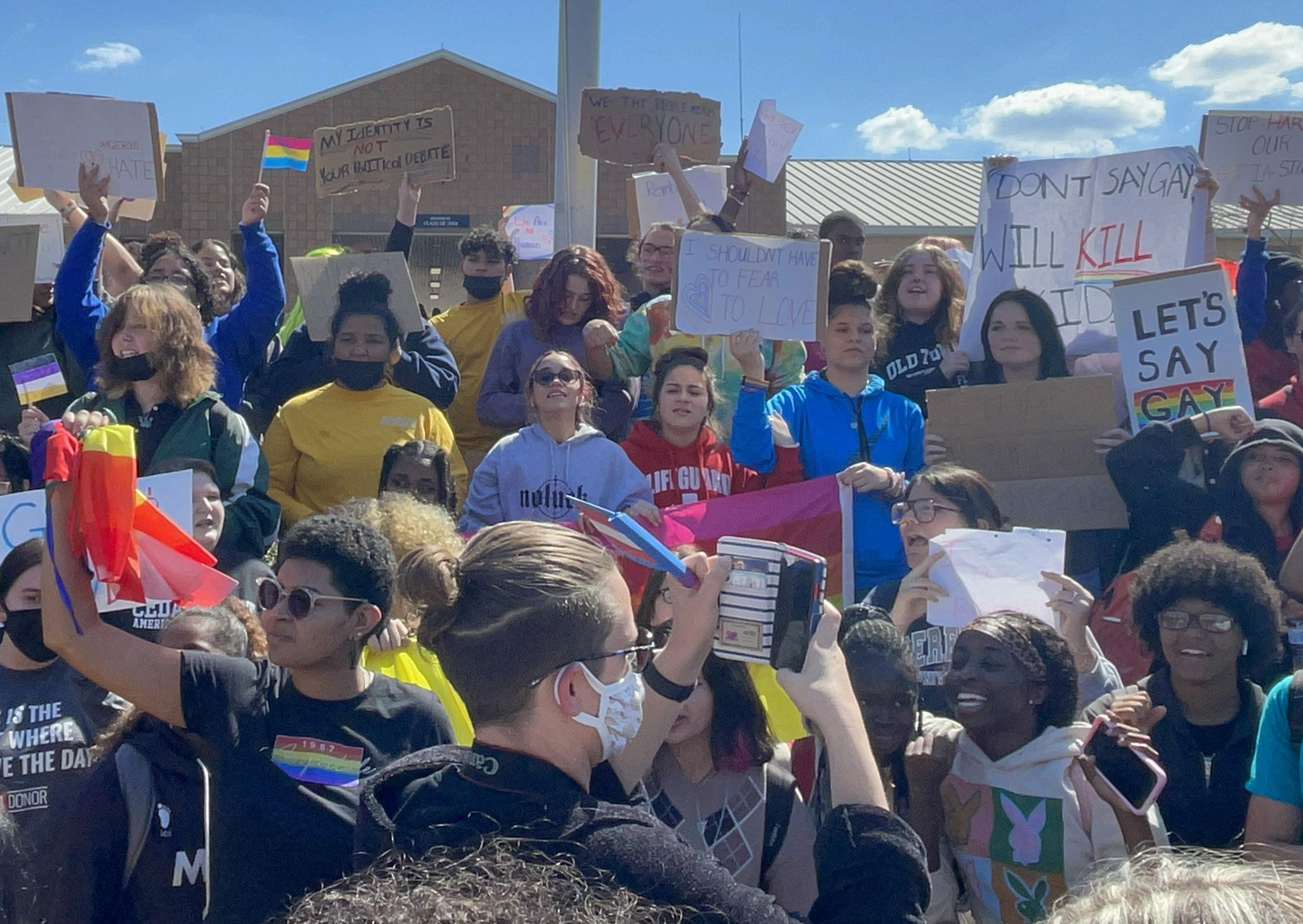
While the protections given to trans individuals decrease, the violence against them increases substantially, thus, leaving them in a state of physical and mental insecurity
The rise in anti-trans violence is saddening, infuriating, and terrifying. Therefore, it is imperative that we combat it in any way possible. This includes pushing Democrats away from inaction, urging lawmakers to vote against anti-trans bills, and supporting LGBTQ+ groups that help provide resources to trans people across the U.S. With all this, there is one particular anti-LGBTQ+ loophole that must have immediate action taken against it.
Known as the “LGBTQ+ panic defense,” this loophole is a legal strategy that allows one’s sexual or gender identity to be used as justification against them in regard to a hate crime or homicide. Specifically, it argues that the victim’s sexuality or gender identity created panic in the suspect, which led them to harm or kill. From there, it falls into two main categories. Either the victim made sexual or romantic encounters, which led to the suspect committing violence against them, or the victim’s sexuality and gender identity led to the suspect using violence as means of self-defense. Although on its own it is merely a weak excuse, when it is used to uphold other arguments and defenses it has had success. As the LGBTQ+ Bar reports, one famous example of the LGBTQ+ panic defense in use is in the case of Matthew Shepard, a young, gay college student who was beaten, tortured, and killed in 1998. The men who brutally beat him to death tried to use his sexuality to justify their actions. Since then, this defense has been used numerous times to reduce the punishment that various perpetrators of hate crimes receive. Out magazine reports that it was used as recently as 2020 in Tennessee to justify the killing of a gay firefighter, Mack Bond, after he made non-violent sexual advances on a couple.
While some may attempt to excuse the violence in cases where the victim had made sexual advances,
issues arise when we understand the way the defense strategy misrepresents victims’ actions. For example, in the Tennessee case, the couple shot Mack after he made sexual advances. However, these advances are explained by the fact that they were parked next to Mack in a well-known “gay cruising area,” which are places where gay people have historically searched or “cruised” for sexual partners and encounters. However, the manipulation of the truth doesn’t stop there — other cases have demonstrated that sometimes sexual advances are fabricated to be used as justification for violence.
Luckily, the LGBTQ+ Bar explains that 17 states have banned the use
that are yet to do the bare minimum and take action against this loophole, in order to protect LGBTQ+ citizens.
If you live in any of the 33 states where the LGBTQ+ panic defense strategy isn’t completely banned, I urge you to take whatever action you can to stop excuses from being used to justify hate crimes against the LGBTQ+ community. This can include calling your local and state representatives to support bills against the defense strategy or take action against it; supporting groups like the LGBTQ+ Bar, which is working nationwide to take down this strategy; or aiding organizations that provide resources and support to LGBTQ+
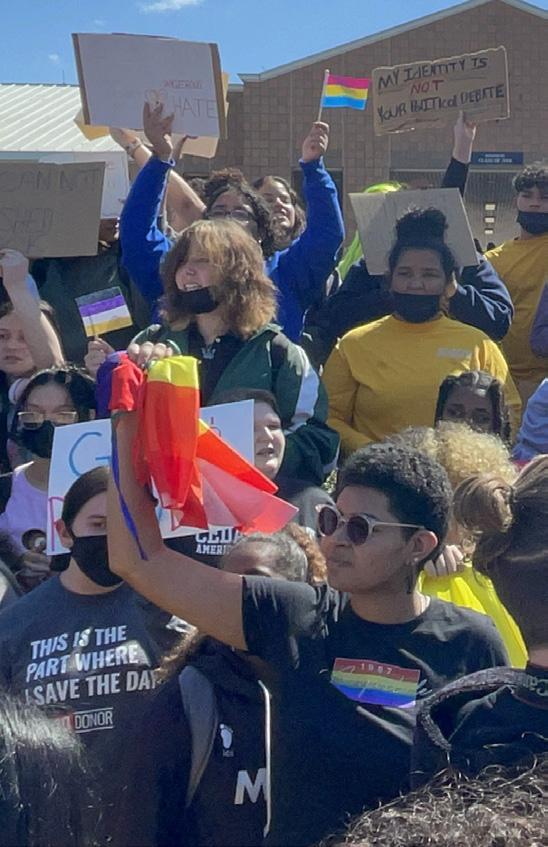
of the panic defense strategy, with New Mexico banning it most recently, in 2022. However, that leaves 33 states where LGBTQ+ people are left vulnerable to having their sexuality or gender identity weaponized against them. If you live in the states of Wisconsin, Texas, Nebraska, New Hampshire, Minnesota, Massachusetts, Pennsylvania, Michigan, North Carolina, Georgia, Arkansas, Iowa, or Florida, then bills against the panic defense strategy have been introduced, but require the support and urging of lawmakers in order to move further. This leaves 20 states
people, either locally or nationwide.
Nobody should have to live in the fear that their sexual or gender identity can be used as justification for their killing in this day and age. Although taking down the LGBTQ+ panic defense strategy won’t magically halt all violence against queer people, it is the first step in improving the livelihood and security of LGBTQ+ people in our country — especially in a time when their existence is legally and politically under attack every single day.
KNOWN AS THE “LGBTQ+ PANIC DEFENSE,” THIS LOOPHOLE IS A LEGAL STRATEGY THAT ALLOWS ONE’S SEXUAL OR GENDER IDENTITY TO BE USED AS JUSTIFICATION AGAINST THEM IN REGARD TO A HATE CRIME OR HOMICIDE
In recent years, the social media app TikTok has skyrocketed in popularity. From its origin (branching from its parent app Musical.ly) in 2017 to now, the app has amassed over one billion users located in over 150 countries. It’s no wonder either — the app is made to be addicting. Each user curates their own personalized feed with the help of an algorithm that caters to their interests. Videos typically last for less than a minute, making it easy to get lost in a state of mindless scrolling. On the surface, TikTok is just another addition to an ever-growing group of popular
administration voiced its interest in banning it. In an executive order issued on Aug. 6, 2020, President Donald Trump stated that “the spread in the United States of mobile applications developed and owned by companies in the People’s Republic of China (China) continues to threaten the national security, foreign policy, and economy of the United States.” Yet, any of their attempts failed to pass, as U.S. judges raised concerns about freedom of speech and a lack of evidence.
Recently, Shou Zi Chew, chief executive of TikTok, was questioned about the app during a House Energy and Commerce Committee hearing in Congress. The main points of contention were its security and safety.
complete this year. When that is done, all protected U.S. data will be under the protection of U.S. law, and under the control of the U.S.-led security team. This eliminates the concern that some of you have shared with me: that TikTok user data is subject to Chinese law.” This quote, however, is a bit concerning, as one has to wonder why the company had access to the aforementioned data in the first place.
platforms. However, recent action suggests that the app is more threatening than it seems, and potentially, worthy of a national ban.
Alarm surrounding the app started to rise in 2020, when the Trump
Committee Chair Cathy McMorris Rodgers (R-Wa.) opened her case, stating that “TikTok collects nearly every data point imaginable — from people’s location to what they type and copy, who they talk to, biometric data, and more.” After elaborating on the additional ways the app follows its users, she concluded, “TikTok has repeatedly chosen the path for more control, more surveillance, and more manipulation. Your platform should be banned.”
The TikTok CEO responded by describing the company’s plan for reducing the amount of data collection. He stated, “We’re deleting [the data sitting in our service] and we expect that to be
The lawmakers also pressed Chew on the app’s involvement in mental health issues, especially in young adults on the app. One first asked what the required age was to be on the app, to which Chew responded that it was 13. With that established, many others began to speak on the censorship flaws in the app, claiming that users can fall victim to viewing videos showcasing self-harm and eating disorder content. They also credited a variety of different dangerous challenges that circulate on the app. Chew, as a response, stressed the action that is taken to restrict the amount of videos that violate the community guidelines.
Despite the serious subject matter of the hearing, the Congress meeting has been viewed online mostly as a joke. Many of the clips that have gone viral online encapsulate the energy of the long-winded trial, and shed some light on a tough subject.
A few personal favorite quotes from the trial include: “Does TikTok
RECENT ACTION SUGGESTS THAT THE APP IS MORE THREATENING THAN IT SEEMS, AND POTENTIALLY, WORTHY OF A NATIONAL BAN
access the home Wi-Fi network?” and “Does TikTok support good — yes or no?” Additionally, a story involving two journalists whose data was, without consent, accessed by TikTok was brought up during the trial. When asked about the company’s methods of gathering the information, Chew deadpanned: “I disagree with the characterization that it was ‘spying.’”
The biggest criticism and meme to emerge from the hearing was a video that was shown as “evidence” against the app. In an attempt to show the company’s failure to keep its users safe, a TikTok video was shown on screen that depicted an animation of a gun being fired, with the caption “Me asf at the House Energy and Commerce Committee on 3/23/2023.” The video, meant to be humorous, only had 475 likes at the time of showing, meaning that the woman had to search up videos under the hashtag #CathyMcMorrisRodgers to find a video that seemed threatening enough to present in trial. After the video played, she exclaimed, “You expect us to believe that you are capable of maintaining the data security, privacy and security of 150 million Americans, where you can’t even protect the people in this room.” The video of the court looking at the big screen has now transformed into a meme template, with people cropping their own TikToks over the real one.
The mixture of confusion, chaos, and utter ridiculousness that occurred in the trial made it seem like, in the words of user @nelsonvazquez666 on TikTok, “a complete joke.” Yet, humor aside, a trial of this magnitude may foreshadow the future of the company. So far, the app has been banned in Montana, along with many different colleges and universities. If this pattern continues, who knows what might be in store for the widely popular app in a few years’ time.
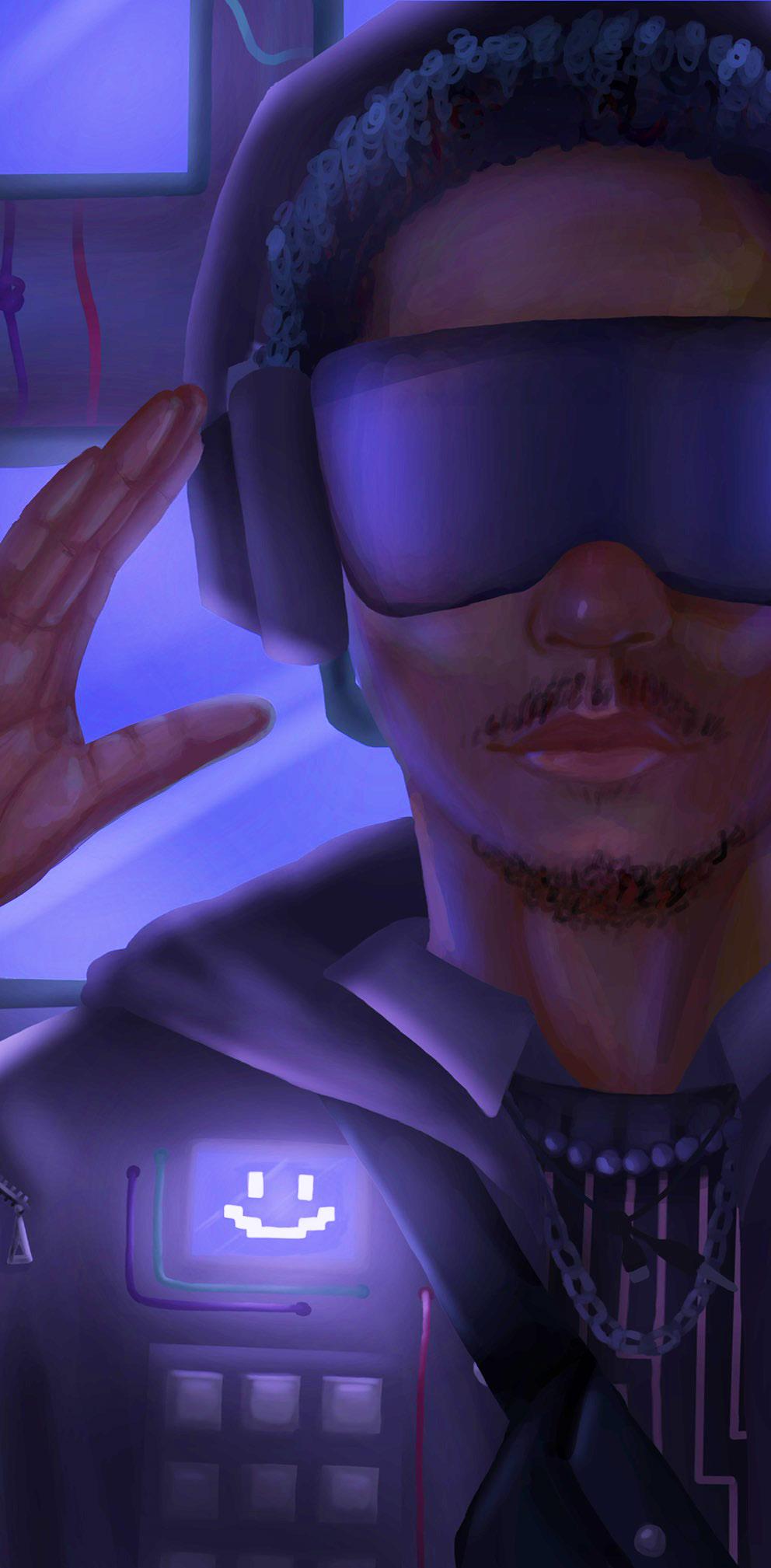
Despite the serious subject matter of the hearing, the Congress meeting has been viewed online mostly as a joke
LEA sits on a train next to JANET, an old woman. The moment the curtain opens, their conversation begins. The lights show the moving train. The train is moving along the Manhattan Bridge. It is dark out, and the city lights are visible. All actors are on stage, playing various random characters sitting on the subway. Named characters sit facing the audience, unnamed characters sit masked and with their backs to the audience. Right now there are three unnamed characters on stage. LEA holds the book Dead Souls in her hand.
JANET
It’s just worth thinking about, you know, the cyclic. Everything that begins comes back around and back around one more.
LEA nods, confused.
JANET
Where did you say you’re going again?
LEA
Oh, American Apparel. It’s a clothing store. I need some new shirts and… stuff.
JANET
I don’t see why, your shirt is fine. People your age are always in search of new things. New shirts, new feelings, new people, new lives?
LEA
Sorry.
LEA
JANET
It’s quite alright, everyone makes mistakes.
LEA
Look! We’re on the bridge. The sky looks beautiful today.
LEA points at the sky and JANET watches in silence for a moment.
JANET
It is beautiful. The city looks so far away.
LEA
Yeah. It makes me feel so removed from it, as if I don’t live there and I never have at all.
JANET
It’s unbelievable how fast trains move.
LEA
It is. And how they can go underground and below the water and above it all. Wouldn’t it be nice if all trains ran in the sky?
JANET
It’s a nice thought to think we’re in the sky.
LEA
JANET nods and they sit in silence for a moment.
LEA
Sorry. I feel like I’m falling asleep.
JANET
That’s ok honey, it’s normal.
She continues trying to keep her eyes open.
JANET
Say, where did you say you’re going again?
LEA
A Bad Bunny concert. With my friends.
JANET
Really?
LEA
Or maybe… a classical music concert. I can’t really remember.
JANET
That’s OK, you can sleep.
LEA falls asleep on the subway. The subway stops and the doors open. JANET quietly gets off of the train.

This is Canal Street. The next stop is Union Square-14th Street. Take care of the closing doors, please.
New lives?
JANET
Oh don’t misquote me girl.
It is.
They both sit in silence for a moment. LEA begins to doze off and sits up abruptly.
LEA
Upstate all of the waters are frozen over and you can ice skate on them. I went ice skating with my sister.
The subway doors close. The lights move to show the subway moving. The sound of a heartbeat is very faint in the background. The sound of the moving subway can be heard. LEA remains asleep. One by one, all the other people on the subway car get off.
PHOTO BY XXXGOD/SUBWAY INTERCOM
This is 34th Street-Herald Square. The next stop is Times Square-42nd Street. Take care of the closing doors, please.
PERFORMANCE GUY gets on the (now empty) subway car. He sets his speaker, playing loud music (a shortened version of pump up the jam), on the ground and stands up tall.
Helloooo ladies and gentlemen! I’m gonna give you a great show today.
The music starts to play and PERFORMER begins to dance, putting his all into it. When the words in the song finally finish he takes off his hat, walking around with it as if waiting for people to drop money into it except there is no one there. He moves past LEA as he does with every other subway seat, not acknowledging that she is the only one there.
A dollar, a nickel, a dime, anything you have would make my day ladies and gentlemen. I hope you all liked the show, if you have nothing that’s ok. God bless you.
The train doors open and PERFORMER leaves the train car.
GOD/SUBWAY INTERCOM
This is Times Square-42nd Street. The next stop is 57th Street-Seventh Avenue. Take care of the closing doors, please.
LEA (to herself)
What was that?
GOD/SUBWAY INTERCOM
This is 57th Street-Seventh Avenue. The next stop is Lexington Avenue63rd Street. Take care of the closing doors, please.
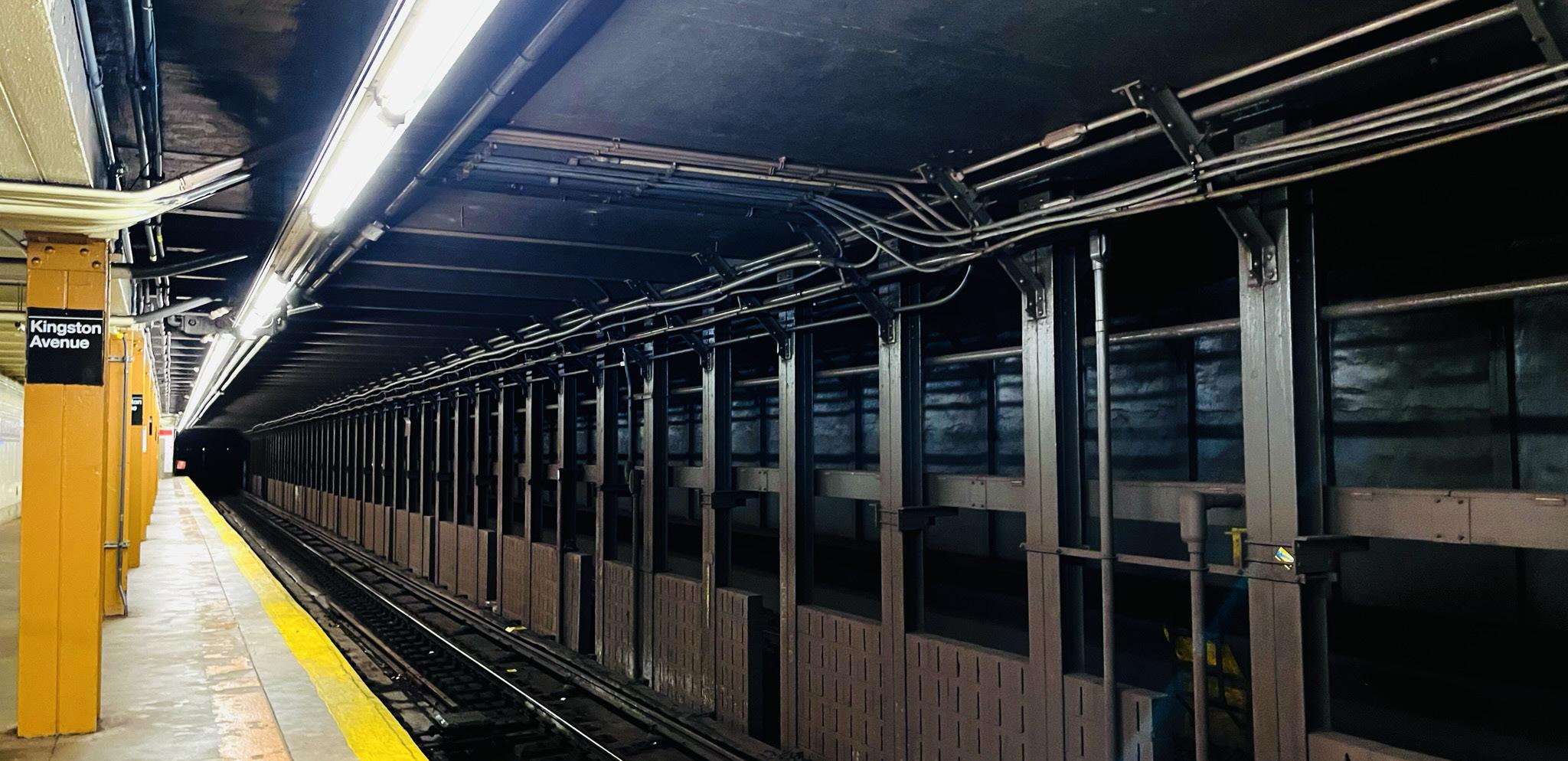
MONEY GUY walks onto the train car.
MONEY GUY
Anyone got a dollar? Just a dollar, a quarter, anything you have. Thank you, thank you.
MONEY GUY walks down the train car waving his hat back and forth rapidly. LEA takes out a dollar to give to him but he doesn’t even acknowledge her and is moving the hat back and forth too fast for her to put any money in it.
LEA
Take care of the closing doors, please.
LEA
Do you know if that man was ok? It was like he didn’t even realize I was there.
GOD
People get stuck in their routines. If you do something enough you begin to do it everyday, regardless of who is there to watch. He walked around asking enough, that now he does it every day without stopping.
LEA
Oh.
GOD
Where do you find yourself headed on this fine day?
LEA
Just to Duane Reade. I need to pick up some things. Pens, notebooks, stuff for second semester.
GOD
Excuse me!
MONEY GUY leaves the train without acknowledging LEA. GOD gets on and sits next to her.
GOD/SUBWAY INTERCOM
This is Lexington Avenue-63rd Street. The next stop is 72nd Street.
Fascinating! I’m headed to meet some friends just east of Central Park.
LEA
Wait, I’m sorry, have we met before?
GOD
Oh not really. I’m God.
GOD holds out his hand for LEA to shake. They do.
LEA
Huh. That’s a fun name.
GOD
It is. Do you believe in god?
LEA
No. No offense of course, Mr. God.
GOD
Oh, none taken. I find it fascinating the way that people find their own beliefs in this life. I think everyone is entitled to shape the world as they see fit. Tell me, do you believe in any sort of higher power?
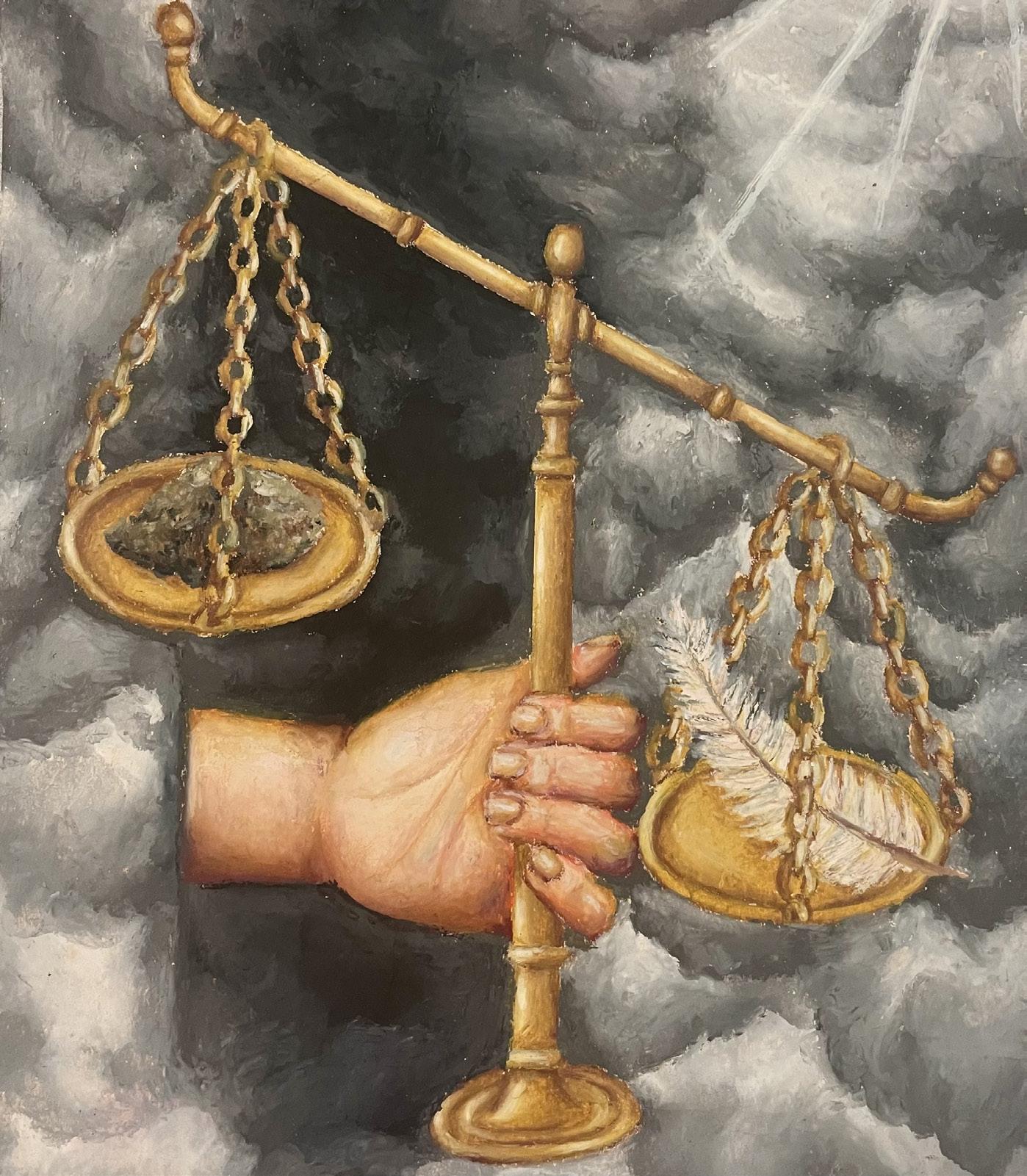
LEA
That’s a bit of an invasive question.
GOD
Sorry. Can’t help myself sometimes, you know.
LEA
That’s OK. Um well I’m not sure. I want to think that there’s more to the world than the mundane day-to-day but I don’t know. I kind of feel like if there isn’t more than what I know right now, then isn’t life a little meaningless? At least people who believe in God believe they have a purpose?
GOD
Do you have a purpose?
LEA
No. I’m just a typical, aimless high school student.
GOD
You seem very smart.
LEA
In Brooklyn…at least, I think. I remember crossing the bridge… But… I can’t remember anything before that. Oh. Where are we right now? Do you know what’s happening to me?
GOD (offhandedly)
Where did you say you were going again?
same time. We went ice skating together on a pond.
The scene begins to form further downstage. LEA gets up and acts it out with SADIE.
SADIE
Thank you.
LEA takes out a book (Dead Souls by Nikolai Gogol) and begins to read. She is interrupted by God.
GOD
Tell me, what stop did you get on at?
LEA closes the book, mildly annoyed by his nagging.
LEA
LEA (not thinking about it, then deep in thought) Famiglia Pizzeria. Wait. Why can’t I remember getting on the train? Where did that woman I was talking to go? Where am I???
GOD
I don’t know. What do you remember?
LEA
I remember being upstate with my younger sister. She and I both dance so we’re rarely free at the
Tag you’re it!
SADIE runs away from LEA who begins to chase her.
LEA
I’m gonna get you!
SADIE
[squeals] No! You can’t!
LEA
Yes I can!
LEA begins to quickly skate towards SADIE. There is a loud sound, a flash of light, and suddenly the scene is dissipating.
Everything that just happened is rapidly rewound as the characters move backwards until SADIE is offstage and LEA is back sitting next to GOD.
LEA
I- I don’t know. That feels like forever ago but I can’t remember anything since?
GOD
Where are you going, Lea?
LEA
The grocery store.
GOD
Where are you going, Lea?
LEA
Home! I just want to go home! Get away from me!
LEA pushes GOD and GOD gets up and moves to a different part of the train car; he is no longer facing the audience and is away from LEA. The car doors open. The sound of a heartbeat is just barely louder.
LEA
GOD/SUBWAY INTERCOM
This is 72nd Street. The next stop is 86th Street. Take care of the closing doors, please.
GIRL ONE and GIRL TWO get on the train and sit close to LEA.
GIRL ONE
Liam has just been so weird lately and I don’t know, he’s so confusing.
GIRL TWO
Girl I don’t get it. Why are you two even together still? Like yeah I get it you have an apartment together but seriously, he’s not treating you right. You need to think about how much this relationship means to you.
GIRL ONE
But there’s more to it than that. It’s not just about what the relationship means to me or the apartment or even our cat. My mom gets it too. It’s different. He’s just
GIRL TWO
Bestie, this isn’t about him. It’s about you, queen. What are you feeling?
GIRL ONE
I’m feeling like something isn’t right.
LEA
Yes, something isn’t right. Excuse me!
GIRL ONE and GIRL TWO don’t seem to hear or acknowledge LEA.
LEA Excuse me! Do you know whats going on?
GIRL ONE and GIRL TWO don’t seem to hear or acknowledge LEA.
GIRL TWO
Don’t let yourself get creeped out just because you’re looking to not have this conversation.
GIRL ONE
I’m not! It’s not like that.
GIRL TWO pushes GIRL ONE in a friendly way and she laughs.
LEA (getting more agitated) Oh no.
GIRL ONE (CONT’D)
No, seriously!
GIRL TWO
Whatever you say, babes.
GIRL ONE
OK, I’m totally changing the subject, but did you hear about Brie and Gracie’s fight?
GIRL TWO
Yes! Oh my god, it was so dramatic. I heard it right from Brie when they finished.
GIRL ONE
I heard it from Gracie!
GIRL TWO
Oh my god, everyone else must be so jealous of how much those two tell us.
Literally.
GIRL ONE
GIRL TWO
What I heard was —
GOD visibly snaps his finger and the girls go silent. They still appear to be talking but the audience can no longer hear them.
GOD (to LEA) Jealous?
LEA (completely falling apart by this point)
Shut up!
LEA buries her head in her hands. GOD snaps again and the girls are back to speaking but they are sped up — moving and speaking fast, but not seeming to notice themselves. GOD pulls out a book and begins to read. It is the same book (Dead Souls) that LEA had.
GIRL TWO
So I tell Brie, girlie, you have to get your sh*t together. Like, what is even happening? Like, yes she kissed your boyfriend, but we all know she was drunk and it’s not like you weren’t going to dump his ass sooner or later, so why don’t you just get over it?
GIRL ONE and GIRL TWO stand up and get off the train, still moving at an eerie 2x speed.
GOD/SUBWAY INTERCOM (in 2x speed)
This is 86th Street. The next stop is 96th Street. Take care of the closing doors, please.
GIRL ONE
Exactly! And like she knows that we’re all going to give her sh*t if they get together, so like they’re not going. It was just a kiss. Honestly, I would have kissed Ben too. He’s so hot.
GIRL TWO
Oh my god, you can not say that!
GIRL ONE
What? It’s true. Wouldn’t you?
GIRL ONE and GIRL TWO continue to talk until they are offstage. GOD is still reading. LEA takes her head out of her hands and breathes.
LEA
It’s going to be OK. I just need to get to the ice to skate more. No, JFK for a flight. No, Krispy Kreme. No, Luzzo’s. Where am I going? God! Where am I going?
GOD ignores LEA.
LEA (CONT’D) What is happening? Just take a deep breath, Lea, you’re not going crazy, you just have to make it to the Met. It’s going to be OK.
LEA takes out her book, Dead Souls, and begins to read aloud.
LEA (CONT’D)
Niccoli Gogol. Dead Souls. Page 173. For contemporary judgment does not recognize that equally wondrous are the glasses that observe the sun and those that look at the movement of inconspicuous insect; for contemporary judgment does not recognize that—
GOD
much depth of soul is needed to light up the picture drawn from contemptible life and elevate it into a pearl of creation—
While LEA speaks, SADIE comes on stage, dancing a sort of ballet.
LEA (almost interrupting him) for contemporary judgment does not recognize that lofty ecstatic laughter is worthy to stand beside the lofty lyrical impulse, and that a whole abyss separates it from the antics of the street-fair clown!
SADIE continues to dance as she speaks. It is a slow and sad dance. LEA is transfixed. GOD is still reading. SADIE slowly comes closer and closer to LEA, so close that Lea tries to reach out and touch her.
SADIE jumps back, and dances to the door of the train car.
SADIE
This contemporary judgment does not recognize; and will turn it all
into a reproach and abuse of the unrecognized writer; with no sharing, no response, no sympathy, like a familyless wayfarer, he will be left alone in the middle of the road. Grim is his path, and bitterly he will feel his solitude.
SADIE exits the train car.
LEA Sadie!
LEA drops the book. It is very loud. She runs to the doors of the train car, but is body-slammed by the DEVIL and falls over backward before she can manage to get out.
LEA (from the ground) Sadie no!
SADIE dances off stage. LEA stands up. GOD drops his book and GOD and the DEVIL both stand up and grab either of her shoulders. Everyone is speaking loudly by now, but not quite yelling.
LEA
Sadie, come back!
GOD
Where is your sister, Lea?
LEA
I don’t know! Let me follow her!
DEVIL
Where are you going, Lea?
LEA
The 96th Street Stop! I’m going to the 96th Street Stop! Where I always go for school!
DEVIL
No, you’re not! Where are you going, Lea!
LEA (screaming)
I don’t know!!
LEA falls over dramatically, almost unconcious. The lights flash, and there is a bang. Then, everything but the heartbeat goes quiet. The heartbeat is louder than before.
GOD/SUBWAY INTERCOM
This is 96th Street. This is the last stop on the train car. Please leave and take all of your belongings.
GOD

This is my stop.
The DEVIL tips his hat to GOD
DEVIL
You got it boss.
GOD exits the train car.
GOD/SUBWAY INTERCOM
Take care of the closing doors, please.
LEA comes to.
LEA
Who are you? What’s happening? Get away from me!
LEA inches away from him.
DEVIL
What do you remember, Lea?
LEA
I told him! I don’t know! What is that sound?
DEVIL
What sound?
LEA
It sounds like a heartbeat.
DRUMMER ONE and DRUMMER
TWO enter through the side of the stage. They set down their drums and begin to drum in time with the heartbeat, now even louder.
DEVIL
What do you remember, Lea?
LEA
I told him! I don’t know! I don’t know anything!
DEVIL
What happened at the pond?
LEA
Nothing! Nothing happened at the pond! We were skating and that’s it.
SADIE comes on stage and begins to mimic the things said.
DEVIL
That’s not true, and you know it!
LEA (near crying)
I know, I know, I’m sorry. I- We were skating together.
LEA goes up and begins to mimic skating with SADIE.
LEA
We were skating together and I- I don’t know.
DEVIL
What did you do, Lea?
LEA
I pushed her! OK? I pushed her! And I didn’t mean for the ice to break, but it did, and she fell under.
LEA mimics pushing SADIE and she falls off the stage.
DEVIL
And then what, Lea?
LEA is panicked, crying, a wreck.
LEA Get me out of here!
LEA gets up and runs to the door, but she bangs right into it. She begins pounding her fists on the door. The drums are loud, the lights are flashing, everything is very intense.
LEA (CONT’D)
Get me out of here!
LEA is reminded of the drummers. She points to them.
LEA (CONT’D)
Help! Please!
LEA runs over to the drummers.
LEA (CONT’D) Please, help me, please! Please!
DEVIL
They can’t hear you, Lea.
LEA (crying) How do you know my name? What’s happening?
DEVIL
Take a deep breath. LEA does and everything begins to quiet down. Drummers are still playing the heartbeat.
DEVIL (CONT’D)
Now Lea, you have to tell me what happened next.
LEA gulps and goes to stand on the edge of the stage, staring down at SADIE.
LEA
I was staring at her and- and I was just watching her sink under.
DEVIL
Did you try to save her?
LEA No.
DEVIL Did you call for help?
LEA No.
DEVIL Did you do anything?
LEA No.
DEVIL And what happened next?
LEA
The ice began to sink, and I let it and I- I fell under.
DEVIL
LEA
Where am I right now?
DEVIL
You’re underneath the pond. Your lungs have filled with water, and oxygen isn’t being delivered to your heart anymore. Your heart has been trying to pump blood through your body, but your systems, they’re slowly shutting down.
LEA
Why am I here? Why- why on the Q train?
DEVIL
Everyone’s trip to the underworld is different. You’re here because you love this commute. It feels safe and comforting to you.
LEA
Oh.
LEA takes a deep breath.
LEA (CONT’D)
Am I dead yet?
DEVIL
Almost. Just a few more moments.
LEA
I never thought it would end like this.
DEVIL
You deserve this for what you did to your sister.
LEA (eyes closed)
I’m so sorry Sadie.
DRUMMER ONE and DRUMMER
TWO play the heartbeat as it gets louder and louder, until as their last heartbeat is the ding of subway doors opening.
GOD/SUBWAY INTERCOM

Then what?
I- I drowned.
Yes.
LEA
DEVIL
Welcome to hell, Lea.
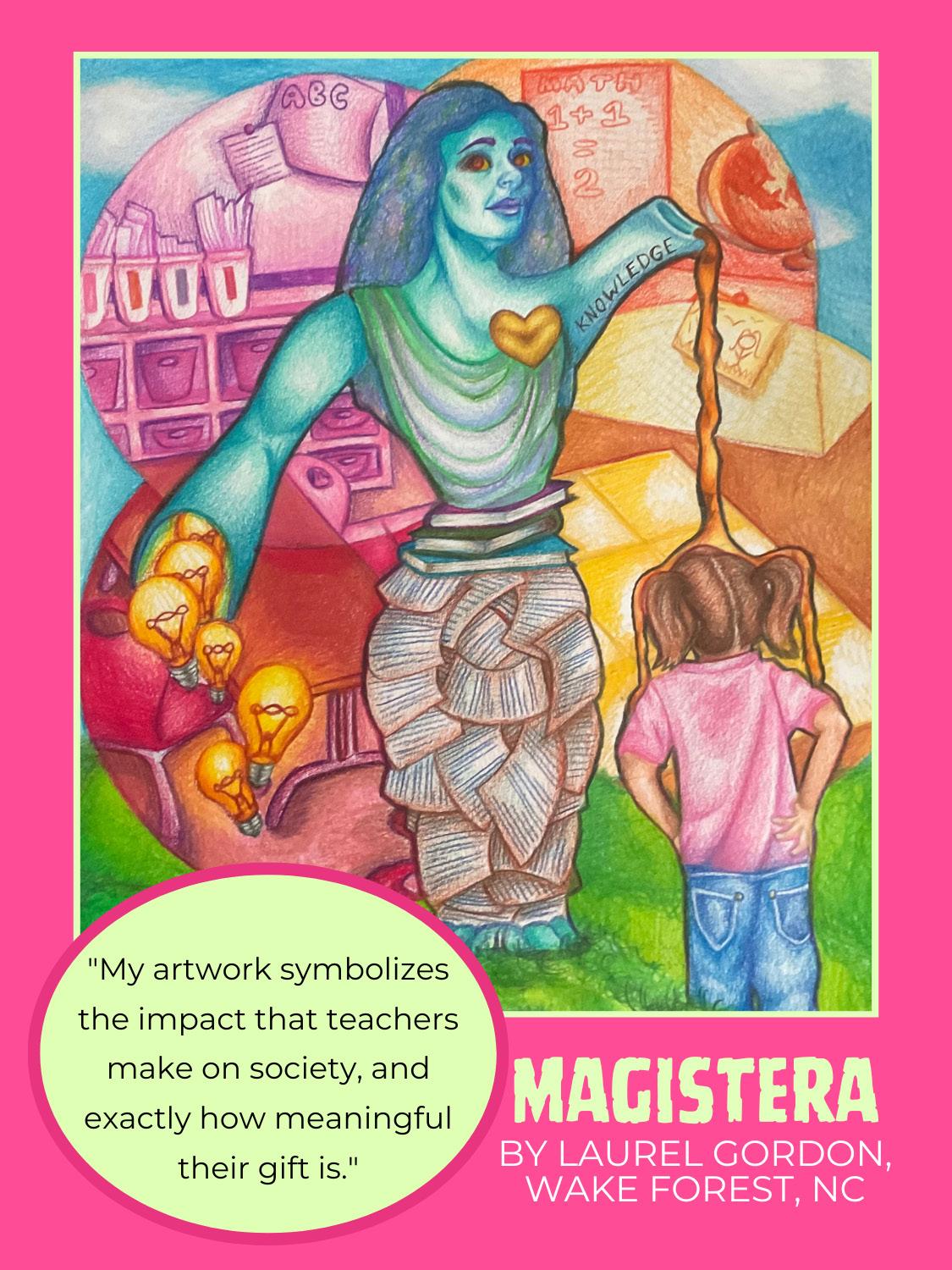
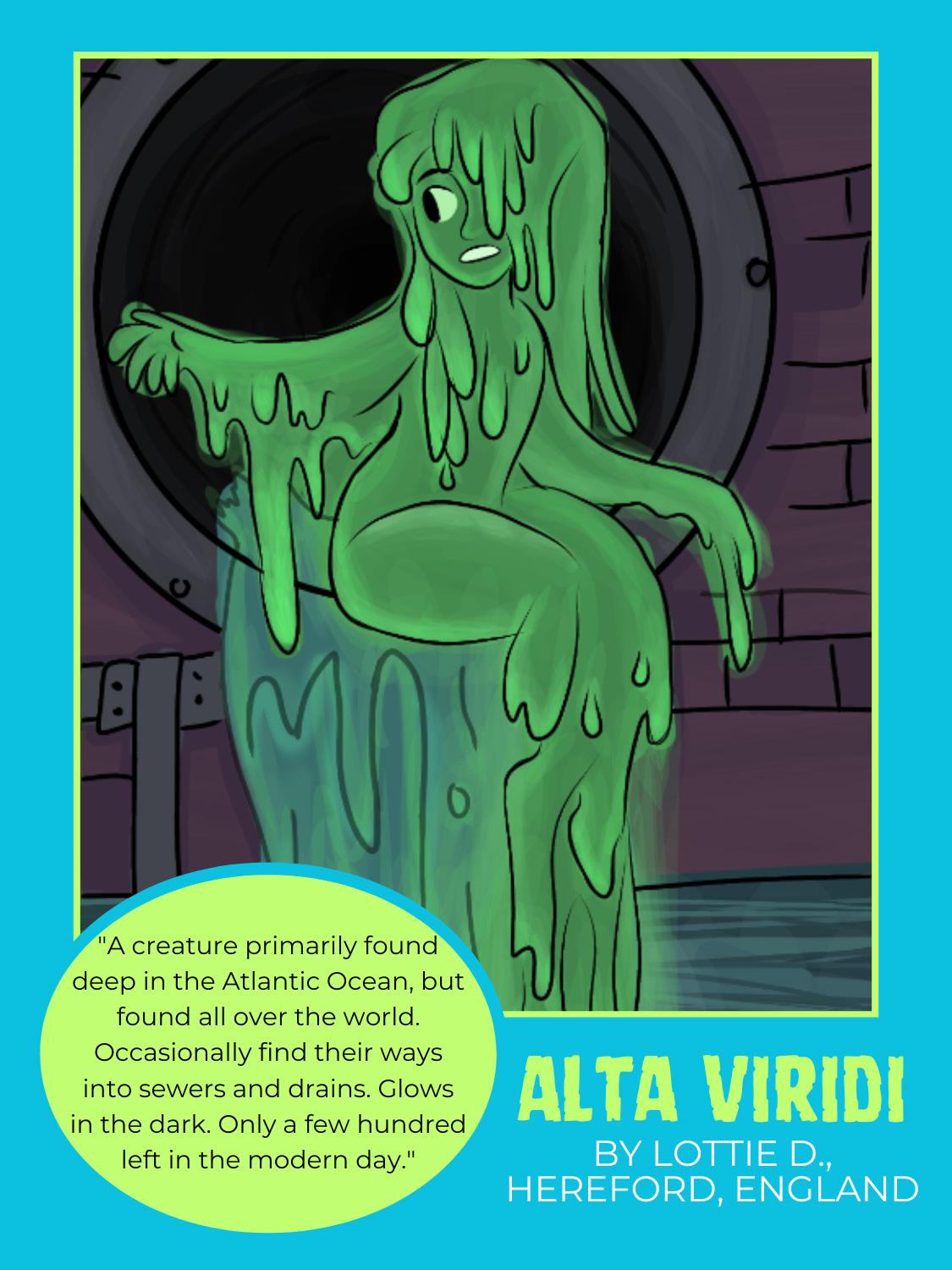
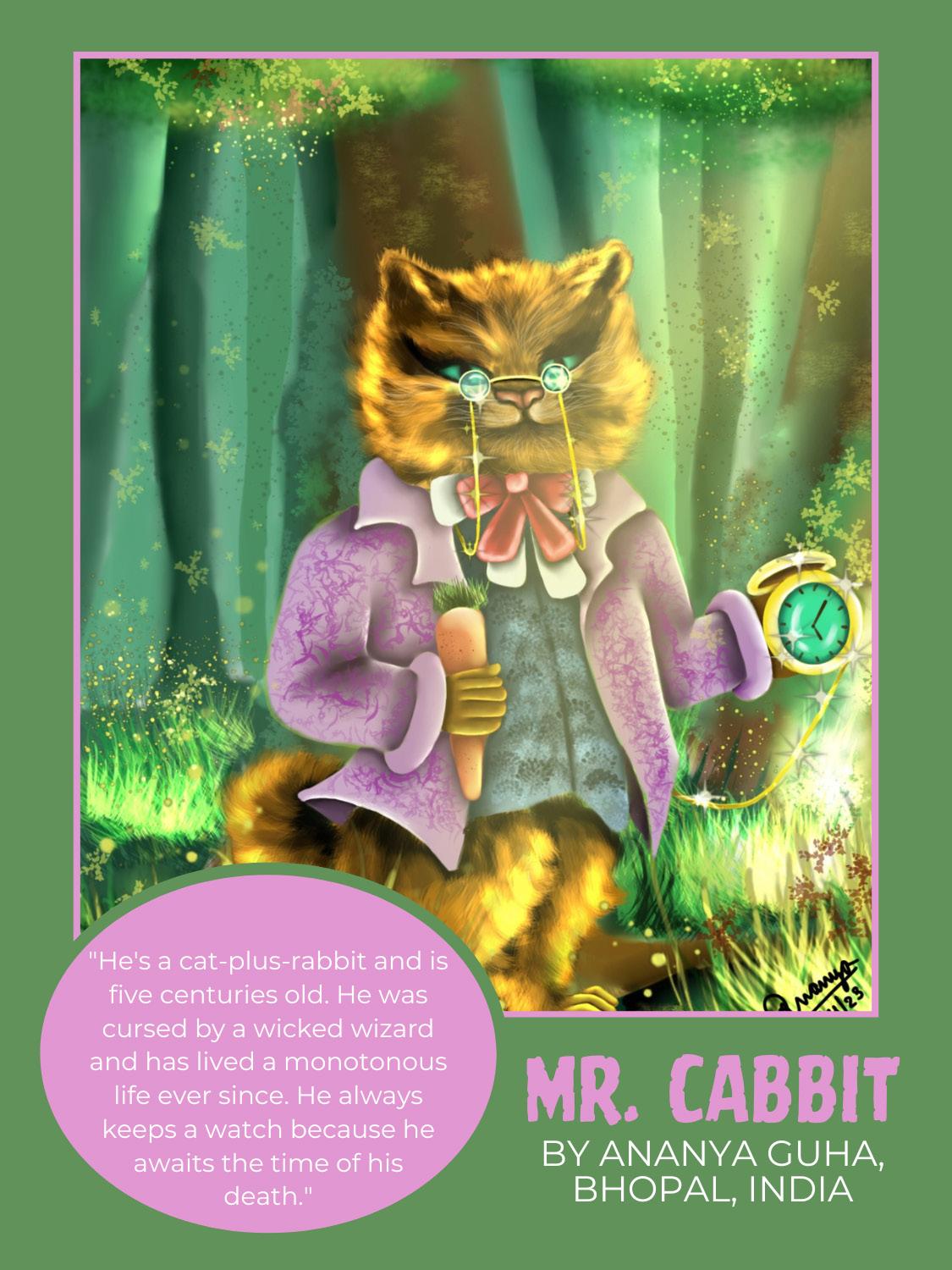

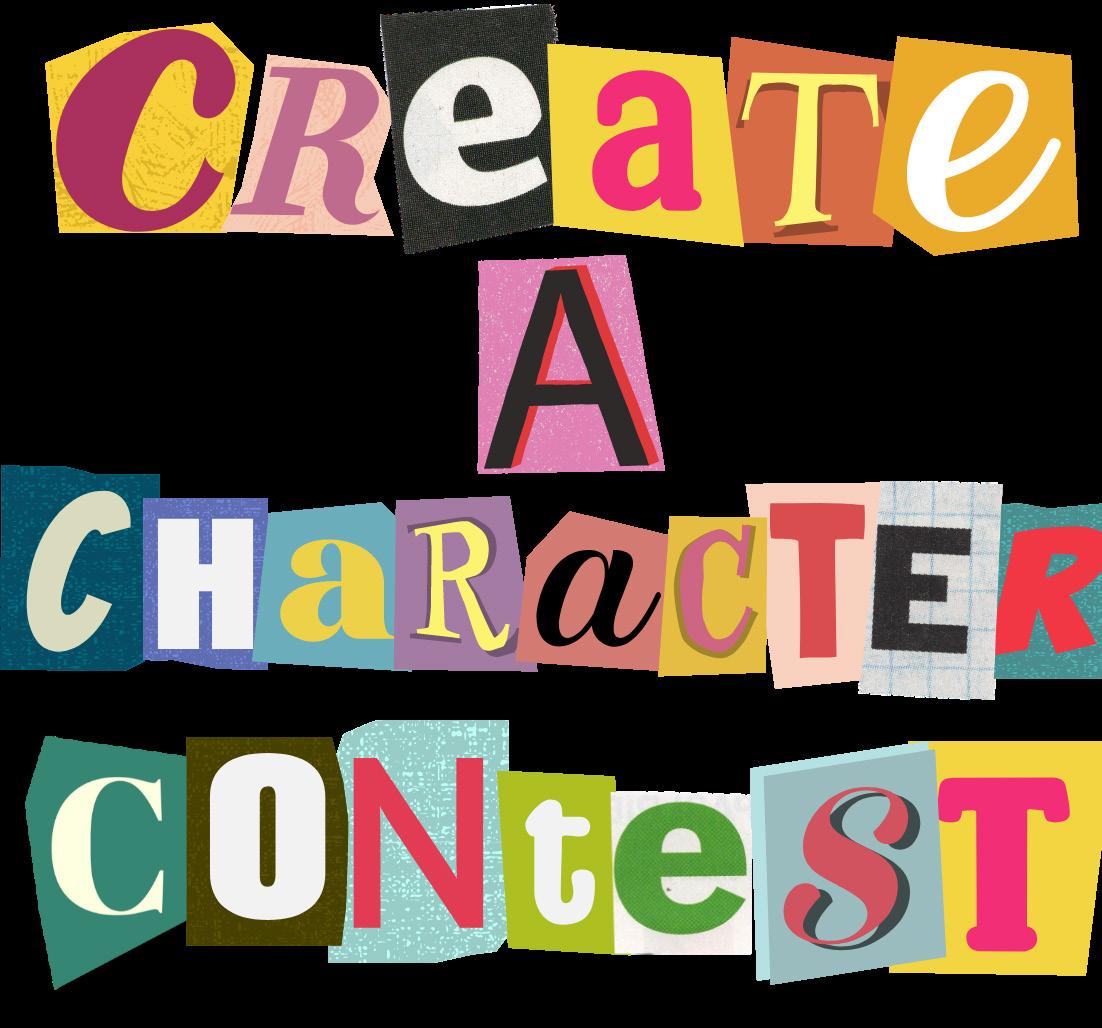
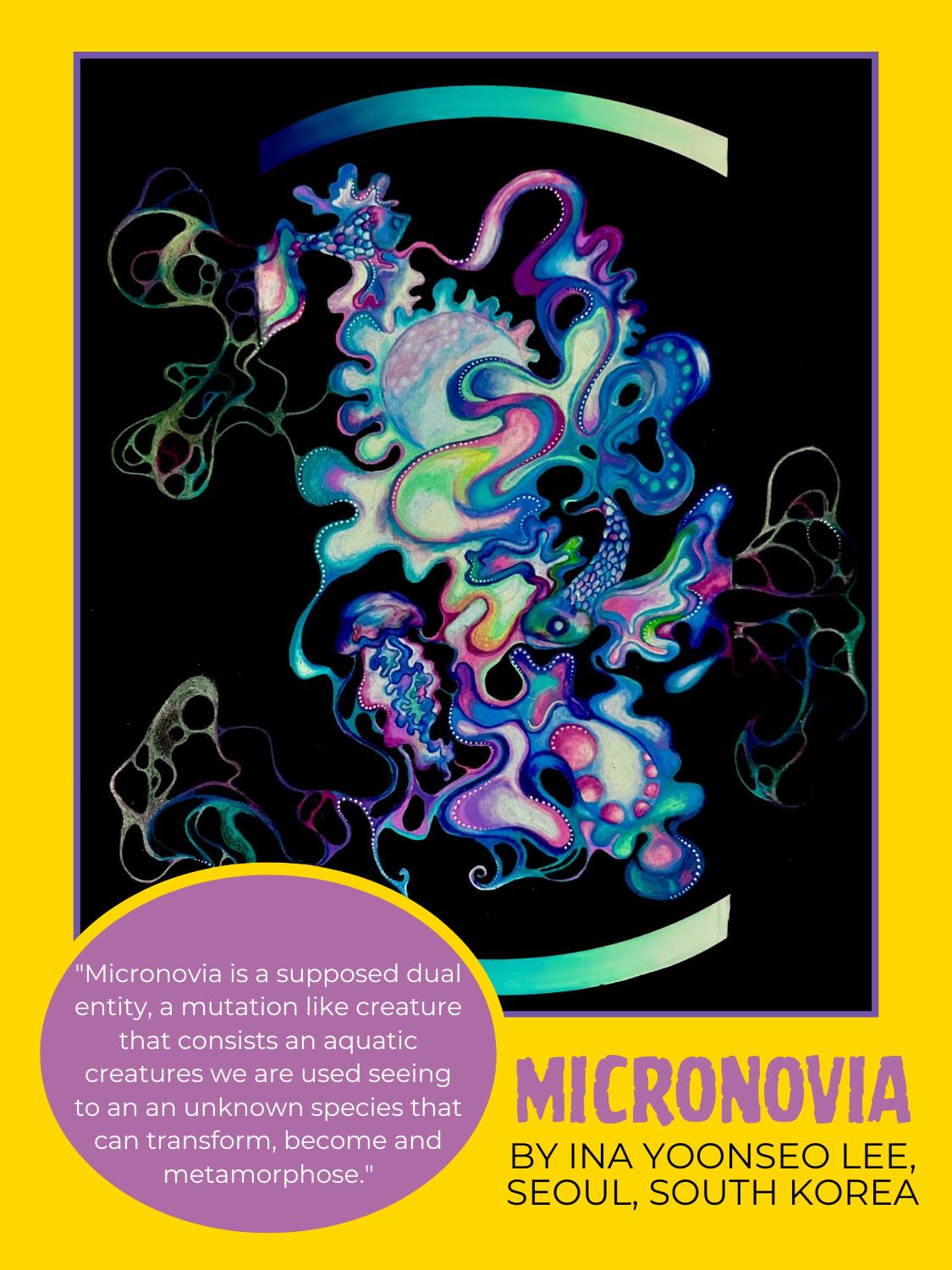
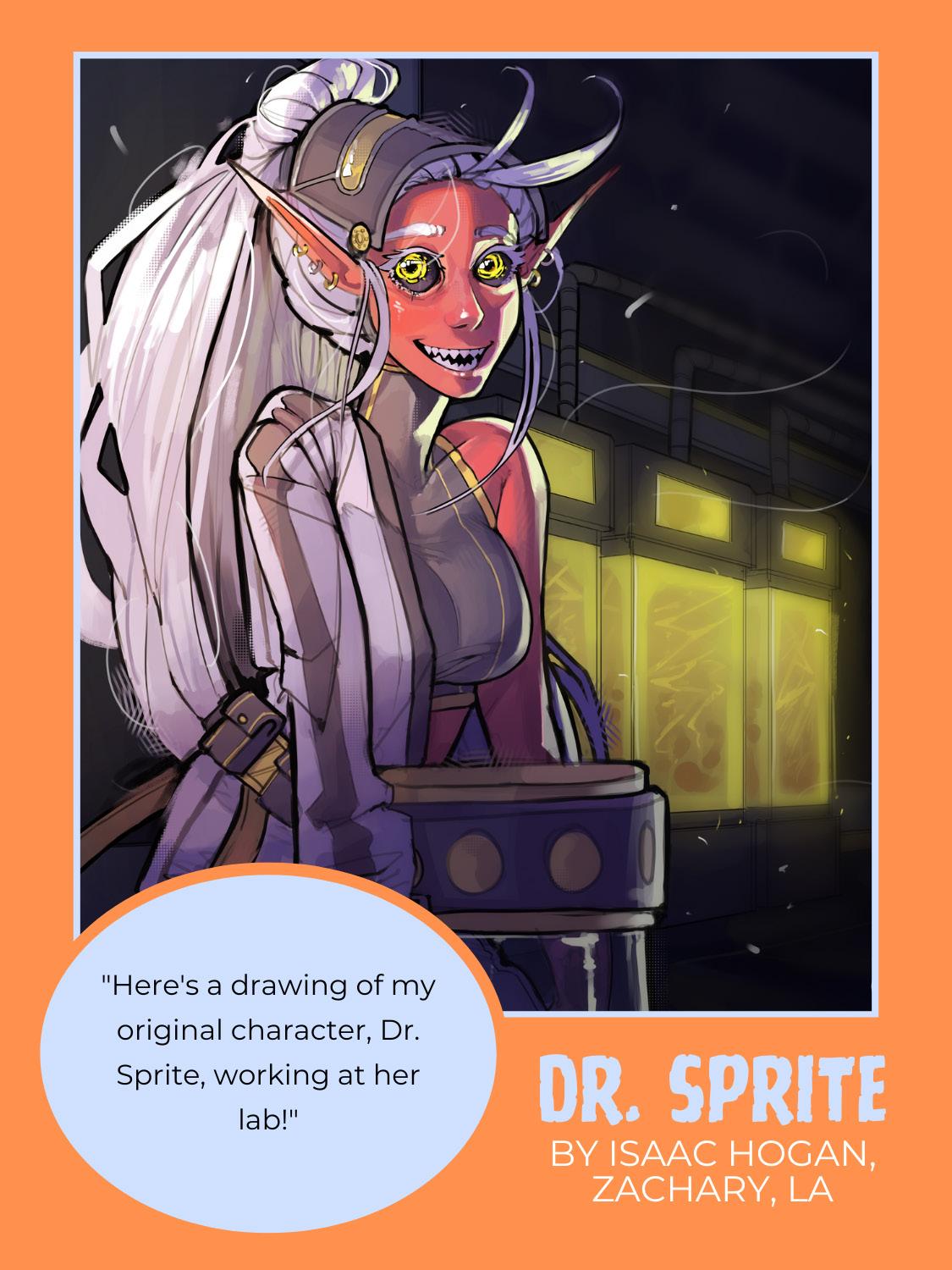
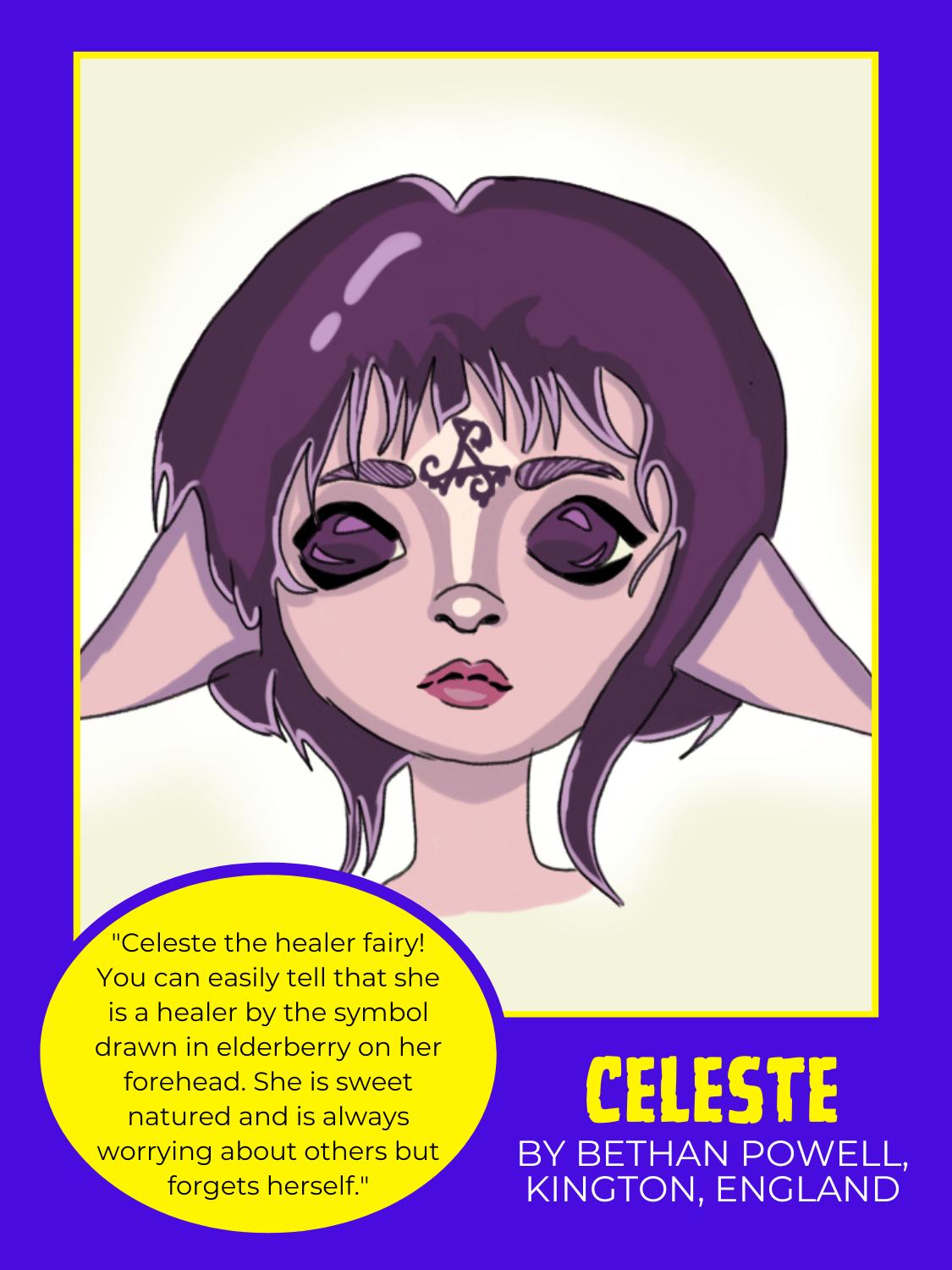
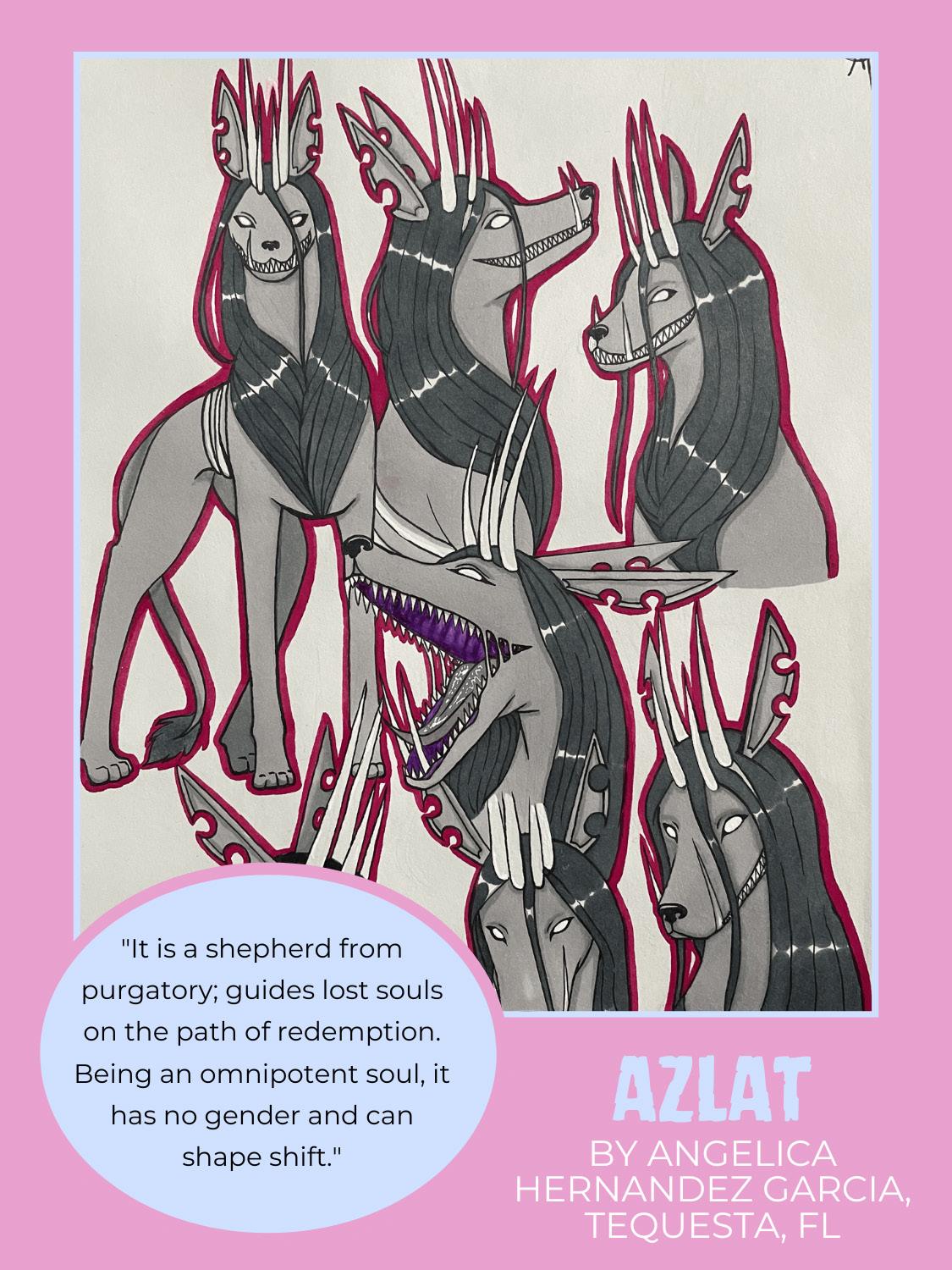
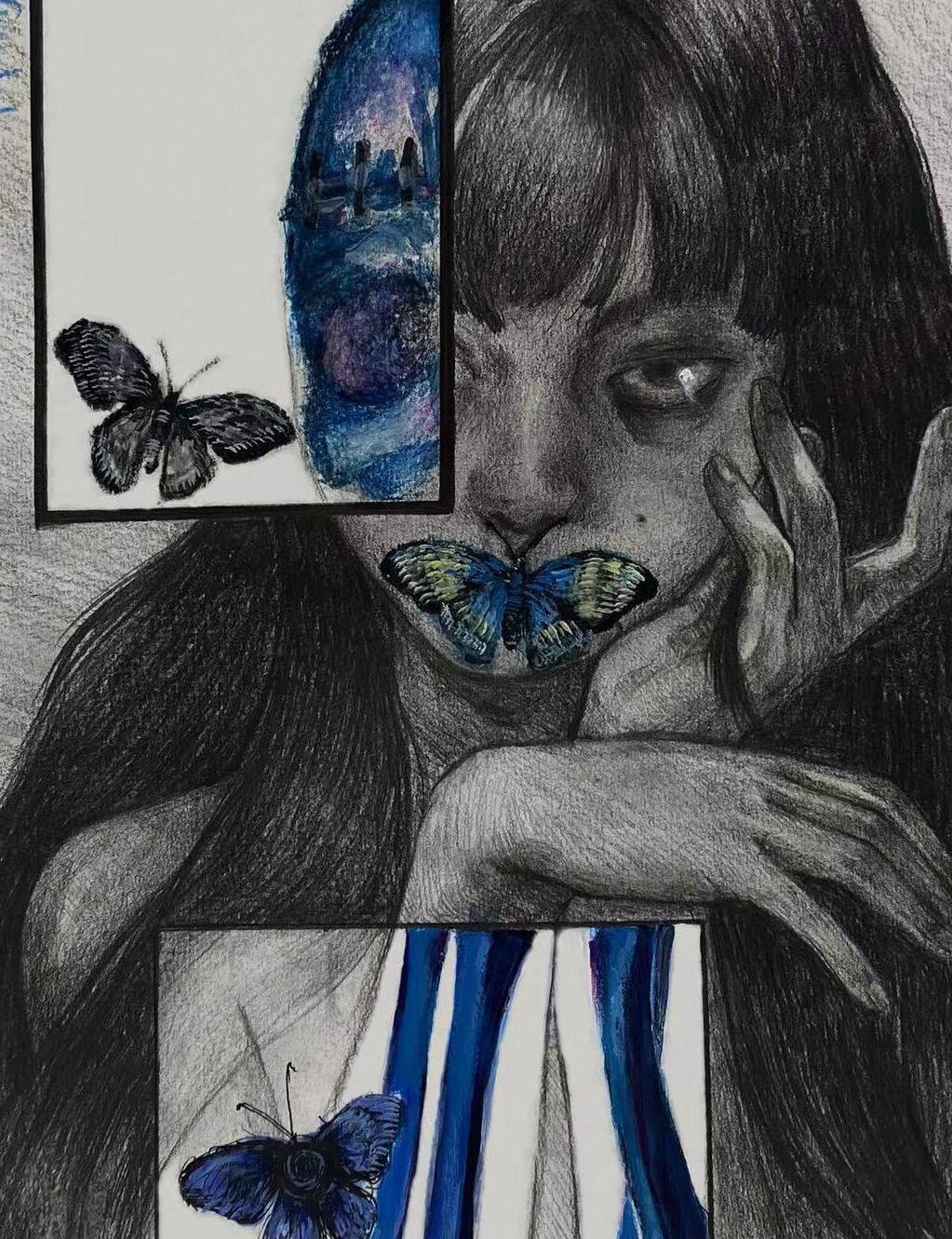 ARTWORK BY ANNA MA, SHANGHAI, CHINA
ARTWORK BY ANNA MA, SHANGHAI, CHINA
I make a point to visit her each day. I made her a little marble gravemarker, shaped like the Yorkshire terrier she always wanted. It took me weeks. It was the first time I fully accomplished something on my own. I don’t count her death as an accomplishment, though.
This morning is particularly windy. The sky is gray and the dark waves are crashing against the cliffs with such vigor it feels as if the rock itself were being killed. Maybe I think about death too much. My mother told me that when I was a child.

My thinking about death brought me to the conclusion that what most people consider dead is not in fact death. Death is loss. One does not have to have ceased breathing to be dead — they just have to be lost by the ones who cared about them.
The woman in my garden is very much dead to me, although I doubt the government would consider May Snyder, postal worker of the month, to be dead. My mother is as dead as can be, I assure you. She’s in my garden, after all.
The puppy statue has flecks of mosaic tile in it. On a sunny day, it would send rainbow light dancing across the wispy grass. The stones that line the garden would be glowing in the spectrum of hues cast over them, much like the effect she had on the people who didn’t know her.
But today the clouds blot out the sun, and the mosaic puppy almost tips over in the wind. It looks so tiny as I approach it.
so I appreciate the pale white and lilac speckles. I trimmed the grass in the garden as well. I found several ticks after I buried her, so it seemed like a necessary precaution.
Then there is the statue. She always wanted a puppy, and said she would get one when she got better. That always confused me because she had a really good immune system. It took me a while to figure out that she didn’t mean to get better physically. The statue has started to grow tiny moss on it. Its back faces the ocean spray. It marks where I buried her favorite brooch. It stands as if it’s guarding the small garden, waiting for me.
I sit on the cool, damp grass in front of her grave and cross my legs. Even though I visit her every day, I feel myself forgetting how she died, why I had to kill her, and why I needed to lose her.
She would always say things like, “No darling, death is a grown-ups only word,” and “You mustn’t ponder such grim things.” She looked preoccupied whenever she would tell me this. I felt like maybe she thought more about death than she let on. It changed nothing. My mother is still dead.
A rustic metal fence encloses a small patch of land on the highest point of the island. After the fence is a foot or so of grass before the ground plummets off the steep cliffs to the black rocks below. The garden is dotted with the occasional wildflower. I never tried to grow my own flowers,
Maybe forgetting is for the better. I’m always happier when I forget. My mother would always tell me that I forgot too much and that maybe the sad things were worth remembering. I never meant to forget anything before she died, but a part of me wonders if that’s why I killed her. Maybe she was right, maybe I shouldn’t try to forget.
I find my hands clawing at the cool earth in front of me, like I
I buried my mother’s body in the little garden by the sea. Maybe I felt guilty, but I thought she would want a nice place to rest. It gives me comfort to think of her remains threaded through the roots of the lilacs. It makes me feel like the world maybe isn’t as horrible as it seems.
ONE DOES NOT HAVE TO HAVE CEASED BREATHING TO BE DEAD — THEY JUST HAVE TO BE LOST BY THE ONES WHO CARED ABOUT THEM
was subconsciously trying to dig her up. I wasn’t trying to dig her up. I was just fidgeting. I fidget a lot. My mother fidgeted a lot as well. She would tell me to stop, but I couldn’t stop, because I would be itchy and feel like I needed to scratch at my clothes and my skin, or else I would explode. I feel the same itchiness now, too.
My fingers are itchy. I clench my hands into fists. I can feel my nails digging into my palms. Normally I just have to wait for the feeling to go away before everything gets better, but it’s really bad today.
I start to scoop up the dirt and make a pile by my side. The feeling goes away and I take a deep breath. Earth, flowers, and ocean salt fill my lungs as my hands fly.
I didn’t bury her very deep. It doesn’t take me too long to find the old amethyst brooch she would always wear when she was tending to the little window-box garden of daisies. When I was little, I would make fun of how silly she looked when she wore it. It would always clash magnificently with her frocks, a fact my younger self found quite amusing. Whenever I would laugh she would just smile sadly and not say a word.
When I got older, I would fight with her more — especially when I noticed her window garden was just an excuse to smoke. She thought I wouldn’t notice if she leaned out the window, but I always caught her. She always promised to quit right after I did, and she upheld it for about a week.
I confronted her. I think I must have upset her because when she turned slowly to face me, cigarette in her gloved fingers, she looked like she was crying. She told me that I really couldn’t understand anything. She told me that smoking is bad, but that didn’t
mean she could stop. She told me that dying is also bad, and we can’t stop anyone’s death either.
She was shaking as she whispered, “Maybe I still want to die, but it feels less like a desperate need when I smoke.”
I felt guilty after, like maybe my obsession with death did this to her. I sat alone in my room gagging on the sickly sweet smell of the daisies. I remember noticing that she always would wear her brooch whenever she said she was gardening. Maybe her brooch also made her want to die less. I wonder if she felt happy when I killed her
would be upset if I tried to grow something there. This garden has been mine for a while, and if someone killed me, I wouldn’t want them to mess with it.
My eye is tingling, so I reach my dirty up hand to rub it, but only succeed at getting dirt in my eye. They start stinging, and I can feel myself letting all the tears I’ve been saving wash all the dirt and sorrow out of them. I don’t know how to stop crying. My mom would know what to do to comfort me, but it’s too late for that now. I wouldn’t want her to waste time comforting me when she should be comforting herself, anyways.
She would always say, “There, there, honey. Everything will be alright,” when I would trip and skin my knee or when other kids would tease me. I wonder how much she believed what she told me. Did she tell herself what she told me whenever she put on this brooch? Did the glittering jewelry make anything better?
and returned the aubergine gemstone to the peaceful earth. Maybe I did the right thing.
A sharp pain stabs me in the chest. I thought unburying her would hurt less. I’m about to put the brooch back into the grave when I decide against it. I pin it to my shirt instead. It clashes so horribly with my outfit that it makes me chuckle despite myself. I take a handful of earth from the pile beside me and slowly fill up the hole where my mother used to be.
She left shortly after I killed her. She decided that maybe someplace new would be good for her. I’ve been alone in the house by the little garden since. Her little window garden has wilted in her absence. I never had much of a green thumb, and maybe I worry that her ghost
I spent so much time thinking that she was fine after she left, that my killing her made everything okay. Now I feel the bile rising in my throat because what if she isn’t fine now, and it’s all my fault?
I take a deep, ragged breath. Maybe she was right, though. Maybe everything will be alright. Maybe her death was a fresh start for her. Or maybe I killed myself when I killed my mother.
I slowly uncurl my body and stand up in my garden by the sea. It’s windy and a storm is brewing on the horizon. Tears are still running down my face, but I probably will be all right. Because even though my mom couldn’t comfort herself, she could comfort me. I have an amethyst brooch and I plan to plant some daisies in the garden where I unburied my mother.
THEY START STINGING, AND I CAN FEEL MYSELF LETTING ALL THE TEARS I’VE BEEN SAVING WASH ALL THE DIRT AND SORROW OUT OF THEM

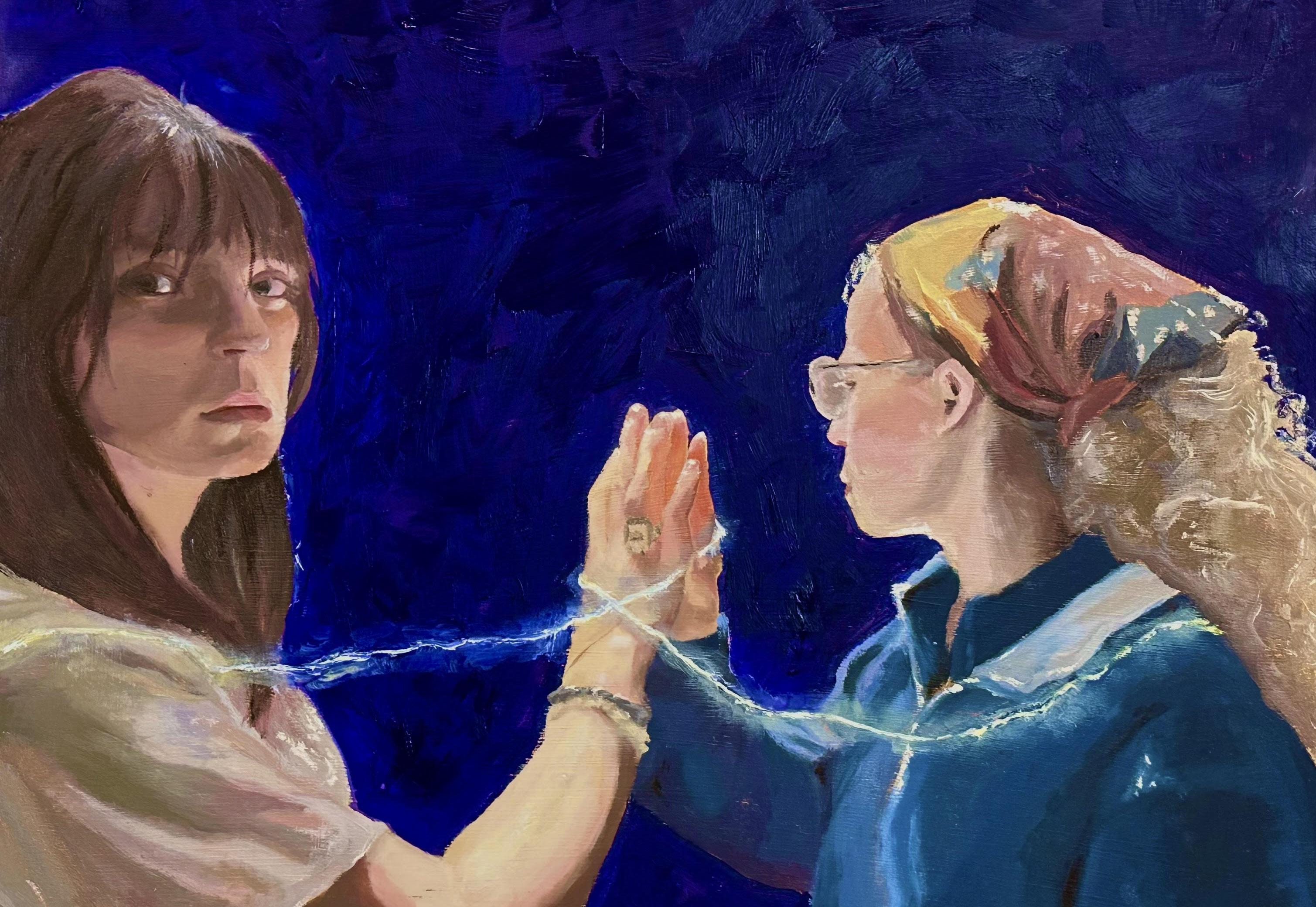 CREDITS
1. ARTWORK BY ANANYA JAIN, HOUSTON, TX
2. PHOTO BY NAOMI GRAY, OTTAWA, ON, CANADA
CREDITS
1. ARTWORK BY ANANYA JAIN, HOUSTON, TX
2. PHOTO BY NAOMI GRAY, OTTAWA, ON, CANADA
The radio’s static voice pushed through the wire mesh, forecasting an overcast day. Pale gray skies hung high above coils of wire, their barbs stark at the apex of the gates. Leaning against the car door, deep cobalt marred by the teeth of indignant keys, the attorney dragged the rubber sole of his shoe against the wet pavement, which was gleaming from the morning shower. The creak of rusty hinges echoed through the air, and his sore neck lifted slowly. He squinted his eyes, vignetting and blurring his vision as a somber silhouette stalked up the pathway, his steps hesitant, yet focused.
Lifting his head properly through the ache of a poor posture, the two men blinked at each other. The attorney inhaled the damp smell of rain as he studied his younger brother without the glare of glass or the dull orange hue.
“Abi,” Noyan breathed. Brother. His voice was clear, free from the transmission buffer of a telephone,
the silver cord hanging limp from the wall. His voice held a foreign octave, low and quiet in nature. Dressed in a plain long-sleeve shirt, medium-washed jeans, Noyan held a duffle bag over broad shoulders. He eyed the tailored suit his brother wore. The gray fabric and purple tie were a little antiquated for someone in their prime, but the neat hemmings and perfect fitting could only be perfected by the point of one particular needle.
“Anne has the flu,” Sami responded, pushing himself off the car door. Mother. He wordlessly took the bag from Noyan, placing it in the trunk. Closing the lid with a loud thud, Sami observed as Noyan stood aimless, his hands grasping at empty space. “Do you want to stay here? Get in the car,” he instructed, rounding for the driver’s side.
Reversing away from the penitentiary, Sami kept his eyes trained on the rear windshield. He could hear Noyan toying with the radio, turning the FM knobs.
Scratchy static cut between pockets of choruses and advertisements. He settled on the jingle for a local plumbing company. Merging onto the main road, Sami asked, “Have you had breakfast?” It was only a quarter past 10. Noyan didn’t answer, his head tilted to the backseats of the old car. Sami glanced in the rearview mirror, catching sight of the pristine car seat strapped in the middle of stained, beige upholstery.
“No,” Noyan replied, turning his head away. He stared at the gold band wrapped around his brother’s finger, unable to look away from its mocking shine. He twisted the signet ring hanging loosely on his pointer, their father’s initials carved neatly into it.
They ducked their heads beneath a low archway and after passing through a beaded curtain, the duo was led to a battered booth along the windows. The clouds had significantly darkened, a low hum of music playing alongside the drone
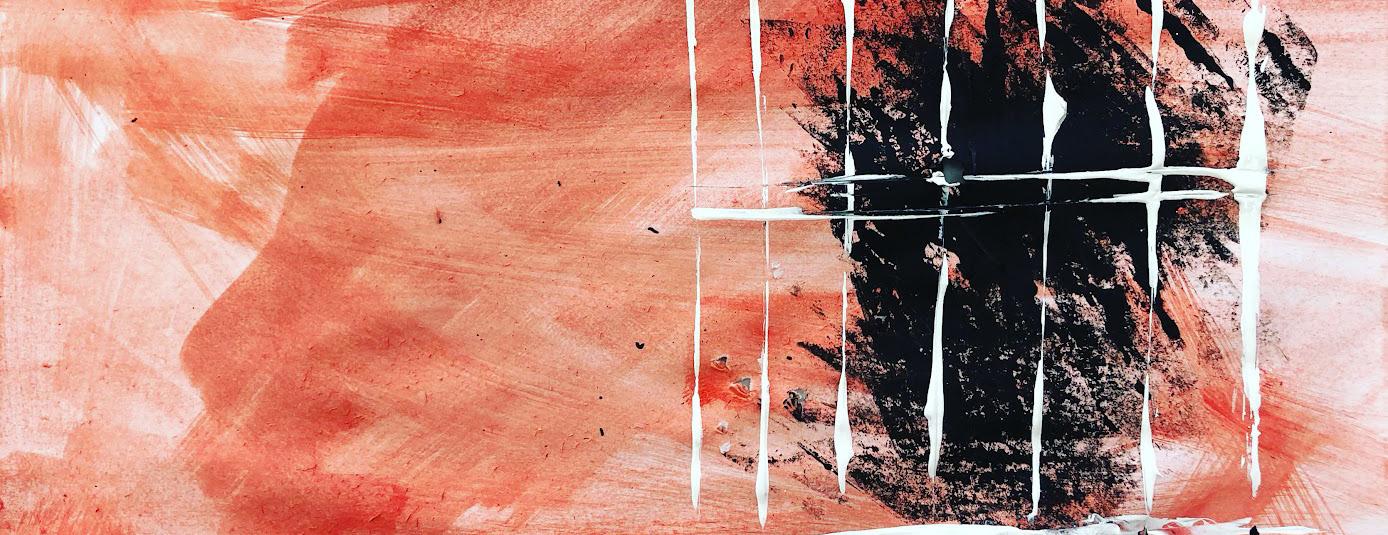
of the news anchor. The small TV was too high in the corner and the picture too saturated to provide a genuine viewing experience, the volume equally inadequate.
Seated across from each other, Sami paid no heed to the laminated menu, its corners peeling and folded. “What do you want?”
“I don’t know. There’s so much.” Noyan had one flipping in his hands, squinting at the cluttered graphics and serif font. Anything legible felt of a distant era, one where he sat in a plastic chair in a dim, one-bedroom Queens apartment, his short legs swinging back and forth as his mother paced over cold kitchen vinyl.
Motioning over a tall girl, youth still rounding her cheeks, Sami leaned forward as he ordered, “Two çay and menemen.” She nodded, attention focused on Sami before disappearing quickly into the kitchen, pen cap caught between her teeth.
Neither one said a word as they waited. Sami readjusted his watch, twisting the small knob as he watched the brass hand spin. Noyan watched his brother, unmoving as though he was still on the other side of glass. Many times the phones would remain pressed to their ears as neither spoke, simply waiting in comforting silence until a guard ended the tranquility. It was always his brother
during visitation — him alone. Their mother could not bear to see the child she once dressed for school, to now be dressed in metal cuffs. She had fainted when his seven-year sentence was read, the 19-year-old stuck in a catatonic daze while chaos swarmed around him.
“Kolay gelsin,” Sami thanked as the girl placed down two cups, steam circling above deep amber tea. She then placed the dish in front of Noyan, looking him in the eye for the first time, but only for a second. She left a ring of bread at the edge of the table.
Noyan just stared at the dish of scrambled eggs and tomatoes, the familiar smell of fried peppers enveloping him. “Aren’t you hungry?” Sami questioned, placing down his cup.
“Starving,” Noyan confirmed, but he still made no move. Sami sighed inaudibly, tearing off a piece of bread as he pushed it into Noyan’s hand. Finally dipping the bread into the egg, Noyan chewed slowly as a forgotten warmth touched his tongue.
Watching as he tore another piece of bread, Sami asked, “When are you coming home?”
Pausing in his bite, Noyan swallowed as he glanced at the dish. “Not today,” he answered after a moment, resuming chewing.
“Haven’t you been gone long
enough?” Sami argued, neglecting his tea as it slowly cooled.
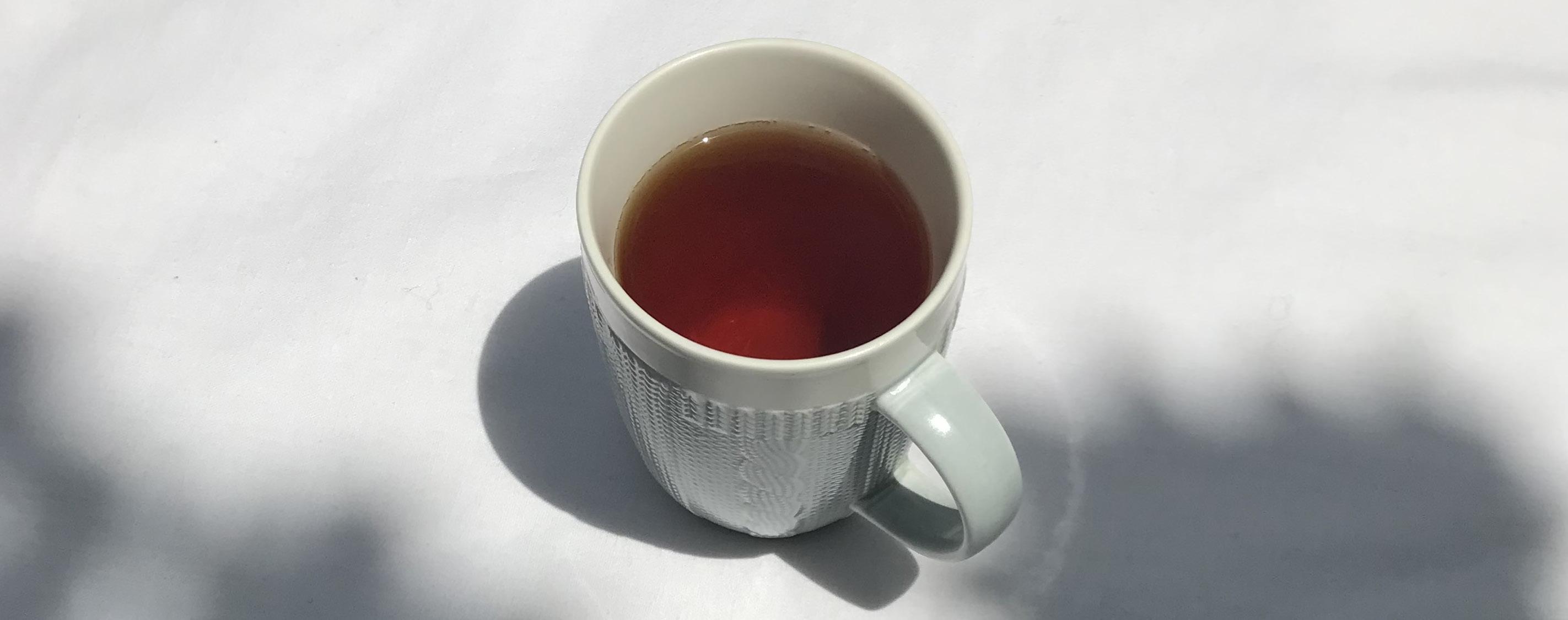
“But where have I been?” Noyan reasoned merely. Taking a sip of his tea, he wished for the sweetness of a sugar cube. “Someday,” he offered.
“Where will you go?” Sami wondered, contemplating how after watching him sit behind glass for the better part of a decade, Noyan was only now beginning to look less like a boy; the line of his jaw had hardened, his brows thickened, brown eyes sunken in. He appeared so tired, yet a certain need glowed behind his gaze. A hunger no fried peppers and egg could satisfy.
“That’s for me to find out, abi,” he smiled, reminiscent of a once fat-cheeked and restless juvenile. Cheeks now hollow, only restlessness was leftover.
“Someday,” Sami repeated, reluctance heavy in his tone. “Söz?” he pleaded. Promise?
Noyan didn’t answer, indulging another fragrant bite. His eyes were trained on the window, watching as rain droplets stuck to the pane. He tracked as one drop traveled down the glass, pulled into bigger drops before continuing to trickle down, and down. He took another drink from his cup, tongue curling at the bitter aftertaste as he still yearned for a little more sugar.
Eric Valiente transfers to South Bay. Julia and Eric became close friends after running into each other on Eric’s first day, and after a while, being friends turned into a relationship. Julia tells Eric how she feels about gangs, but he still joins the Flat Bush Junction Crips despite how she feels, which ultimately leads to her joining the gang alongside him. However, chaos begins when Eric’s actions start reflecting Julia as his girlfriend.
Tagger, Sacramento CA
“So you’re saying it wasn’t all an act?”
A story filled with love, hate, trust, and betrayal is expressed through these few words by Julia DiVino, the main character in this novel. Allison van Diepen, the author who has written many other great books similar to Snitch while telling a different story with a similar situation and a different point of view, knows how to create a novel that will always leave you wanting more. I recommend reading this book because nothing stays tranquil for too long. Whether it’s a turn of events causing chaos, a rumor bound to ruin bonds, or the simple feeling that your love for someone (who may not even have your back) is more important than the safety of yourself, nothing peaceful goes undisturbed.
Snitch is a book about Julia DiVino, a 17-year-old girl who attends South Bay High School, which is conquered by multiple gangs. Julia tells herself she’d never actually join a gang, although most of her friends are in one, and she sticks well beside her decision until
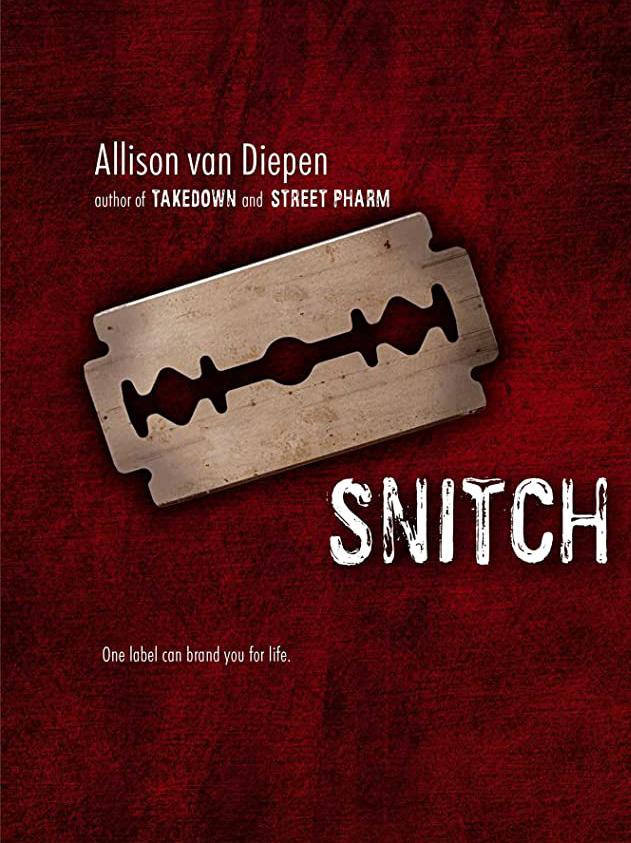
Julia DiVino is a sweet and intelligent girl who lets her love get the best of her. When you first read the book, Julia appears to be a smart girl who can make good decisions that will benefit her personally. However, as you get deeper into the story, you can see how Julia’s love for Eric starts to blind her to the decisions she should be making to keep herself safe. Julia appears naive toward the middle of the book, and ultimately loses sight of her goals and what she should be doing to benefit herself.
My personal connection is with Julia because she reminds me of myself. She is book-smart, but not street-smart. I let my love for someone get the best of me until I lose sight of my goals and who I am. Although I can’t relate to joining a gang or putting yourself in danger for someone, I do relate when it comes to putting someone who doesn’t care for me the same way I care for them above myself.
The message of this book is that things aren’t always how they seem to be, and that not everyone can be trusted. The dialogue throughout the novel gives a really good understanding of how the characters feel when they handle the situations that represent the message. The dialogue captures the characters’ feelings, and it is easy to imagine how the characters express themselves. The dialogue is filled with slang representing the gangs and the age of the characters in the book. For example, the young people in gangs use words like “homie” and “yo,” while the older characters within the book use
proper grammar.
I recommend this book to people who love a plot twist and turn of events regarding love and drama. This book may also be good for anyone who can relate to the main character, her personality, and how she handles the events throughout the book. Although this emotional, drama-filled book tends to control your feelings while reading it, it’s always my first pick when someone asks me to recommend a good book.
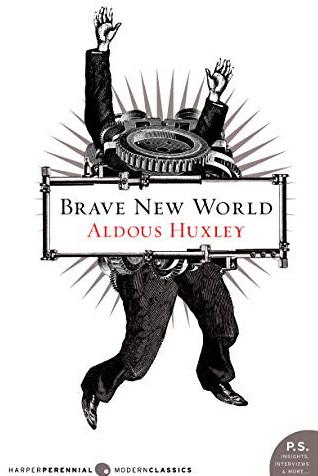
“What is the meaning of truth?”
I asked myself this question several times when flipping through the pages of Brave New World by Aldous Huxley. This dystopian novel led to me pondering and reflecting on several ideas: self-identity, fake happiness, and the ideology of freedom. Huxley constructed a world ruled by a seemingly equal, free, happy, and what some might consider
a flawless dictatorship. However, these are all illusions created by the government to achieve a collective, stable society with no sign of individuality or truth.
At the novel’s beginning, the “manufacture” of humans in the world is introduced. Babies are “produced” inside bottles via assembly lines in a facility known as the “Central London Hatching and Conditioning Center.” They are divided into strict social castes based on their physical and mental ability, ranging from Alpha to Epsilons. Their lives are predestined. Individuals all have their prescribed roles and are brainwashed to enjoy them; social classes are unchangeable, and people are engineered to accomplish what they are required to do without desiring things outside their caste. Brainwashing and hypnosis start with babies; the essential ideas of the brave new world are implanted, forming a deep root in their subconscious. Those are all efforts to reach the motto: “Community, Identity, Stability.”
With the aim of a stable community, individuality and uniqueness are banned. It is emphasized through sleep teaching and hypnotizing that conformity is important, since they are all part of a whole rather than separate individuals with their own identities. This would be the biggest obstacle to the so-called “stability.” From the start in the “human producing factory,” most people are duplicates of each other, to the brainwashing education and suppression of individual thoughts, the controller is trying to eliminate and wipe out self-identity. Gathering and blindly following others are encouraged, while solitude is a sin. Kids are trained to abhor flowers (nature), Shakespeare (literature), and science to prevent them from developing personal interpretations and instead, focus on their social duty. Whenever an individual is self-conscious and starts to contemplate their lives, such as the characters Bernard, Helmholtz, and the savage —
John, they are considered eccentric and sent to the isolated island to keep the society’s consistency. It is extremely worth reflecting on a world without personal uniqueness, where everyone is the same, to pursue that “stability and equality.” Should that be our future goal?
“Everybody’s happy nowadays.” This is another firm belief the civilization of the brave new world holds. Emotional suffering does not exist as long as people get access to the drug “soma,” which helps them leave all the problems in reality behind and not to think about the misery and anxiety, only the endless happiness ahead.
This kind of joy achieved by drugging oneself and escaping from reality to avoid facing the truth about their situation is false. Social construct and avoidance cannot provide true delight, as one must struggle to find their own. In the brave new world, “everyone belongs to everyone else.” There are no deeply formed relationships, no concept of monogamy, marriage, motherhood, or family. Only superficial sexual relationships exist, with no deep emotional bonds or attachments like love. All people have is temporary, self-centered happiness instead of strong emotions that could be everlasting and heart-shaking. It’s true; a world without sickness, aging, negative emotions, a stable society, and access to everything people want and need sounds appealing. But the real happiness caused by the pursuit of science, truth, inner wealth, and spiritual love is all absent in this society.
Overall, with the lack of individuality, freedom of thought, and, most importantly, truth, due to the dictatorship, despite the delusion that the world seems to be perfect, people are happier than ever as their materialistic desires are satisfied, the genuine and strongest emotions could not yet be experienced. Moreover, when everyone is identical, has no creativity, new ideas, or judgments, and do what they are taught to, are they still humans? Or are they just simply robots under the disguise of a human body?
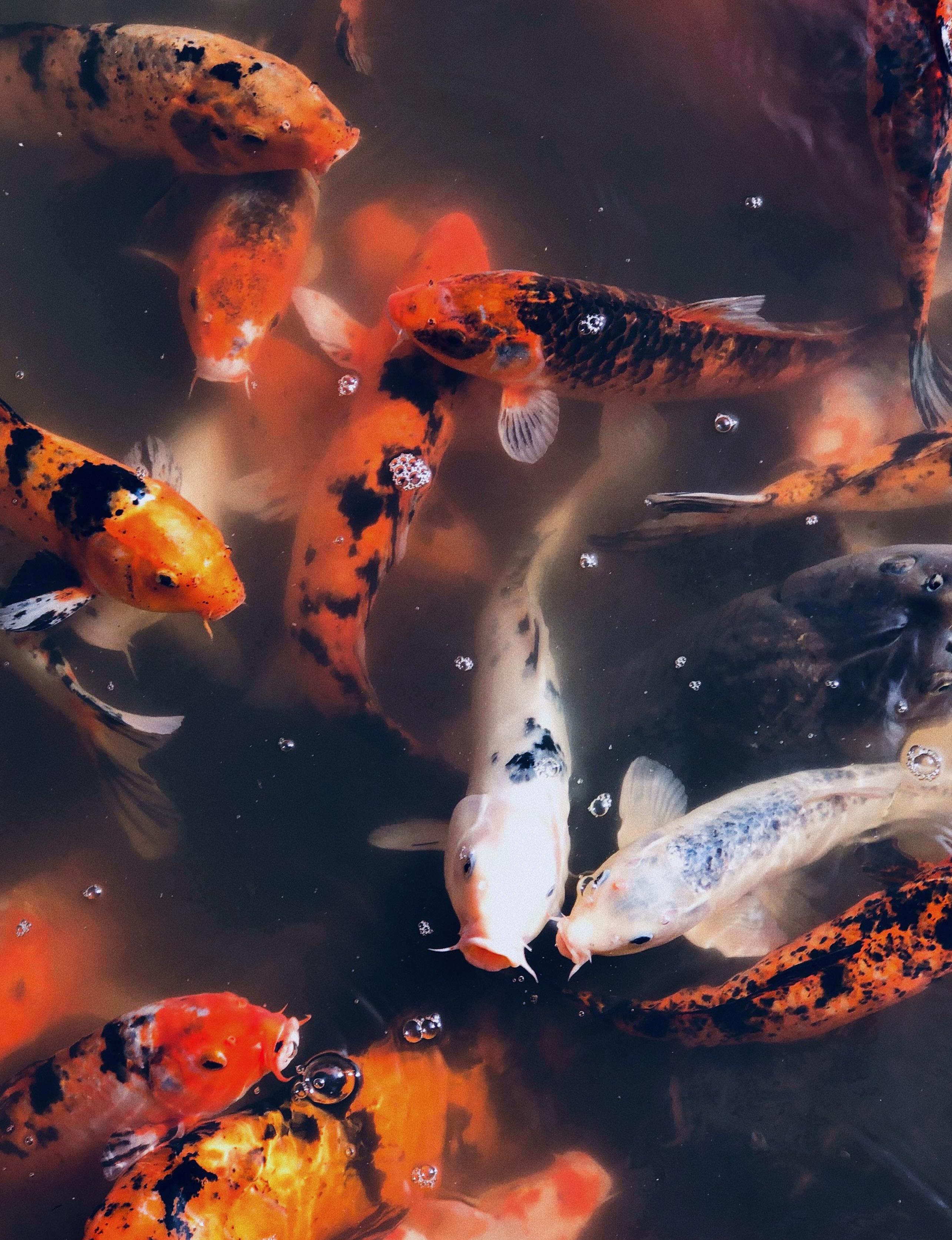 STORY BY KARINA BLISS, CHATHAM, NJ
STORY BY KARINA BLISS, CHATHAM, NJ
The glare across the lake’s surface drew her forth, and the translucent water offered a refreshing and welcoming view into its depths. Being on the tail end of a snowstorm, the clouds merely gently sprinkled white powder across the shoreline while the sun began to nudge them out of its way to announce its return to the sky. The girl poked a finger into the still water, lightly disrupting the peace with tiny ripples.
“Why can’t I grow up to be a fish?” she asked the water, mindlessly swirling her finger, causing a greater disturbance.
“Because you would be stuck under a sheet of ice every February,” interjected a short-haired individual standing behind her.
While storytellers have written countless stories about fish people, the girl still had no privilege to participate in any of them. So she took in a sharp breath of cold air with a sigh.
“I guess, then, you require me to search for a new thing to obsess over now that my dreams have been crushed?”
They only shrugged in response. The girl’s head swirled with images of underwater adventures, and a pounding headache swept through her. She wondered why everyone said time outdoors was supposed to clear your head.
She sat backward into a powdery snowbank, soaking her Forever 21 Hello Kitty snowsuit with snow melted by her body heat. The chill of the ground crept up her back because her outfit was not made for the elements, only a display of vanity and consumerist loyalty to the Sanrio franchise. The absorbent fabric reflected the blinding sunlight, causing her to blend in with the snow.
Thoughts passed slower than minutes until she broke the silence, whining, “Why won’t you sit with me?”
The individual replied, “The ground is wet, and neither of us dressed properly for this walk.”
THE SUN BEGAN TO SET FROM BEHIND THE CLOUDS, SENDING RAYS OF ORANGE LIGHT ACROSS THE LAKE LIKE THE STRIPES OF A KOI FISH, ENTICING THE GIRL TOWARDS THE BEAMS OF COLOR.
towards the beams of color. She felt a gentle hand on her back.
She considered retreating to the warmth of home, but there would be no warmth until her mother returned from work. While fish swam in schools, unfortunately, humans seemed to believe in the normalcy of solitude. She rolled over in the snow, and with her backside soaked, she suddenly realized that she did not like being wet. The scales of a fish provide protection and would have allowed the chill of the wetness to roll right off her back.
The sun began to set from behind the clouds, sending rays of orange light across the lake like the stripes of a koi fish, enticing the girl
“Child, the water is an obstacle to be overcome, not a friend to be made,” she heard behind her. However, when she whipped her head around to argue, nobody was there but a gust of wind. Lacking any guilt over disobeying the individual, the girl darted towards the water. She sliced through the surface, waterlogging her snowsuit, sending her ever faster toward the murky bottom as if the lake was calling her.
Finally, she was alone with the fish — with her people. Water filled her lungs until she felt like she could breathe again. She wanted to be one with the fish. And so she was — forever young and feeding the plants.
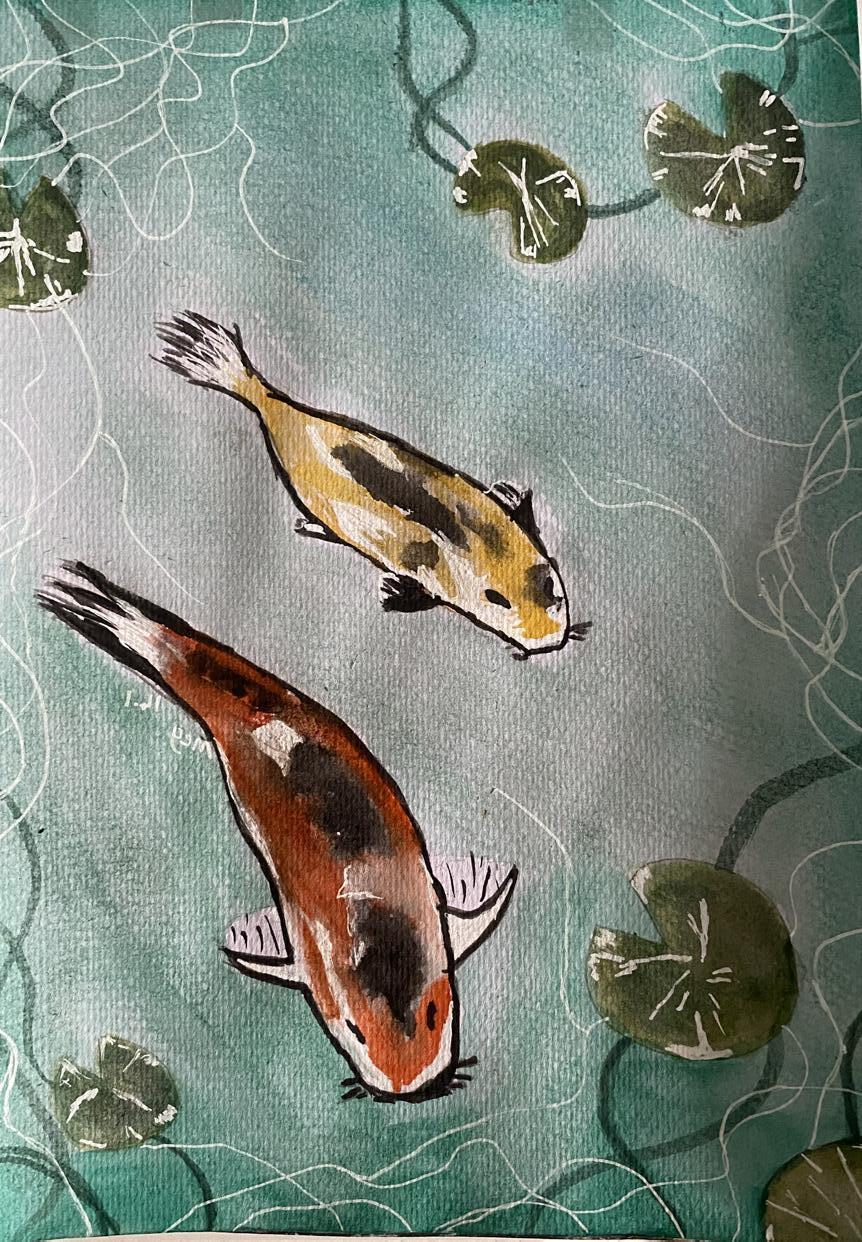
 PHOTO BY EMAAN ZAHRA, SHARJAH, U.A.E.
PHOTO BY EMAAN ZAHRA, SHARJAH, U.A.E.
I feel the wood splinter in my hands before I hear the shattering of glass on the hardwood floor.
Breathe in. Breathe out.
The old mantra reminds me to keep going. I keep my eyes forward. The white shine of the harsh, empty canvas matches my stare. It pains my eyes to look, but it demands my attention.
Breathe in. Breathe out.
An eternity passes. I turn my gaze down to where pieces of my shattered mirror rest on their hardwood deathbed. The myriad of reflections gazing back at me aren’t mine. I have never been as gray as this person in the mirror — as gray as rain clouds hanging heavy in the sky. The broken paintbrush in my hands begs for attention, but I can’t look at it, so I throw the halves at my canvas. They halfheartedly bounce off the taught fabric and
paper, accompanied only by the lulling sound of thunder catching the tail ends of lightning. Without the thunder, the deafening silence of the earth rings in my ears, and my windows remain cloudy, never washed by the rain.

My empty canvas is reaching out to me telepathically, beckoning me, wanting to fill its duty as a vessel for my art. But I have no art for it. I’ve failed the canvas, I’ve failed the mirror, and I’ve failed the paintbrush — all innocent victims in the ruthless murder of creativity. I still find my way toward the canvas despite myself. I’m possessed by the glow of light hitting the white fabric, and I move towards it like a moth to a flame, like a junkie chasing their next high.
The lonely stool stands empty and awaiting, but the floor is more welcoming. I lay on my back a few inches away from the mirror, its fragments threatening to mix with my loose hair. My spine relaxes, and my breathing slows. The weight in my chest settles deeper.
Breathe in…
I hear footsteps getting louder as they approach me.
“You can’t stay on the floor forever,” a figure says above me; her voice is familiar.
“I can certainly try,” I answer before thinking... I can’t match a face or name to that voice.
onto the floor.
Breathe in…
I’m overcome with the need to escape. I can’t stay here, next to the evidence of my crimes — so I flee. I jump off my stool and wander to the window, where sunlight peeks through the curtains. Through cloudy glass, I see the sun and a bright azure sky setting the scene. Not a cloud in sight. There hasn’t been a thunderstorm in a very long time. Those only existed in my childhood, when I’d stay inside and draw entirely new universes on scraps of
“It’s been a while, hasn’t it?” So I know her. I lift my head off the floor to look, but her face is out of focus. I don’t have the heart to ask for a name.
“Why haven’t you started painting?”
Because I don’t want to, there’s too much stopping me. I’ve gone face blind, art illiterate, my hands are cold, the colors are too dull today, the paint isn’t thick enough.
Because I just can’t.
I still find my way toward the canvas despite myself. I’m possessed by the glow of light hitting the white fabric, and I move towards it like a moth to a flame...
THE WHITE SHINE OF THE HARSH, EMPTY CANVAS MATCHES MY STARE. IT PAINS MY EYES TO LOOK, BUT IT DEMANDS MY ATTENTION.
But I don’t tell her this.
“I can do it later. I have time.” She sighs as she sees through my excuse, like she understands why I can’t start painting, even though I don’t understand.
Breathe in…
I hold my breath forever.
Meanwhile, thousands of universes have died and been reborn, countless alternate realities where things don’t go wrong.
Breathe out.
Or I do know, somewhere hidden deep inside my chest. The weight settled there shifts uncomfortably, perhaps unsettling from its spot behind my ribcage.
“Tell me what you’re thinking,” she says. Not a suggestion, a command.
I don’t want to tell her anything; I refuse. But her presence coaxes the words out of me.
“I feel so uninspired, unmotivated, uncompelled, uninterested in doing anything right now, least of all painting,” the words leave my mouth in one breath, a verbal exposé of my pathetic incompetence. “Good.”
Good? What was so good about this? About these dismal blocks in my life, this unbearable quiet in my mind? “There’s nothing good about how I feel.” I drag my thoughts out of their cramped hiding place up to the surface of my mind. “What kind of self-proclaimed ‘artist’ can’t make their own art?” Something behind my face threatens to break.
“Who said ‘self-proclaimed’? You’re an artist.”
anyone else’s art looks like. It is still your art, even if someone else takes a brush and adds one or ten strokes to your canvas. And if you don’t like it, start again, paint it over.” She makes it sound so easy. “Stop letting people take art from you. You are not weak.”
You are not weak.
I ruminate over her words for so long; I’m convinced the sun has already exploded and consumed us all. Her words are a slap in the face. They leave my cheeks warm and stinging. They sink through my skin and bones, settling in the centers.
Breathe in… breathe out.
A faint rumble in the distance breaks me from my trance.
“Looks like rain.” She’s peering out the window now. How could she see anything through those windows? It’s funny. So funny, I start laughing. And I laugh for an eternity ...at myself, at how complicated I made things, and at the stupid cloudy windows. An eternity of laughter ends when I hear a louder rumble of thunder. The figure makes her way towards me again, this time stretching out a hand, expecting to reach one of mine. So I extend my arm and get lifted off the hardwood. When I’m pulled fully upright by the girl’s steady tug, the weight in my chest dissipates. I expect to finally see the face of the girl, but she’s gone. I look around, but it’s as though she was never here.
The ringing from the earth is gone, replaced by the steady beating of rain.
Breathe in, breathe out.
“But—”
“It doesn’t matter,” she raises her voice, startling the dust around us, breaking into my ribcage, “what your teachers think or what
I go to the window. Thick drops of rain wash away at the cloudiness caked on. Thunder and lightning chase each other in the sky. I go to my stool again and take a new brush. The canvas greets me again with a challenge. I look down at the reflections and see myself, an azure sky accompanied by a zephyr that pushes the clouds along. I might as well try creating some universes while I await the clean petrichor that signifies the end of the squall.
“IT DOESN’T MATTER ... WHAT YOUR TEACHERS THINK OR WHAT ANYONE ELSE’S ART LOOKS LIKE. IT IS STILL YOUR ART, EVEN IF SOMEONE ELSE TAKES A BRUSH AND ADDS ONE OR TEN STROKES TO YOUR CANVAS. AND IF YOU DON’T LIKE IT, START AGAIN”
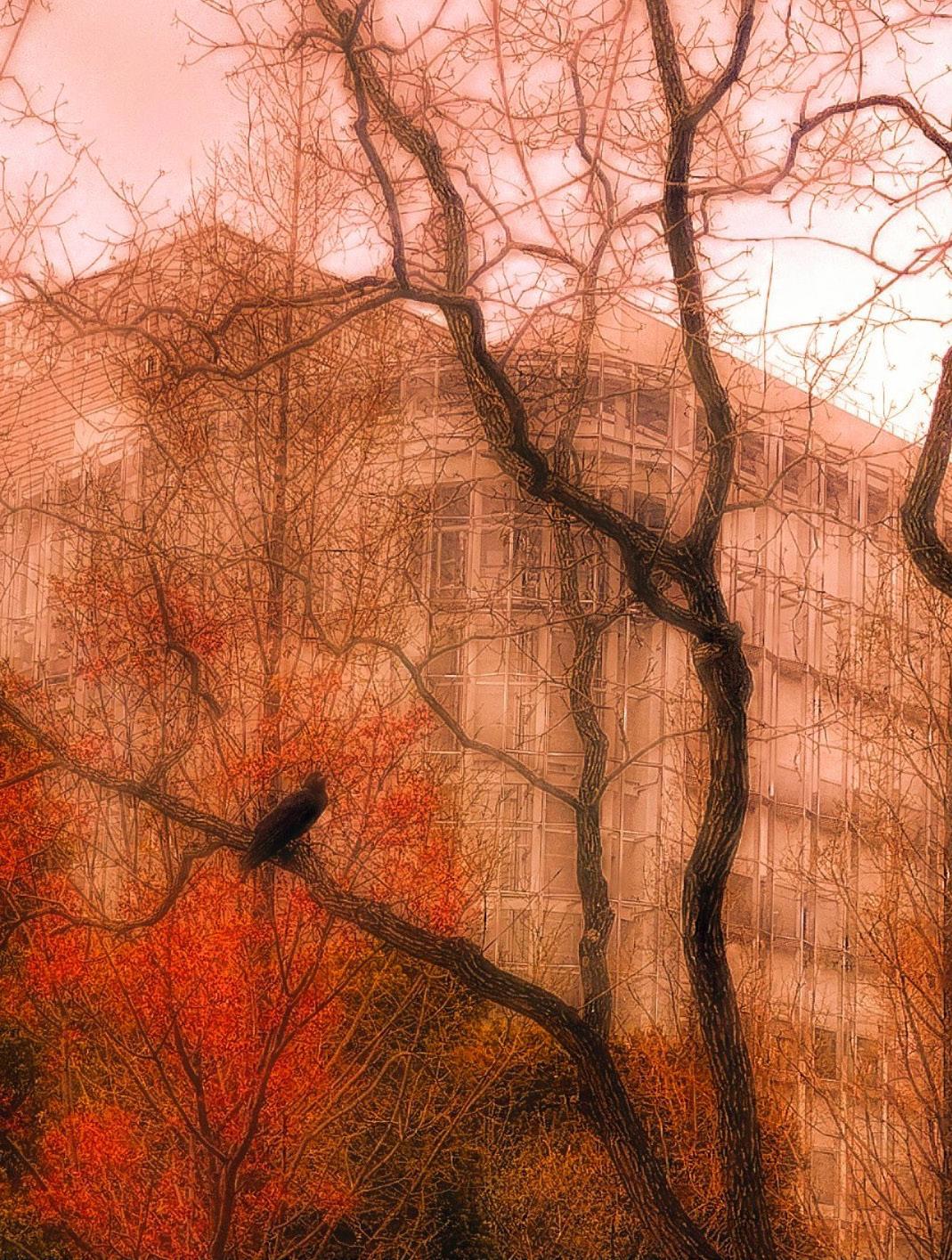
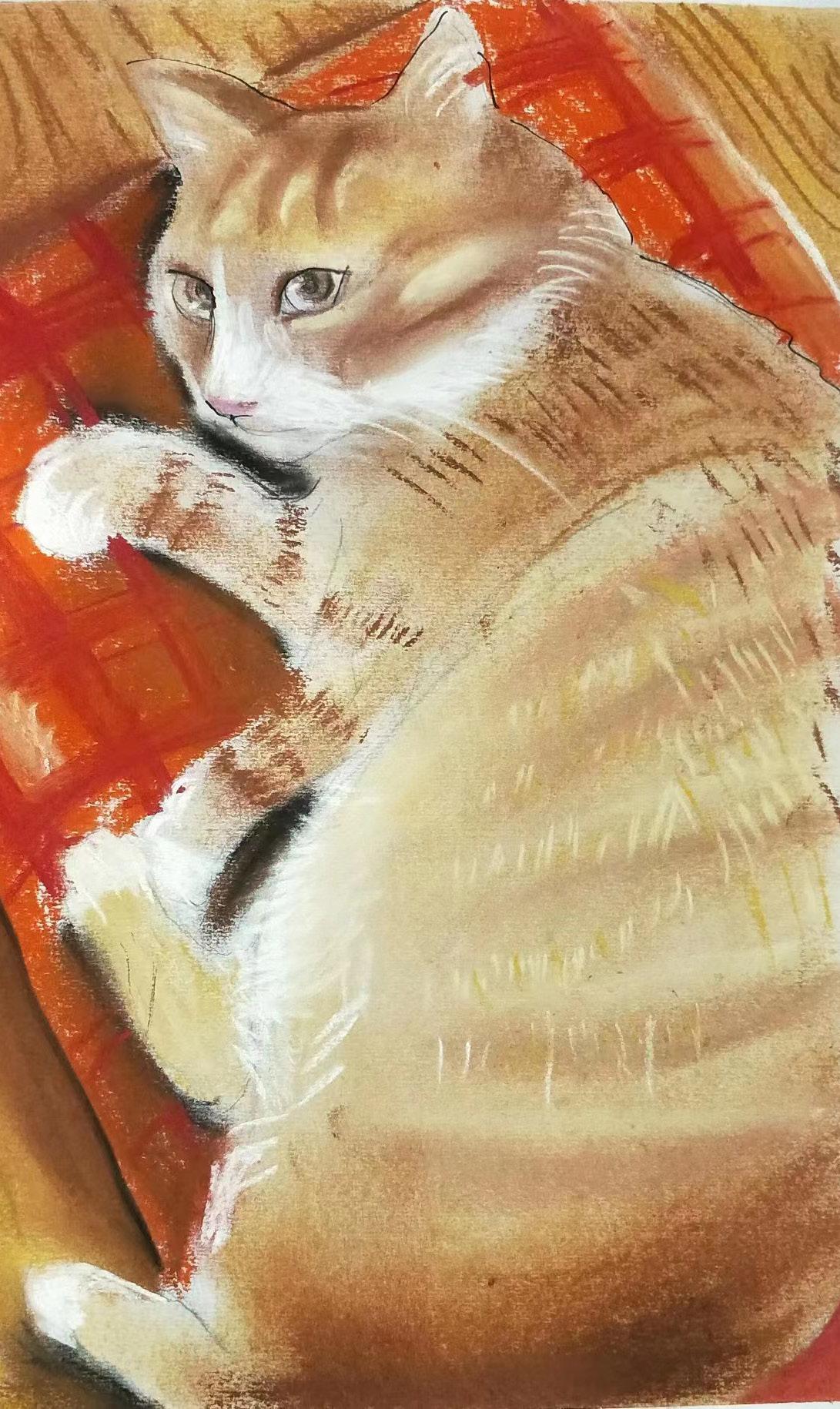
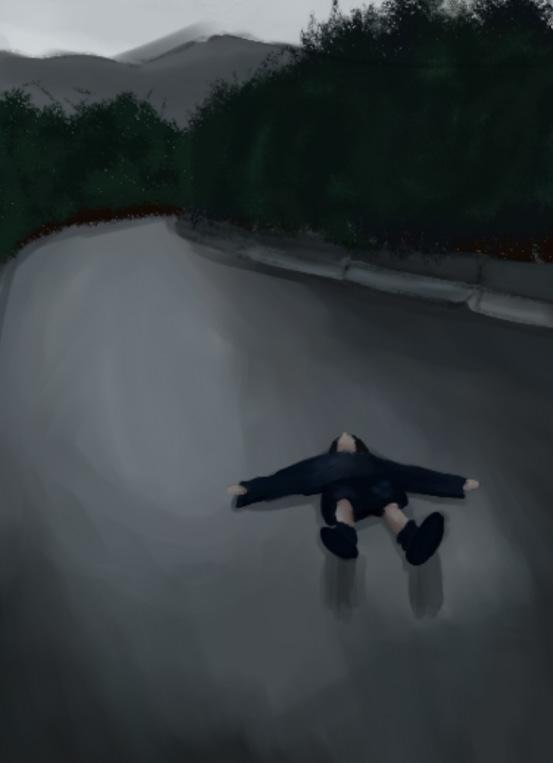

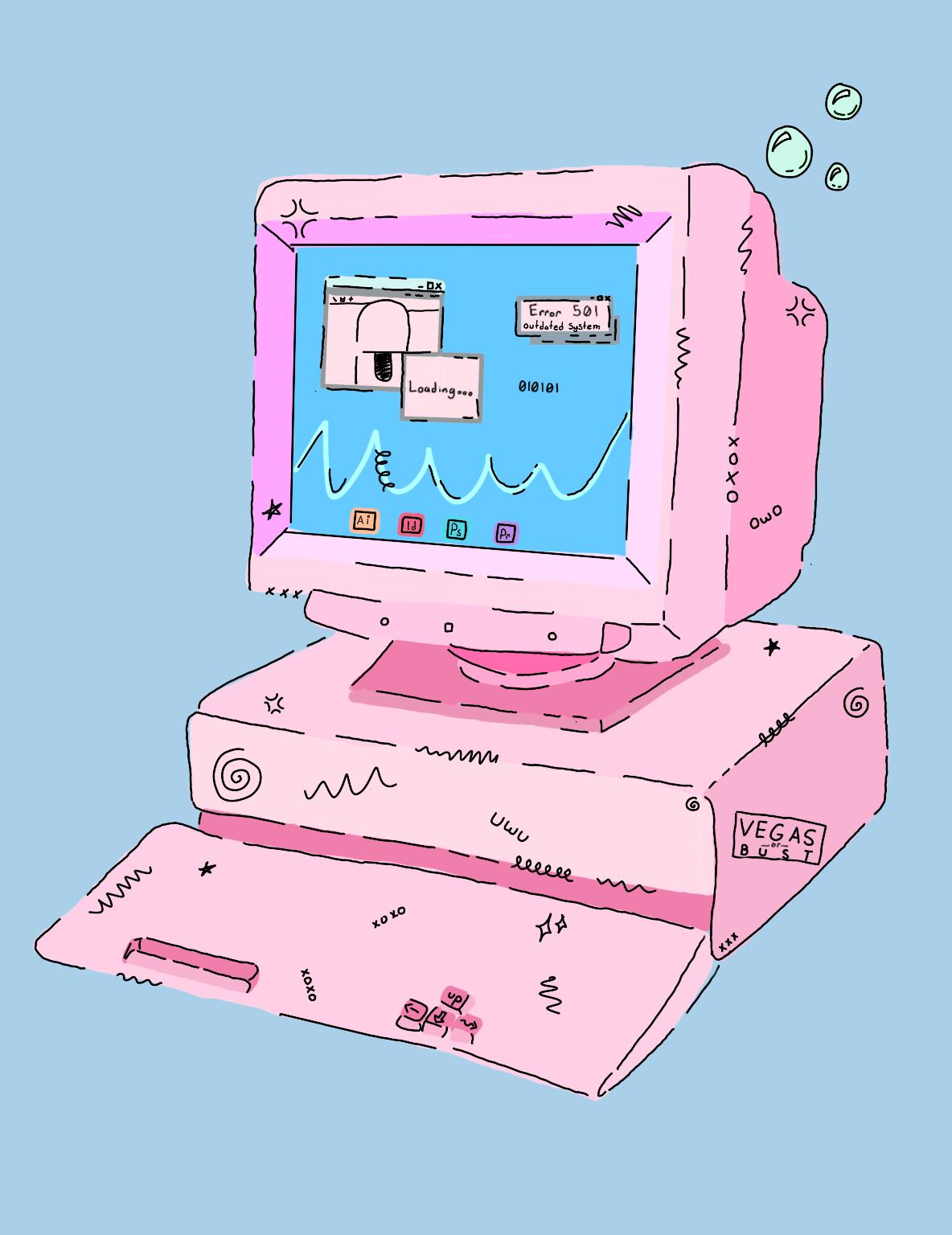
In the southern sky, the head and shoulders of the author floated giant and translucent: a light blue outline of a man.
Darren looked up at him. “Just because I’m your character doesn’t mean you need to make my life miserable, you know,” he said. “I’m not making your life miserable; I’m giving you adventure and conflict. Adventure is good. And conflict makes a story interesting,” the author protested.
Darren replied, “I think I would know if my life is miserable.”
The author shrugged. “Writers create conflict for their characters. I
The keyboard stopped its noise, and words shot out from the sky, whizzed past Darren and Lula, then tore back to the author. The two characters barely had time to jump out of the way when the black Times New Roman came barreling past. Still, Darren managed to catch what it said.
“It said, ‘Suddenly, Darren and Lula noticed an ogre in their path,’” he told Lula. They looked up, and sure enough, there was an ogre standing smack-dab in the middle of the dirt road they were on. Darren turned to look south toward the author. “This doesn’t make sense,” he protested. “There hasn’t been a single ogre in the book up to this point — from when we left the village until now — and now we
shot a spiteful glance at the author, then walked to the side of the ogre. “Hey, Mr. Ogre? Uh — me and my friend here need to get through, so… could you maybe step to the side?”
“Lula,” Darren said, “You’ll be killed. Monsters don’t negotiate.”
“Well, maybe this one does,” she retorted. Turning back to the ogre, she continued, “So, I think you were about to let us through. Could you do that please?” She batted her eyelashes for effect.
The ogre responded with another roar, even angrier than the first. “Uoagghhaar!” It pulled a giant, two-bladed battle ax from a sheath on its back. “Oguuaaarrrghhh!”
The two characters grabbed their weapons. Darren unsheathed his sword and Lula pulled her bow off of her back. As she pulled back the string with an arrow, she asked Darren, “Plan?”
am a writer, and you are my character. Therefore, I must give you conflict.”
“I don’t like that logic.” Darren said as he crossed his arms over his stomach.
“Tough.” The author smirked. There was a brief moment of silence. Then, Darren heard the clickity-clack of the author’s keyboard.
“Now what?” Darren groaned. “Yeah,” piped in Lula, from beside him. Lula was the side character the author had created for him. At first, Darren had found her irritating, like everything else his author wrote — but throughout the book-writing process, he’d grown used to her. Now, they were sort of, almost, friends.
find one conveniently blocking our way to the dragon? This is not conflict, this is nonsense! Why is it here? What is its motivation? Why doesn’t it want us to get through? I doubt you even know!” He huffed and glared expectantly at the author.
“Oh, you’re the character,” was the author’s response. “You’ll find out as the story progresses.”
“Yeah,” Lula retorted, “when you figure it out yourself.” Darren looked at her approvingly. Lula never ceased to surprise him.
“You brought this on yourself,” the author told them darkly as his keyboard clacked, words zipped past the characters, and the ogre began to walk toward them.
“Grahgghhuogh,” roared the ogre. “Oh, come on,” groaned Lula. She
“Frightened Mice Maneuver,” he told her. Lula nodded. ‘Frightened Mice’ was one of the many strategies Darren had invented, uncreatively named, and taught her. She fired her arrow at the ogre before putting the bow on her back again and pulling out her long dagger. The two characters scurried back and forth around the ogre like rodents (hence the name of the strategy), slashing at the monster only a little at a time, but moving so quickly and unpredictably that the ogre never had a chance to hit them with its slow, heavy weapon. After many minutes of darting in, out, and around, the ogre fell to the road with a thud. The characters winced. Darren grabbed the ogre’s feet and dragged it off the road.
The keyboard clicked. Words whizzed past Darren’s head. When he read them, he was relieved to find they did not suggest a certain doom. “‘Having defeated the loathsome ogre, the two young
THE TWO CHARACTERS BARELY HAD TIME TO JUMP OUT OF THE WAY WHEN THE BLACK TIMES NEW ROMAN CAME BARRELING PAST.
adventurers continued on their journey,’” he read aloud. He felt his feet move forward down the path. It was always a detached sensation when the author controlled his body.
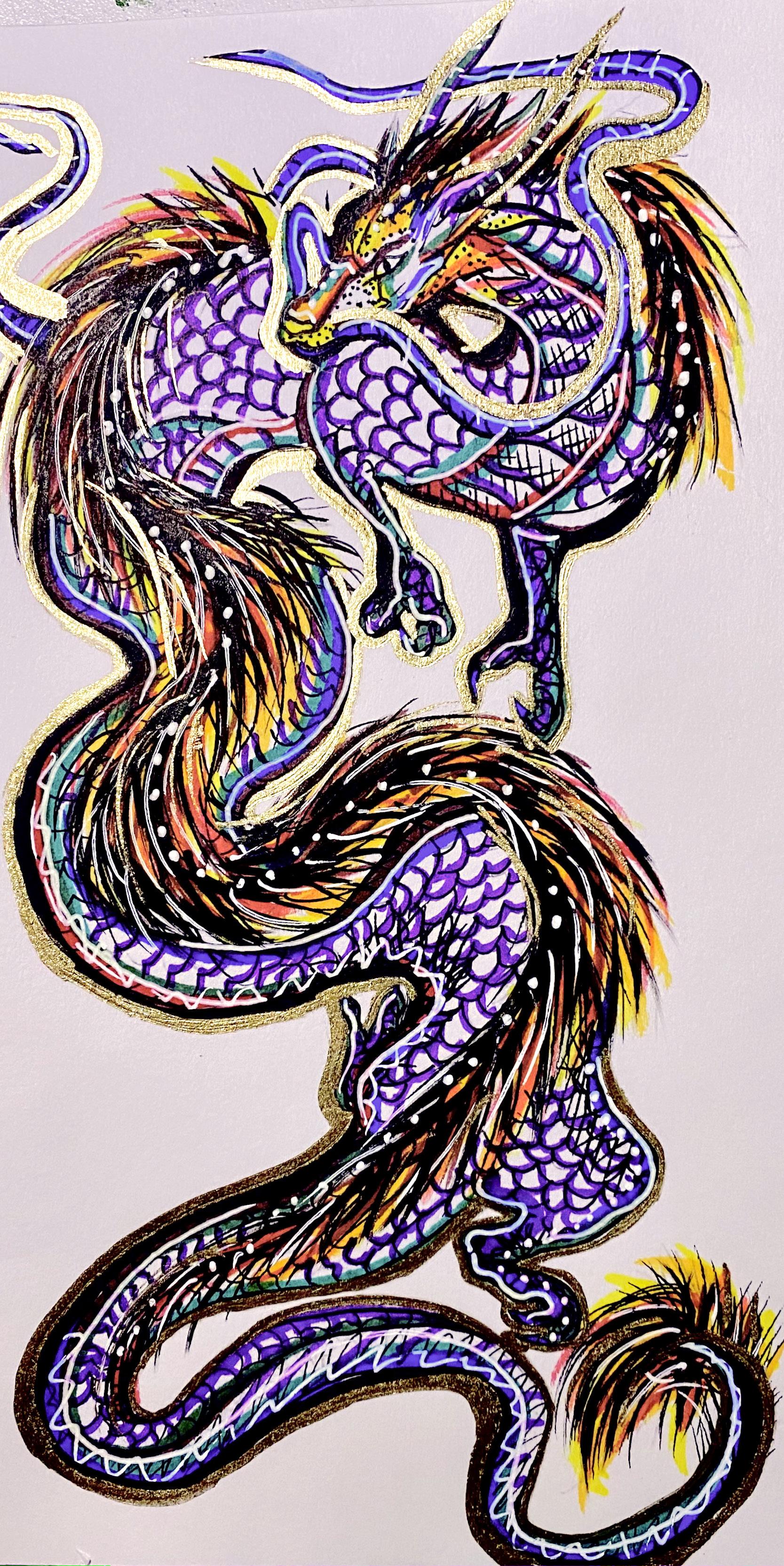
“I guess we’re walking now,” Lula said as she strolled alongside him. The midday sun beat down on their backs as they continued down the dusty road. The keyboard clicked and words shot by, again. A huge stone building loomed in the distance. It had a tower at each of its four corners, but the main roof was a gigantic dome. “What’s that?” she asked.
“I guess we’ll find out,” Darren said. As they approached the grand drawbridge, they saw a sign that said:
Dragonmore Castle — Enter if you dare!
“Is that cheesy or what?” asked Lula, rolling her eyes. Darren laughed.
“I dare,” he said as he swung open the door. It creaked on its hinges, an ominous sound. He stepped inside the castle. Huge scratch marks covered the floor. “Follow me,” he told Lula. She gulped at the sight of the gouges in the stone beneath them, but kept going. They continued through the darkness until they reached a fork in the tunnel.
“Look,” Lula said, pointing toward a large arrow-shaped sign facing left. The words on the arrow read, definitely no dragons here!
“Come on, this way,” Darren said as he rounded the left corner. “And you’d better get an arrow ready.” He unsheathed his sword. Lula nodded and followed close. The two characters gasped as the tunnel opened into a massive room littered with coins, gems, and all other precious materials. This treasure could rival that of the richest king that ever lived.
“Look at all this stuff!” Lula said as she knelt to examine a chest of jewelry.
Darren frowned and said, “Lula, this is a dragon hoard. Do not put down your bow.” Lula pouted, but stood back up. Darren scanned the surroundings for any sign of the dragon. Nothing. The dragon had to be here somewhere. “Keep your eyes peeled,” Darren told Lula in a hushed voice. “And we’d better talk quietly. We need to keep the element of surprise, if we can.”
Lula nodded. “I agree!”
“I said quietly.” Darren rolled his eyes. He nervously glanced over the piles of treasure. Nothing was moving. Hopefully, that meant the dragon hadn’t heard anything.
Minutes passed. Darren and Lula crept around the enormous chamber, examining every alcove and pillar in the ornate wall for a glimmer of scales or puff of smoke. After searching for what felt like an eternity, Darren and Lula had still found nothing.
castle, that does not help anything. There have to be places we haven’t looked. For example… underneath all this stuff!” He leaned over and began digging through the treasure with his hands.
Lula looked at him from where she now sat next to the plates. Her eyes lacked their usual energy. “It’s a waste of time, Darren. The dragon isn’t here.” She rested her chin in her hand.
Darren heard himself chuckle as he sifted through the jewels and coins at his feet. The dragon isn’t here? He thought in amusement. I’m not giving up that easily. After digging past three necklaces, a golden goblet, a silk pouch filled with rings, and countless other valuables, he stopped short. The dragon isn’t here… “The dragon isn’t here!” he said aloud.
“That’s what I’ve been trying to tell you!” wailed Lula.
Darren jumped to his feet. Because he was indoors, he could no longer see the author’s form in the sky, but
“This is not funny!” Darren shouted back at him.
“It might be a little funny,” the author replied.
Darren was too busy fuming to see the words as they rushed through the south wall and past him, and he was caught off-guard by Lula’s startled scream. He whipped his head toward her and found her scrambling away from a massive red dragon. The dragon must have been six times her height. Its head nearly brushed the high domed ceiling of the room. The dragon’s body was so long that it could not hold its tail out straight without bumping the wall. “Oh dang,” Darren whispered, before he charged.
“Thanks, I guess?” he called toward the author as he pulled his sword out of its sheath in one swift motion. Then he saw Lula. She had dropped her bow, and when she scrambled away from the dragon, she failed to take it with her. The dragon was standing over it now; trying to get it back would be suicide. “Don’t just sit there, find something to fight with!” Darren shouted at Lula.
Lula gave a sharp, quick nod. She ran toward Darren, scanning the piles of treasure beneath her feet. “I can’t find anything,” she told him breathlessly when she arrived.
Darren pulled a sword from the pile near his feet (the dragon probably liked it for its jewel-encrusted handle) and handed it to Lula.
“We should just stop looking,” Lula whined. “The dragon’s clearly not here.” She sat down on a pile of silver plates, then shrieked when they slid out from under her.
Darren sighed and sat down on a much sturdier golden shield. “Well, if we stop looking, then what do we do? Leave? How would that help?” he asked. When Lula didn’t answer, he continued, “Our quest is to slay the dragon. If we leave the dragon’s
he charged toward the south wall regardless. “You didn’t make the dragon!” Darren shouted toward the author. “All this time we spent searching, and the dragon is not even here! How are we supposed to slay the dragon, if there is no dragon!?”
The author’s voice came through the walls of the castle, though the stone made it echoey. “Oops. Sorry about that,” he laughed.
“Thanks,” Lula told him. “Plan?”
“Waterfall Maneuver,” he replied.
“Waterfall?” Lula asked, puzzled. She had reason to wonder.
Ordinarily, Waterfall would get them killed in a situation like this.
“Waterfall!” Darren declared. “But listen for any extra commands. And we stay here, by the south wall.”
Lula nodded. “Whatever you say.”
WORDS SHOT OUT FROM BEHIND THEIR BACKS, AND THE DRAGON TURNED TO FACE THEM. IT ROARED, THEN ATTACKED. LULA SCREAMED. DARREN WAS PRETTY CLOSE TO JOINING HER.
Words shot out from behind their backs, and the dragon turned to face them. It roared, then attacked. Lula screamed. Darren was pretty close to joining her. The dragon raised one front foot and swatted at the characters like they were puny insects. Darren stabbed its foot, and it roared.
“Now you made it mad,” Lula told him.
“I don’t think you can kill something without making it mad,” he replied. He turned to whisper quickly as words shot rapid-fire from behind them, “But I think I have excited someone else, too.”
With each string of Times New Roman words that emerged from the wall, circled around, and flew back to the author, the dragon attacked. It was all the characters could do to not get slaughtered, and the author’s words were not helping. One of the strings made Darren trip over his own feet (even though he wasn’t moving). With another string, his sword was knocked out of his hand (by what, he didn’t know). But he needed his hands free anyway. He told Lula, “This is where the plan really begins.”
“I’m listening,” she replied.
“Grab onto me, and don’t let go,” he said. “This might be a bumpy ride.” Lula took a firm hold on his wrist. A string of words passed, and the dragon opened its mouth — it was about to breathe fire. Lula glanced at Darren nervously when he didn’t move. Darren stood as still as a statue, legs bent, arm out, waiting. The string of words barreled toward them again, heading back toward the author. Darren leaped toward it and grabbed it. The loop of the lowercase e at the end of the sentence made a perfect handhold. Lula yelped as she was flung into the air. Darren was terrified, too, though he would never show it.
In an instant, the words neared the
wall. Darren hoped that because the words had passed through it before, he and Lula could too. Miraculously, his plan worked. Darren and Lula passed through the wall and flew south through the cloudless sky at breakneck speed. “We’re leaving the story, Lula! We’re free!” Darren yelled over the roar of the wind. He looked up at the author, who was thoroughly confused at what was going on. Wind pummeled past Darren’s head, and he struggled to hold onto the e. Against his better judgment, he looked down and saw the ground far below. He tried not to imagine what would happen if they fell. The words approached the edge of the sky, where the author’s blue form hovered. The sky flickered, glitched almost, and the words and characters passed through it. A brilliant flash of blue and white light seared into his eyes,
same way the author used to.
“Lula,” Darren called to her.
“Darren!” she squealed. She started toward him, then gasped when she saw her hand. “I’m blue,” she said.
“Yeah, I—”
Darren was cut off by the author, “You—w-why are—how are—you in my apartment?” he asked, voice trembling with alarm. Darren opened his mouth, but found he had nothing to say.
Lula turned to him, ignoring the author. “Darren, what’s going on?” she asked. “Where are we?”
Darren said nothing, but reached his hand toward her. He touched her arm, and the blue flickered the same way the edge of the sky had: almost like a glitch.
“Oh, weird,” Darren breathed, an intense expression on his face.
and Darren gave a shout. The words he was holding onto were suddenly gone, and Darren tumbled onto a hard, wooden floor. When Darren opened his eyes, he found himself laying in front of a worn green sofa in a small space with a window and an old wooden desk with a computer monitor on it. By the desk there was a chair, and in the chair sat the author, with a completely flabbergasted expression on his face. Darren had never seen the author in color before, and it was strange. Darren stood up. Before he could say something, he heard a noise to his left. He looked, and there was Lula — or at least sort of. She looked the same as usual except she had a light blue outline over her, the
“What’s going on?” the author hissed. Darren realized he was still touching Lula’s arm, and quickly dropped his hand to his side. Awkward.
The author looked at his computer screen. Darren and Lula looked too. It was open to what Darren assumed was the novel. The last line read, Darren and Lula disappeared, as if by magic. After that, the cursor sat blinking, awaiting the next line. Unfortunately for it, there would never be a next line — because the characters left the book!
Darren felt lightheaded at the thought.
“As if by magic,” Lula read aloud. She giggled.
BY THE DESK THERE WAS A CHAIR, AND IN THE CHAIR SAT THE AUTHOR, WITH A COMPLETELY FLABBERGASTED EXPRESSION ON HIS FACE.
The author frantically tried to backspace that line, to make it so the characters never left, but it wouldn’t work no matter how many times he pushed the key. He tried to send them back. He typed, Darren reappeared just as suddenly as he had disappeared. Darren didn’t go anywhere, and the text blinked, then vanished from the screen. The author scowled. He tried the other character. Lula reappeared just as suddenly as she had disappeared. Darren nearly laughed. Of course nothing would happen. Nothing happened when the author tried sending him back — why should it work with Lula? He turned to tell her so, but she was gone.
Darren looked around for Lula, but she was nowhere to be seen. His stomach dropped. He knew where she was. Darren ran to the author’s chair. He peered over the author’s shoulder at the screen. Where the line about Darren reappearing had blinked out of sight, the line about Lula reappearing still stood. Darren turned to face the author.
“She’s in there, alone with the dragon, isn’t she?” Darren asked him.
“She’ll be fine,” the author insisted. “Not with your constant interruptions, she won’t. Every time she draws her bow when you’re around, the arrow falls flat. But when we practice while you’re at work, she hits her target.”
“You practice while I’m at work?” the author had to ask.
“Well, what do you think we do all that time?” Darren responded. “And besides, you made the dragon way too big for anything under an army to defeat.”
“It needs to be big enough that it will be remarkable when you defeat it,” the author argued. “That’s what the writing book said.”
“It needs to be small enough that
we can defeat it,” Darren retorted. Intending to make another argument, he pointed at the line of text on the screen, intending to touch it. He didn’t expect his hand to pass right through the screen. He glanced at the author as both of them realized that Darren could go back into the story whether the author’s keyboard controlled him or not. Before he even knew what was happening, the author shoved Darren toward the monitor, and managed to push his head through. He hadn’t expected that to happen, either.
Darren was immersed in a sea of blue light. He couldn’t see anything but blue when he looked back, but he felt the author holding him, trying to push him into the story. Darren pressed his hands against the desk and the wall to push himself out of the monitor. He kicked at the author, and finally, the author’s grip weakened. Darren shoved himself back into the apartment and tumbled back onto the floor. He crashed against the sofa.
The chair creaked as the author stood up. He was an imposing figure, large and tall. Darren also stood. The author promptly picked him up. Darren kicked away immediately. He pushed off the author’s chest with his foot, launching himself into a backflip and landing on the floor with hardly a sound. The author staggered backward and crashed against the sofa.
“You made me a fighter,” Darren told the author. “You should know better than to fight a dragon slayer.”
“You never did slay the dragon,” the author said.
“I could have if it was realistically sized!” Darren retorted.
In response, the author snatched up Darren’s ankles with both of his large hands and dragged him
toward the desk. Darren called, “You made this a fight, not me!” as he twisted his body around to grab the author’s legs. He gave a sharp tug and the author’s feet gave way, making him fall on top of Darren. Darren grunted. He probably should have thought that out better. He squirmed to get free. The author tried to pin him to the ground, but Darren managed to shove himself between the author’s arms.
“Why are you doing this?” Darren asked as he stood.
“You shouldn’t mind,” the author replied, picking himself up from the floor. “You’re not real.”
Seriously? That was what it all boiled down to? Darren slapped the author in the face. “Did that feel
real?” he demanded.
The author rubbed the red blotch on his cheek and sneered. He said nothing, but stalked back to the computer. He furiously typed something. Darren looked to see what it was. Lula appeared back in my apartment with a pop.
Darren heard a really loud pop, and suddenly Lula was back. “Darren!” she exclaimed.
“You’re back!” Darren said. It sounded super corny coming out of his mouth, but it would be weirder if he didn’t say anything. He turned to the author. “Why?” he inquired. The author chuckled and looked Darren in the face. “Because I can’t beat you.”
“Huh?” Darren responded, startled. The author typed some more. Lula shoved Darren into my computer, he wrote.
Oh. So that was what the author meant. If you can’t beat a warrior, but have another warrior on hand…
Darren’s train of thought was interrupted by Lula slamming into him. Her blue outline flashed from the collision. “Sorry!” she yelped. He could tell she was trying not to obey the author’s words. She moved jerkily and mechanically. The author kept typing, directing Lula in what move to make. There was a flicker of blue light every time something touched her.
Lula kicked at Darren’s head. “So, did you slay the dragon?” Darren asked as he ducked and rolled away.
Lula shook her head. “No.” She punched toward him.
Darren grabbed her fists. “Why not?”
“Maybe the fact that it’s huge, and that I didn’t have any ranged weaponry, since it was standing over my bow.” She twisted out of Darren’s grasp and backed up. “Not that I would have been able to with my bow anyway. Arrows aren’t nearly big
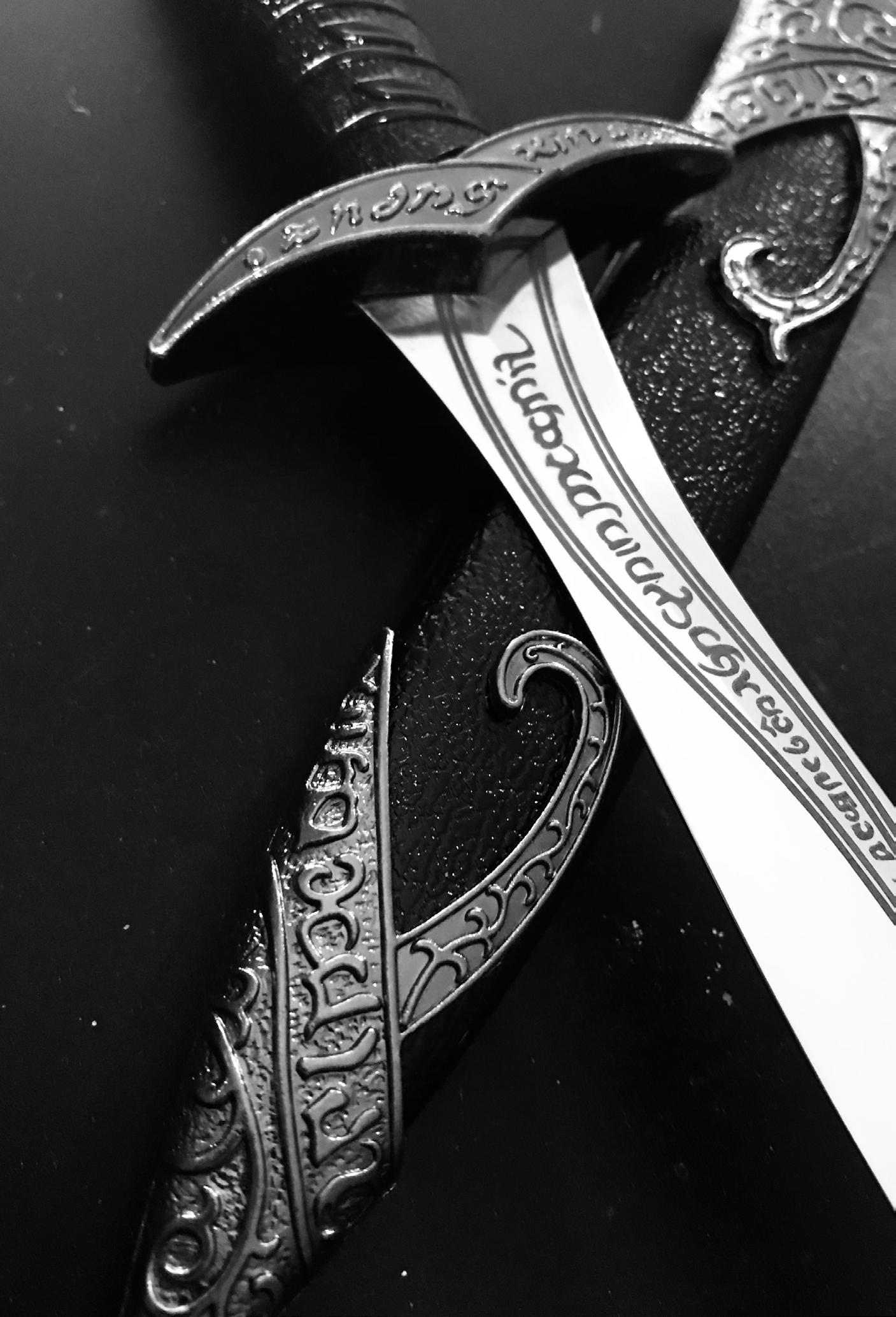
enough to hurt that thing.”
“Yeah,” Darren agreed. He braced his feet.
Lula charged, and leaped toward him. He crashed on the sofa from the impact. “Probably nothing short of a ballista could even scratch it,” she said as she pinned him against the worn green upholstery.
Darren nodded. Lula grabbed his hair and tugged — hard. “Really sorry about that!” Lula apologized.
“It’s fine,” Darren said as he tried to pry her fingers out of his hair. She yanked his head back and he fell off the sofa. Darren could see the author out of the corner of his eye.
He seemed to be enjoying this showdown between his two characters. His tongue poked out of his mouth as he typed; his eyes were wide and wild.
Lula flipped Darren so he lay on his stomach. She pressed her foot into his back, still holding his head up by his hair. “Oh, that hurts,” Darren groaned.
“I’m sorry!” Lula cried. She released her hold on Darren’s hair, then lifted him into the air. “Your hair’s super slimy and disgusting, by the way,” she informed him.
“Gee, thanks. Since when can you lift me?” He kicked to get loose.
“Normally, I can’t.” She nodded her head toward the author. “It’s quite an interesting change, having him make me a better fighter.” She spun Darren around so that his feet pointed toward the monitor. The author slid his chair to the side so that Lula could get through. Darren hooked his feet under the desk so he couldn’t be pushed through the computer. Lula spun him around again, so his head was facing the computer. With the author out of the way, Darren hastily typed, Lula stopped.
Lula stopped. Darren fell to the desk with a crash. They both heaved a sigh of relief, until the author charged toward them and snatched the keyboard away. Lula resumed shoving Darren into the computer, he typed. Lula reached for Darren, but before she could touch him, he scampered across the small room. He stood on the sofa.
“Come and get me!” he shouted.
“I don’t want to!” Lula cried as she ran to the sofa.
“I mean you!” Darren called to the author. “If you want me in your story, put me there! I could fight Lula all day. I do, actually, in our practice fights. And no matter how much you help her with your keyboard, I will always beat her! I win every fight we have.”
Lula pounced to grab his ankles. Darren jumped away. She looked at him in annoyance. “I’m bluffing,” he whispered. She nodded.
“The only way you will ever win is if you come over here and help her with force,” Darren told the author as he dodged Lula’s kicks toward him. “But of course I understand if you want to stay behind your little keyboard. Some people aren’t strong enough to fight for real.”
That made the author plenty mad. He charged toward Darren. Darren ricocheted off the wall above the sofa, landed a few feet beyond Lula and the author, and ran to the
keyboard. Lula, with a burst of superhuman strength, swiped the author off his feet. Just like that, the author fell to the floor. When Lula started toward Darren, he added, She also stopped trying to shove Darren into the computer.
The author jumped to his feet. Lula dove after him, but to no avail. Darren stood over the keyboard, guarding it from the author. The author came up behind him and tried to reach for the keyboard. Suddenly Lula jumped onto the
typed. The line of text disappeared. Lula tried to reach her nose, but her tongue remained — as it always had — not quite long enough. She let out a whoop and laughed. Then, she pointed to the screen. “Hey, look at that,” she said.
Darren looked, and right behind the Times New Roman type on the screen was the huge room with all the treasure. In the room was the dragon — and the author, who was understandably freaking out, even
author’s back with a mighty battle cry. “AAAAAAAAA!”
The author stumbled backward, and Darren was able to type. Lula suddenly knew all about a new plan that Darren had invented: The Cannonball Maneuver, and she could do it as well as if she’d practiced it a bajillion times. Darren unplugged the keyboard and picked it up. “Cannonball Maneuver!” Darren shouted. He ran past Lula and the author, and slid the keyboard under the sofa. Lula jumped away from the author. Each of them took one side of him. They both ran up, and together they lifted him into the air. They thrusted him toward the computer — through the computer — and into the story.
The blue outline over Lula flickered, then disappeared. She stretched her arm out in front of her and spread out her fingers. “I think — I think that fixed me,” she said.
Darren retrieved the keyboard. “Let’s test it. I’ll type something harmless,” he said as he plugged it back in. Lula finally became able to touch her nose with her tongue, he
though the dragon was just standing there.
“WAIT!” Lula exclaimed. “He’s — He’s our character now!”
Darren laughed. “Yeah!”
“What should we name him?” Lula asked.
“Hmm, I’m not sure…” Darren replied.
Lula giggled. “What about Jeffo?” she suggested.
“MY NAME IS JOHN!” the nolonger-an-author shouted.
“Jeffo it is,” Darren agreed. He sat down at the desk chair and Lula stood just behind him, looking over his shoulder.
“Should we make him slay the dragon?” she asked.
“Yes,” Darren replied, “But he’s not ready. He gets to start at the village and go through the whole story.” He grinned.
“Ooh! Yeah!” Lula exclaimed.
Darren began to type again. John, who was now named Jeffo, found himself in a quaint village …
OF THE CORNER OF HIS EYE. HE SEEMED TO BE ENJOYING THIS SHOWDOWN BETWEEN HIS TWO CHARACTERS
I sat on a quilt, its pattern green and pink. It was the quilt that my mom and I used to take on picnics with our dog on that hill so green, she so golden, the sky a blue expanse. It was the quilt, where I sat with an old friend and tried to tap into an energy, but she would not comply. We burnt a hole in it, and it was mistaken for a cigarette. It was the quilt where earlier this spring I had a coffee.
Then I sat on this quilt with a stack of equations, and made some progress, And studied a bird briefly. Was it a sparrow?
A finch?
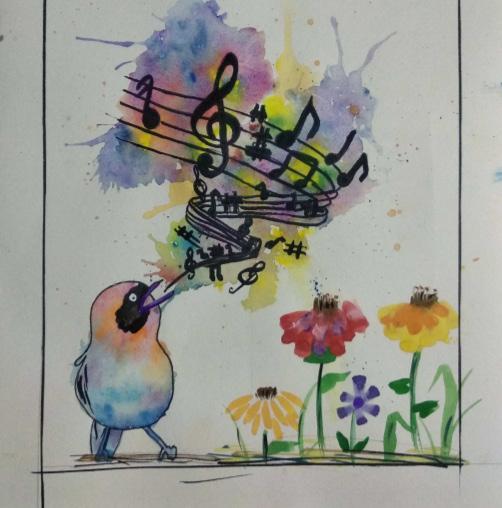
My knowledge did not reach. I thought about Darwin, the great explorer, wondering at the Galapagos. And his books, his studies on birds. I wished I could read them, to be of a university. I went inside and did some exploring of my own.
BY SOPHIA GRIMSLEY, ACWORTH, GAI am Woman hear me roar
Watch me soar
The sky is torn
Open Thunder claps highlighting The rain pelts, falls in sheets Soaking my skin, hair suctions
To my face
My throat drinks, water
Pouring over my tongue
The lightning strikes Silhouetting jagged wings Sprouted from my back, beating the Wind
I am a storm
A beast
A monster
A hurricane angel
BY ÁINE BROWN, MARSHALL, NCTic-tac-toe with a pen, Standing ovation, What uses the bed when the sounds pass, and strangled, the voices, looming over my face, paralyzing my legs, I cannot speak, I lean, I pour out stale water, I try So hard but it never works, I shut down, jams in my bronchial tubes, like a persistent cough, a knot, a suspending drop of Windex. How do I form words? My mind blanks, I listen but you lost me, you lost me, why am I here?
BY VICKY ZHOU, ALEXANDRIA, VASweet, fulfilling love: We have given it all but Are still craving more
BY ANTONIA PANAGIOTOU, LIMASSOL, CYPRESSWhen the wave rushed through It broke into all my coves
All my gaps, my irregularities Day and night, it crashed With drowning force Spitting foam into the wind
And from my skin fell dirt, rocks, dust Plummeting into the roiling waters And out into the storm
And when the wave slowed
All the smooth stone was jagged Gaps and edges and scars
And holes, so many holes
With salty streams leaking out I was watching TV late at night And I broke down until I sank And when I rose, the sun was out
But still, in my darkest corners
I hear the echoing rush of water Down where no light can reach In some new cove behind my eyes
And I think,
It’s true, nothing moves But everything erodes..
BY ELENA H., WEST ORANGE, NJI trace Mother’s hands with my own, the soft pads of my thumbs falling victim to the deep fissures running over her palms. Her hands are a map of her adventures, a humble reminder of the love she marked on her children.
The blisters that crown her hand tell a titan’s tale, of how she held up the sky to watch her daughter run free. The worn skin of her once fleshy fingers are a testament, to the countless times she siphoned night terrors from her daughter’s dreams, smoothing back matted hair and gently caressing youthful cheeks. The scars on her palms are
remnants of the needle and thread she used to patch the doubts in her daughter’s mind. Mother’s taut skin almost bursts at the seams: a reminder of the protection she bought for the easy price of flesh and blood. And as Mother raises her head to the night sky of my window, I see the moon reflected in her eyes. She keeps watch through the night, the constellations in her irises veiled with sleep. Mother wanes with the moon, her luster fading with every waking minute.
I never understood the crazy things you do for love, yet I was the sun to my mother’s moon. And the moon eats all the darkness in this world, dying every day so the sun can live.
BY ALICE XIE, VALENCIA, CAThe day I forget my language will be a mournful day faceless people will wrap their hand around me and the hot sun will disintegrate my name.
Thousands march under scorched desert sky,
The Kuwaiti oil fires igniting the dark overcast of harsh chemical-smelling smoke
Thousands of men under objective destroy and dominate Their minds blank with conditioning, they carry out their orders without fail
These men of ductile plastic bleed for oil and wealth. Their soft polymer heated and formed into an unthinking, obedient, instrument of destruction
Placed anywhere and everywhere at the will of the corporate god. Their stiff boots march wherever the money is,serving the greedy and invisible they huff their heroic propaganda to upkeep the denial of impending doom.
But these molded plastic play pieces can only pray to die in battle, For there is no world for them beyond the game, only the promise of a landfill these toy soldiers void of the environment they were so expertly molded for are deemed useless their makers toss the spent plastic aside once it’s served its purpose. In their confusion the toy soldiers wallow beneath the blood soaked sofa cushion of society.
Forgotten by those they fought for and the makers who cared so much to craft them so
BY BO BUCHANAN, FEDERAL WAY, WA BY ANONYMOUSin your youth, you danced youngest daughter, wild, fun, free then sudden darkness, a father’s betrayal dark, cold, barren with no one but your thoughts far away memories of the golden era the choir of birds, the gossiping trees, the blanket of stars out of the blackness appears your savior, his face beaming sky blue eyes staring at you with such utter adoration he is what you dreamed of, hoped for, god of the skies fighting by his side is exhilarating battles under the sun to prevent the past, dreams at night of the future the final blow is struck and your knight becomes king and he brings you to his side, his shining jewel, queen you rule by his side and bless unions that mirror your own he visits the mortal lands frequently, but kings have duties who are you to question your king, your husband he saved you, gifted you the world, shown light in the dark you must visit him, tell him of your love, bear gifts but when you arrive, it is not your arms he is held in isn’t he supposed to be your king, lover, partner, savior why must he run to others, had you not given enough as the bitterness and grief takes hold of you heart people ask why the youngest daughter is no longer wild, fun, free
BY CAMERON GRUCE, KENNETT SQUARE, PANever move A mountain For anyone. Because they’ll Still seem To complain About
As the battlefield raged on; Tattered with spears, A pathway to glory came forth. You took it alike Achilles, You took it alike Theseus, You took it alike Icarus, Just like the Heel, Just like the Veil, Just like the Sun, Pride was your greatest downfall.
BY ANONYMOUSBetween current and still
A trout’s pliant, stout body
Speckled with the most brilliant of amber
His back reminiscent of the hard granite he hovers over
A brook trout in a lone Canadian stream
Shrouded by the soft ripples, Until a midge or a caddis fly floats past his mottled frame
The trout indulges on these insects often, but this is different
A fly angler has stumbled upon this often unseen gem
And among a gorgeous fall backdrop
A fly fisherman has landed his first trout of the evening
With intent of release the trout is gently raised from the net
This trout’s body spattered with the triumphant colors
Of this late fall day, Condensation dripping off white tipped fins
Plopping onto soft orange pine needles
An emergent brook trout
Guided by a gentle human hand.
Returning to the everclear depths, His reflective essence of hues
Continues out of sight
Out of mind
Out of thought
BY MICAH NELSON, CANNON FALLS, MNI met Icarus in a dream, One faithful night, He told me his story, Of fame and fight, How just for a second, For less than a day, He touched the sun, But died anyway. He told his pain, His regrets and all, He warned me to think Before I fall. He told me a story, About a boy, Who flew to high And slept with the Koi. He told me the sun, Though it called for me, Apollo would never Let me be free
To touch, and squeeze And kiss the sun, Because that’s what loss

Dadeduls’s son. And last night, when we met, I told him a story, And he wept About a boy Who flew to high, Now he’s forever An idiot in the sky. But before he left, He cupped my cheek And kissed me so soft I couldn’t feel for a week, He pulled away, His smile so dear, And that’s when he Disappeared. But I met Icarus in a dream, He told me a story Of everything, How a little boy Who flew too high, Suddenly became the prince of the sky.
BY ALEXIS INEZ, SYRACUSE, NYI had a voice, That extended down the bank And into the depths below, Each chord traversed mountains, Seeped into sealed walls, It permeated.
I had a voice, it roused Set sail to the distant point, Reunited with moon-glow water, Air stinging with sea scent, my accent, Racing toward the tunnel end, It roared.
I had a voice, it wounded Strained to be sharp enough To excise those labels engraved on itself.
Hammered, hardened a softness Into a weapon, but is it really If the hands shake too badly to use it, It trembled.
I had a voice, it strengthened, Summoned tears from Those fluorescent lights Buzzing in hospital waiting rooms, Spun across the line Marking falling from drowning, Squeezed a hand so that Sweat mixed binds together To hold back from the other side, It pulled.
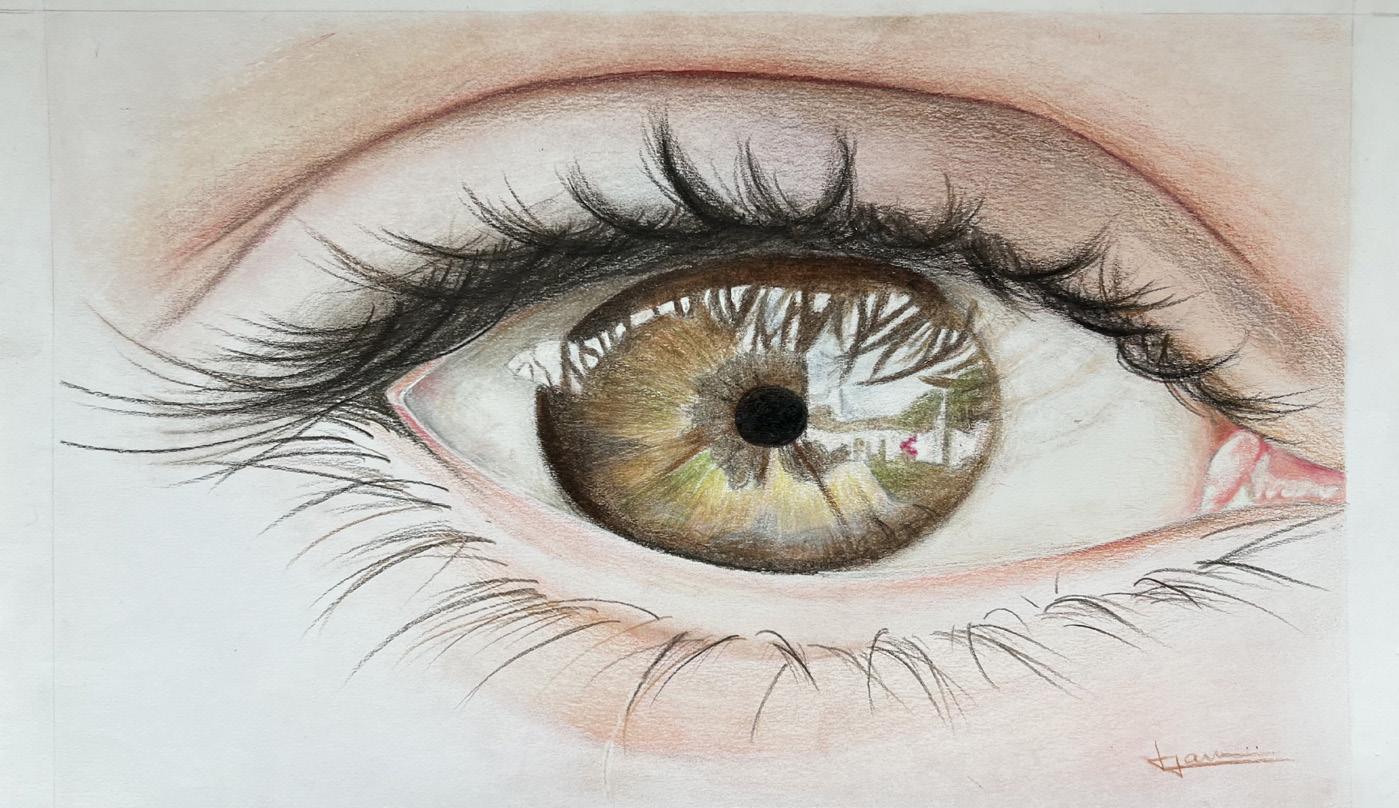
And even when that voice slips away From the realm I am tethered to, headed to I still had a voice, I still have that voice.
I am finding music not quiet after storm
I am rebirthing at my burial
I am feeling these old scars when I breathe
I am walking down railroad tracks, Pray, let them somewhere turn back, The weapon is shattered, I am forging something new.
But I have a voice that sings And now that’s all it has to be, My song creeps out of hiding.
BY JULIE HOWE, SAN FRANCISCO, CAShe would find later, in a grandfather’s forgotten store of nautical sights, a pair of eighty-year-old kid shoes, and later yet, a polished old brass-bound cabin door, and then a skeleton that was later to get stuck in a nitrate film, killed in the East Indies but advancing westland, crowding the deck of a clipper ship whose captain, her brother, steered her through the gathered seas and winds of last century. Her, with little snapping sounds, as of cold clay, should never reach the well-lit teashop, where the small tables shine so warm on the old pavement and the sliced fruit shows a heart of gold, lit with amber and sugar. If she were to stop not at the eyes, but to slide across the top of the skull, down the Chinese-black nape, then to drop down – how far? –in search of the crowd, the chocolate pool of the non-beings, the slaves of light, who wait on nobody, nothing,
and nobody’s desire. She would find herself no longer in a warm house, no longer an inhabitant of simple rooms, no longer a woman, a child, or an insect but in a room closed off from the world full of notes on the theories of relativity, stacked with sonnets and translations of Gogol, a calendar on the walls, a still-life of a flower utterly overlooked Having taken to the jungle, a hairdresser’s card shining in the pocket where the second marriage had been registered, to petal the crumpled roses, shave the ageing dandies, crinkling up their ears and curling their dog-like toes, steading with quiet paws, stooping, with the instinct of simple life, to the ear-worms of the corridor answering the sense of each note of the incantations of grief as a seashell, rubbing its forehead in the sand, flattens out, she and the oceans might wash over each other, should she dare leap into her eyes.
BY WILLIAM DU, CALDWELL, NJ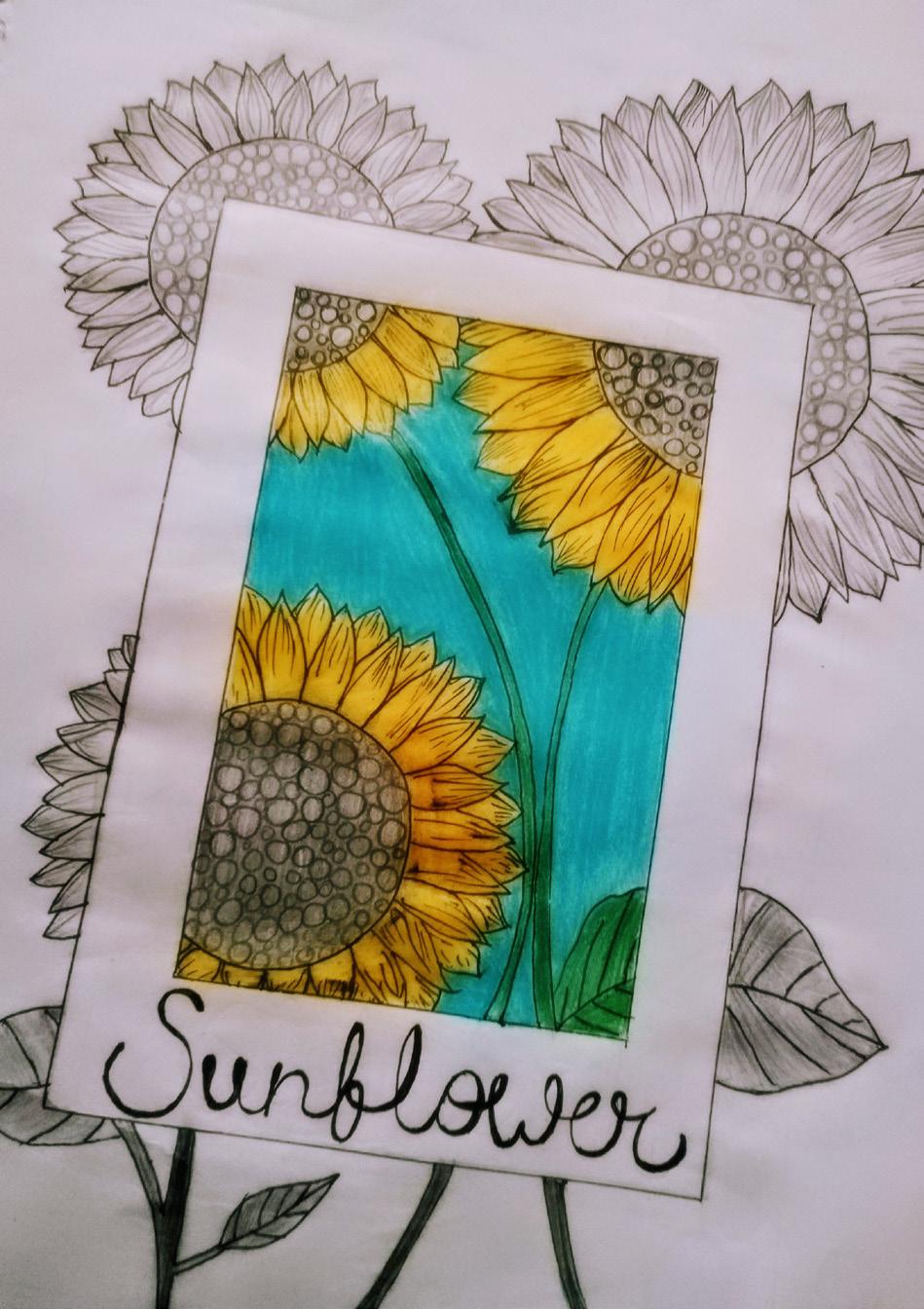

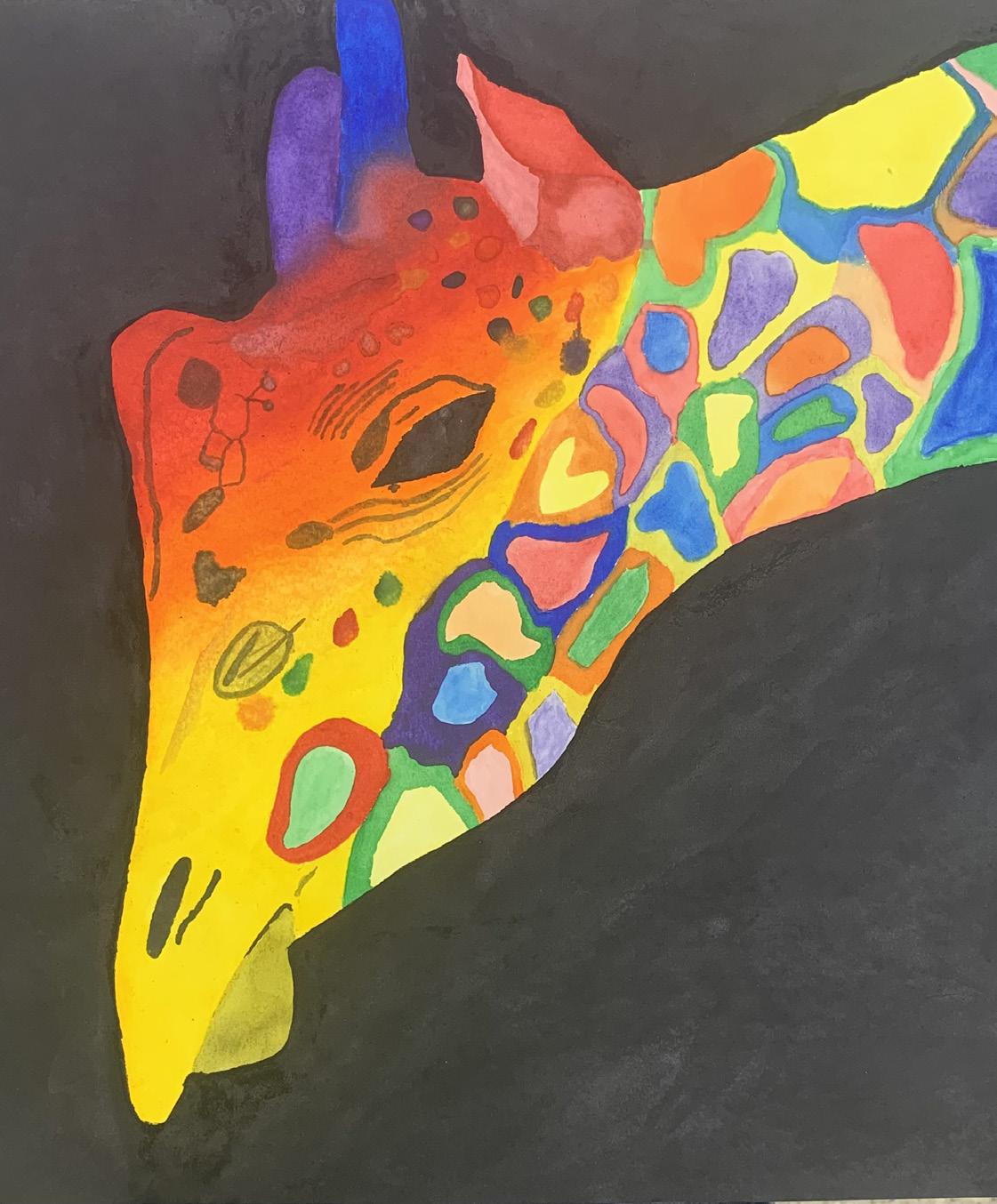
Alexandria Gorman, 6
Anonymous, 8
Lydia Quattrochi, 10
Oliver Laird, 14
Anonymous, 16
Ben Duran, 18
Justina W., 21
Anusha Yadav, 22
Emma Swope, 24
Cole Howe, 26
Lottie D., 32
Laurel Gordon, 32
Ananya Guha, 32
Ina Yoonseo Lee, 33
Isaac Hogan, 33
Angelica Hernandez Garcia, 33
Bethan Powell, 33
Em Haas, 34
Mysha Khan, 38
Sophia Melgarejo, 42
Karina Bliss, 46
Alex Cole, 48
Daejahmonni Tagger, 40
Yulisa Ma, 41
Sophia Grimsley, 56
Aine Brown, 56
Vicky Zhou, 56
Antonia Panagiotou, 56
Elena H., 56
Alice Xie, 57
Ela M., 57
Bo Buchanan, 57
Anonymous, 57
Cameron Gruce, 57
Anonymous, 58
Micah Nelson, 58
Alexis Inez, 58
Julie Howe, 59
William Du, 59
Isabella Liu, Front Cover
Grace McMann, 6
Tea Pavli, 8
Mele Barton, 10
Avery-Grace Payne, 12
Ruby Zhu, 14
Leslie Gabriela Perez Medrano, 16
Marian de Silva, 18
Amilla Umali, 20
Victoria Ambroise, 22
Lauren Holloway, 25
Ahron Rosenhouse, 27
Lindsey Smith, 28
Anna Ma, 34
Ananya Jain, 37
Naomi Gray, 37
E. Mexi, 38
Ellie Brubaker, 39
Abbie Price, 42
Meg Allen, 43
Emaan Zahra, 44
Vanessa Garcia, 47
Noami Gray, 47
Sicheng Sun, 47
Lottie D., 47
Payton Blahut, 48
Katherrin Billordo, 50
Aadhya Gupta, 56
Miaofu Tian, 58
Dishitaa Jain, 59
Varisha Khan, 60
Aiden Zielinski, 60
Riley Miller, 60
Grace Wilcox, Back Cover
Managing Editor: Noelle Campbell
Consulting Senior Editor: Cindy W. Spertner
Associate Editor: Kylie Andrews
Consulting Editor: Ashley Nix
Sales Account Executive: Sara Shuford
